The Constitution of the United States of America
a dissection
This page changed with the May 03, 2024 edit.
To move all ads to bottom of screen, shrink the window width
Be part of the success!
Help spread the word!
This page changed with the May 03, 2024 edit.
More time is invested with this Constitution, than with The Articles of Confederation, simply because this is our present, standing, Constitution.
Though, as a personal opinion, The Articles of Confederation was then and is now a superior Constitution; based solely on the body of the content. Had the two-house legislative system been amended into The Articles of Confederation, and then the first ten amendments added to that, we would have, by far, a much cleaner and more honest government than we now have:
• The Senate would still be selected by the respective State Legislative body to look out after the general interests of their respective state; but always keeping The Articles of Confederation in mind.
• The House of Representatives would be elected by their respective body of Congressional-District Registered Voters to look out after the interests of their district; but always keeping The Articles of Confederation in mind.
• Clearly, this Constitution's Article 6 would have to be added to The Articles of Confederation to clarify that all government officers are subordinate to The Articles of Confederation, as well as identifying The Supreme law of the Land; and demonstrating to future generations how to pass unconstitutional debt back to the unethical politicians who approved it.
• This Constitution's Article 3, Section 3 defining Treason; as well as Article 4, Section 4 specifying that it is the government that is the Republic, and not the nation.
• Or, had the Term-Limits and Supreme Court Judge-selection process simply been added to our Present Constitution; along with the fact that the federal government will be solely funded by the States, so that the politicians keep in mind that they serve the people of the states. Had the three-fifths clause been removed, as well as the legislate in all cases whatsoever clause been removed from the present Constitution, we may have had a better Constitution.
• But... since neither of those groups of things happened, it is about 220 years past time for us to totally re-right and re-write our present Constitution with clearer restrictions against government power-abuses and citizen neglect of civic-duty in controlling government. This is an example of what A New Constitution might look like The 20/20 Founding Charter & Constitution for "The United States of America"
... Almost.
Before we get started looking into each element of this Constitution, we must realize one thing from it own Article 6 regarding what government officers are bound by the terms of this contract, this Constitution.
This Constitution, and the Laws of the United States which shall be made in Pursuance thereof; and all Treaties made, or which shall be made, under the Authority of the United States, shall be the supreme Law of the Land; and the Judges in every State shall be bound thereby, any Thing in the Constitution or Laws of any State to the Contrary notwithstanding.
The Senators and Representatives before mentioned, and the Members of the several State Legislatures, and all executive and judicial Officers, both of the United States and of the several States, shall be bound by Oath or Affirmation, to support this Constitution; but no religious Test shall ever be required as a Qualification to any Office or public Trust under the United States.
This Constitution binds:
• "The Senators and Representatives before mentioned"; being that of The United States Congress.
• "and the Members of the several State Legislatures"; being the Legislative bodies of every state in the union (city, county, and state-levels).
• "and all executive and judicial Officers, both of the United States and of the several States"; (city, county, and state-levels).
We know this to be true because every person holding an elected office swears or affirms oath first to The Constitution of the United States of America, then to their respective State Constitution. Even many of the people who volunteer, hired, appointed, etc. into various government jobs take the same oath or affirmation to this same Constitution (police, lawyers, etc.)
What this simply means is that every element that is not specifically delegated to Congress, President, or supreme Court applies to every branch and every level of our government.

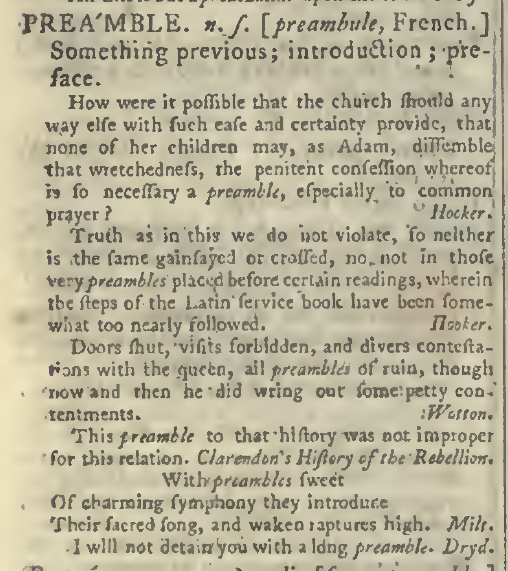
Preamble s. — 1756
Something previous; introduction; preface.
Preamble s. — 1785
Something previous; introduction; preface.
(K. Notes: It must be noted, better sooner, than later; that The Preamble content grants absolutely no power to government. However, many a politician will quote a clause from the Preamble to try to justify why they passed a certain law. The Preamble, by definition, is simply a statement of purpose or introduction for The Constitution of the United States of America. If the powers granted seem not to carry out any of these Preamble Elements, or The Declarations statement of purpose for government (that to secure these rights, governments are instituted); that constitutional clause may well violate This Constitution.
We the People of the United States, in Order to form a more perfect Union, establish Justice, insure domestic Tranquility, provide for the common defence, promote the general Welfare, and secure the Blessings of Liberty to ourselves and our Posterity, do ordain and establish this Constitution of the United States of America.
(K. Notes: We the People of the United States,
These People are the same people that The Declaration refers to as the governed. They are responsible for repaying only the Constitutionally authorized debt that the government officers created on the governed peoples' behalf.
Article 1, Section 8, Clause 1, states; "The Congress shall have Power To lay and collect Taxes, Duties, Imposts and Excises, to pay the Debts and provide for the common Defence and general Welfare of the United States; but all Duties, Imposts and Excises shall be uniform throughout the United States;"
In order for the nation's government level to pay its Constitutionally authorized Debts and provide for the common Defence and general Welfare of the United States Congress is granted the power to collect Taxes, Duties, Imposts and Excises. And as we see later, "uniform" must refer to the same percentage as opposed to a dollar value.
in Order to form a more perfect Union,
A person might claim that the previous union, under The Articles of Confederation was perfect. In order to make this one more perfect, the previous one must have been perfect. So, let's play perfect word games from 1756 and 1785.
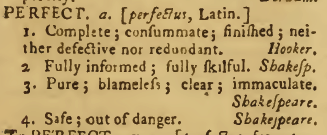
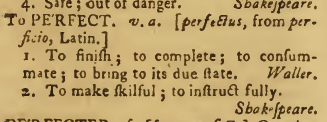
Perfect a. — 1756
1. Complete; consummate; finished; neither defective nor redundant.
2. Fully informed; fully skilful.
3. Pure; blameless; clear; immaculate.
4. Safe; out of danger.
To Perfect v. a. — 1756
1. To finish; to complete; to consummate; to bring to its due state.
2. To make skillful; to instruct fully.
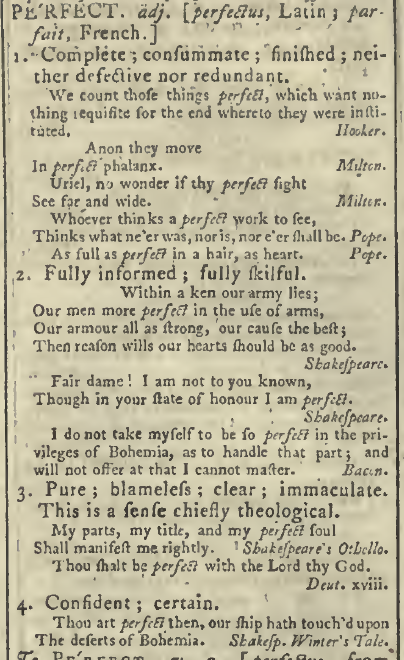
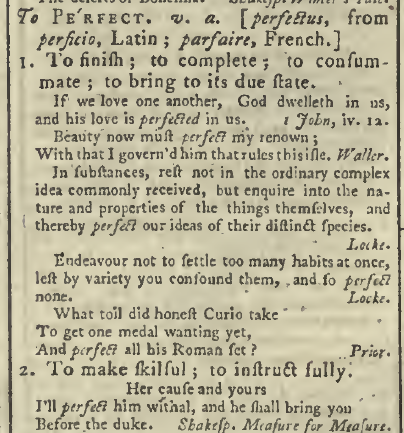
Perfect adj. — 1785
1. Complete; consummate; finished; neither defective nor redundant.
2. Fully informed; fully skilful.
3. Pure; blameless; clear; immaculate.
4. Confident; certain.
To Perfect v. a. — 1785
1. To finish; to complete; to consummate; to bring to its due state.
2. To make skillful; to instruct fully.
This exercise is a great example of how the definitions for words change over time. Here, we see the difference between 1756 and the 1785; merely 29 years different.
The 1756 definition for Perfect. 4. Safe; out of danger; when we consider The Declaration's clause, that to secure these rights, governments are instituted among men, deriving their just powers from the consent of the governed. The 1785 Perfect 4. Confident; certain. This could also work with The Declaration's clause, just stated, in that of making certain that the people are confident and certain that their rights are secured.
The 1756 & 1785 definition 2. Fully informed; fully skillful; certainly do work as well. The Constitution is supposed to make the government officers fully informed about the limits to their duty; thus, making them fully skillful for the job to be done. It is supposed to make the citizens fully informed about how to recognize when government abuses its powers and violates the governed people's rights.
The safe; out of danger definition also applies, as the formation of the nation's government-level is to keep the states safe and out of danger, as well as to keep the peoples rights safe and out of danger. We get that idea about the people's rights, with Amendment 9; which essentially puts all of the people's other rights not listed in The Constitution off-limits for any government level to pass laws by any other name like ordinances, etc. to regulate, limit, infringe, or deny those rights, not listed.
Unfortunately, there is some confusion as to whom is ultimately responsible for enforcing the terms of The Constitution on the government officers. Sure, as we proceed through The Constitution, we see various internal checks & balances between the three branches, as well as the various government levels. Impeachments and removal from office, veto-power, etc. are checks between the branches. The Article 5 amendment process is a check from the smaller (states) against the nation's government level, which also applies to all government levels, as they all swear or affirm to support and defend This Constitution.
They are not saying that The Constitution is perfect. If they even remotely thought it was, Article 5, the amendment process would not have been included; as there would be no need to amend a "perfect" document. But of course; it could be that it is the amendment process that perfects the document and balances the powers.
To establish Justice,
(K. Notes: As with The unanimous Declaration of the thirteen united States of America, I will error on the side of too many definitions. As definitions change over years; what we assume a word means today may not have been what it meant two hundred years ago.
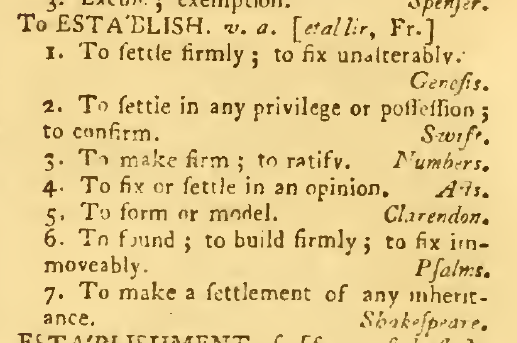
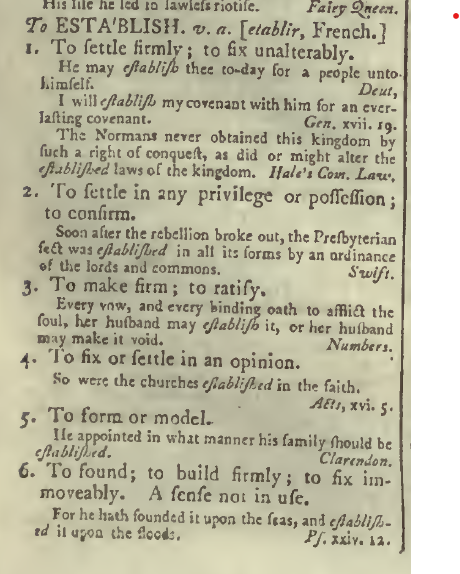

To Establish v. a. — 1756
1. To settle firmly; to fix unalterably.
2. To settle in any privilege or possession; to confirm.
3. To make firm; to ratify.
4. To fix or settle in an opinion.
5. To form or model.
To Establish v. a. — 1785
1. To settle firmly; to fix unalterably.
2. To settle in any privilege or possession; to confirm.
3. To make firm; to ratify.
4. To fix or settle in an opinion.
5. To form or model.
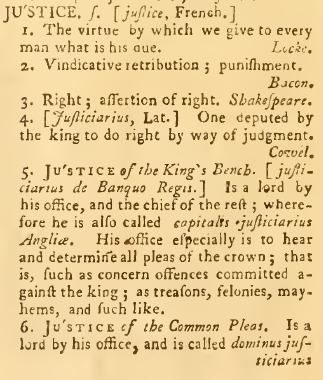
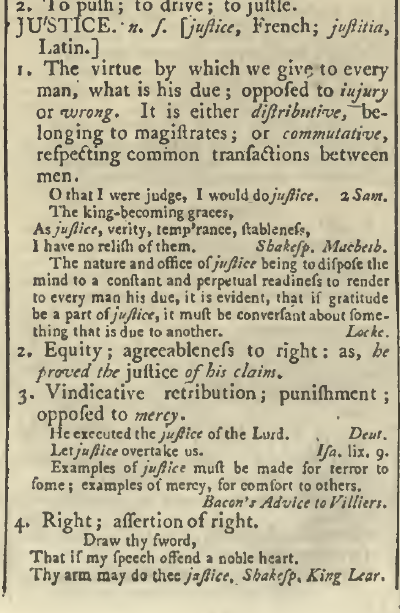
Justice s. — 1756
1. The virtue by which we give every man what is his due.
2. Vindicative retribution; punishment.
3. Right; assertion of right.
(K. Note. The remaining of the 9 definitions detail different types of Justices.)
Justice n. s. — 1785
1. The virtue by which we give every man what is his due; opposed to injury or wrong.
2. Equity; agreeableness to right: as, be proved the justice of his claim.
3. Vindicative retribution; punishment; opposed to mercy.
4. Right; assertion of right.
(K. Note. The remaining of the 13 definitions detail different types of Justices.)
Most of the definitions from 1756 and 1785 are much the same. There often are some variations, as with the previous definitions.
Justice. Common to 1756 & 1785 1. The virtue by which we give to every man what is his due. Then, the 1785 dictionary adds more to this definition; ...opposed to injury or wrong. It is either distributive, belonging to magistrates; or commutative respecting common transaction between men.
What we see in the definitions, the establish justice does not just apply to those who violate constitutionally approved laws. Later, in Article 6, it makes it necessary for any law to be honorably enforced. Every law, or part thereof must have constitutional authority or it has no standing. It is not to be enforced. This Constitution, also being part of a law, The Supreme Law of the Land; must be equally enforced against government officers who violate it. For there is no justice when the government is not forced to work within the limitations we place over it.
See also notes at end of domestic tranquility
To insure domestic Tranquility,
(K. Notes: This is one of those instances where the actual word insure does not appear in either the 1756, 1768, or the 1785 dictionary sets. In this instance, the spelling ensure seem to convey by definition the context meaning of this phrase, insure domestic Tranquility.


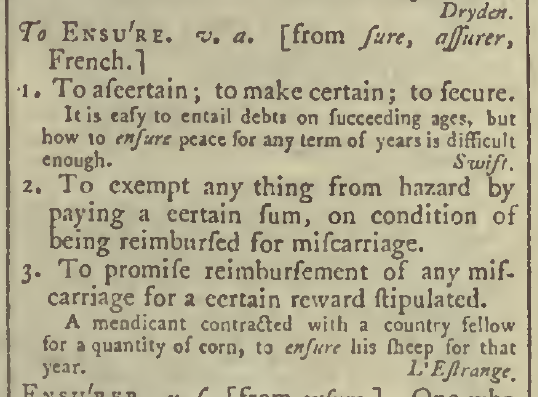
To Ensure v. a. — 1756
1. To ascertain; to make certain; to secure.
2. To exempt any thing from hazard by paying a certain sum, on condition of being reimbursed for miscarriage.
3. To promise reimbursement of any miscarriage for a certain reward stipulated.
To Ensure v. a. — 1785
1. To ascertain; to make certain; to secure.
2. To exempt any thing from hazard by paying a certain sum, on condition of being reimbursed for miscarriage.
3. To promise reimbursement of any miscarriage for a certain reward stipulated.
The Constitutional usage-context certainly suggests a guarantee of Domestic Tranquility.
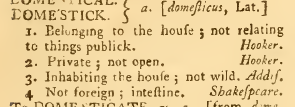
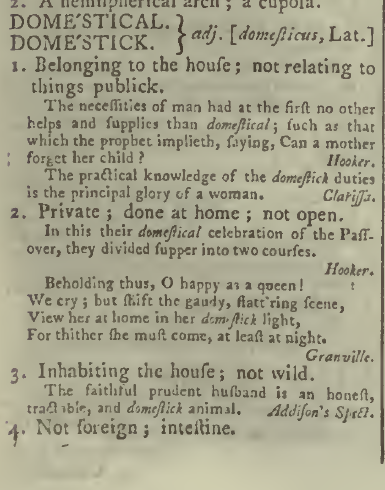
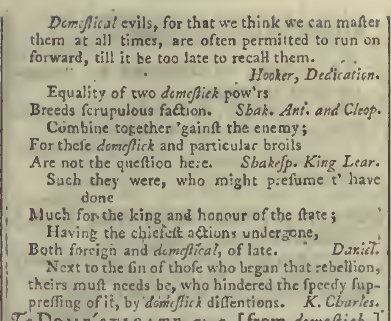
Domestick a. — 1756
1. Belonging to the house; not relating to things publick.
2. Private; not open.
4. Not foreign; intestine.
Domestick adj. — 1785
1. Belonging to the house; not relating to things publick.
2. Private; done at home; not open.
4. Not foreign; intestine.

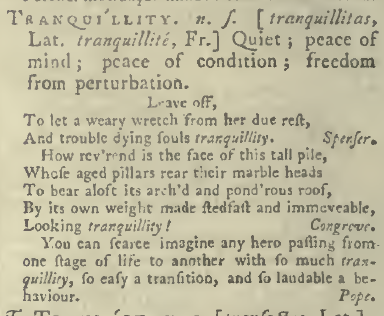
Tranquility s. — 1756
Quiet; peace of mind; peace of condition; freedom from perturbation.
Tranquility n. s. — 1785
Quiet; peace of mind; peace of condition; freedom from perturbation.



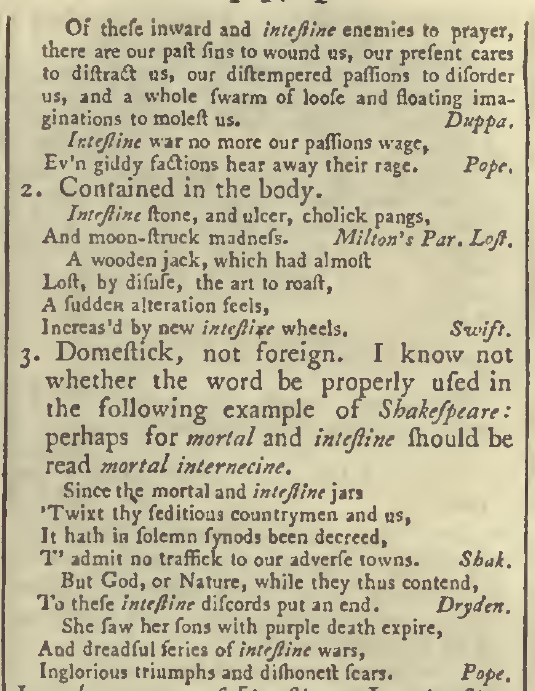
Intestine a. — 1756
1. Internal; inward; not external.
2. Contained in the body.
3. Domestick, not foreign.
Intestine adj. — 1785
1. Internal; inward; not external.
2. Contained in the body.
3. Domestick, not foreign.
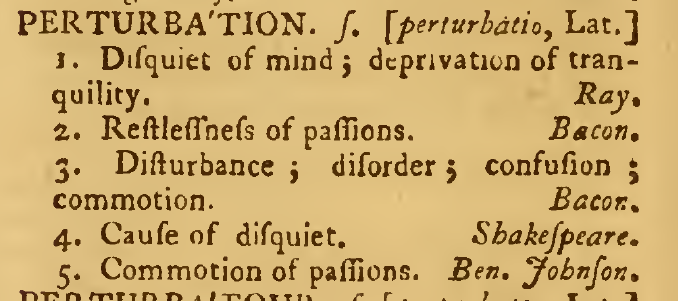
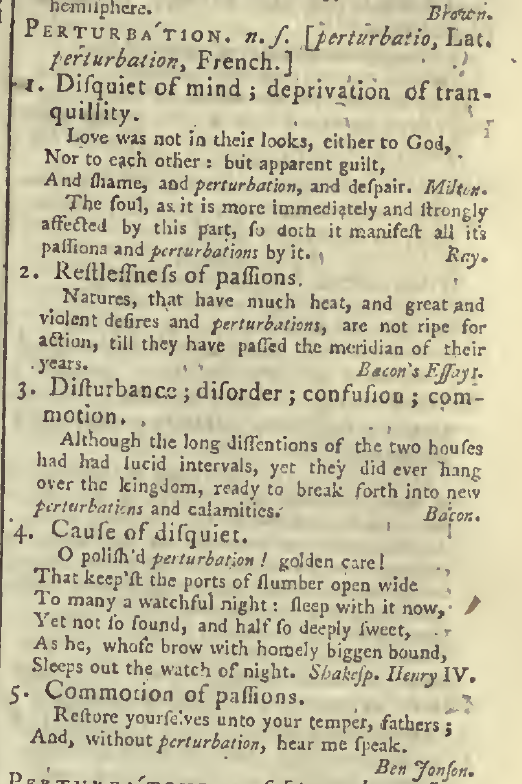
Perturbation s. — 1756
1. Disquiet of mind; deprivation of tranquility.
2. Restlessness of passions.
3. Disturbance; disorder; confusion; commotion.
4. Cause of disquiet.
5. Commotion of passions.
Perturbation n. s. — 1785
1. Disquiet of mind; deprivation of tranquility.
2. Restlessness of passions.
3. Disturbance; disorder; confusion; commotion.
4. Cause of disquiet.
5. Commotion of passions.
With domestick, keeping in context that we are dealing with the nation's government-level; as well as this grievance that identifies tyranny and despotism: declaring themselves invested with power to legislate for us in all cases whatsoever; we can be certain that this is not granting to government any power to control what either you or I do in our respective homes.
This deals with Definition #4, Not foreign; intestine.
The intestine definitions clarify that these would be powers respective to each political geographical jurisdiction. Doing what is within actual granted powers so that the people-generally can rest easy.
Domestick Tranquility is provided for within power-grants to government:
Article 4, Section 3, Clause 2; "A Person charged in any State with Treason, Felony, or other Crime, who shall flee from Justice, and be found in another State, shall on Demand of the executive Authority of the State from which he fled, be delivered up, to be removed to the State having Jurisdiction of the Crime."
Amendments 4, 5, 6, 8, & 13, dealing with proper procedures in criminal prosecutions; attempts to protect the accused person's rights against unjust government actions.
To provide for the common defence,
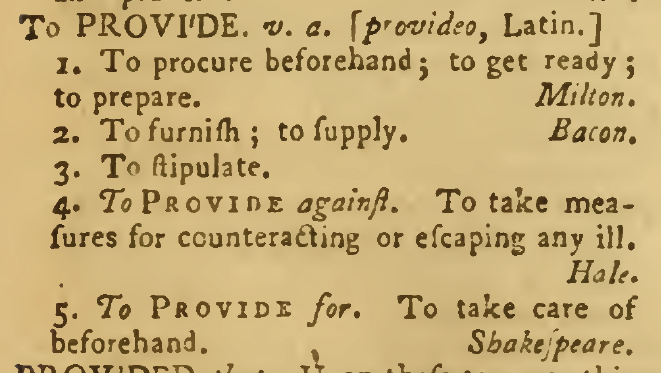
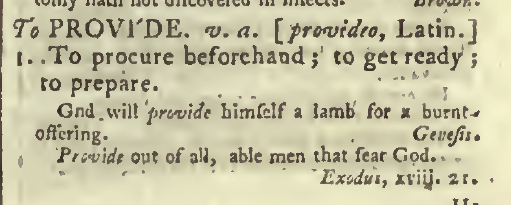
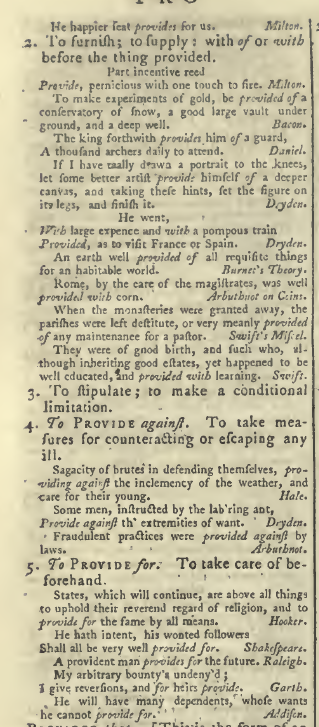
To Provide v. a. — 1756
5. To Provide for. To take care of beforehand.
To Provide - 1785
5. To Provide for. To take care of beforehand.
We see the provisions made for this element in Article 1, Section 8, Clauses 12 - 16; all of which grant to Congress the power to "raise and support armies...", "provide and maintain a navy", ."...Regulations for the land and naval Force", "provide for calling forth the Militia", "provide for organizing, arming, and disciplining the militia..."
Also in Article 2, Section 2, "The President shall be Commander in Chief of the Army and Navy of the United States, and of the Militia of the several States, when called into the actual Service of the United States".
Then in Amendment 2, "A well regulated Militia, being necessary to the security of a free State, the right of the people to keep and bear Arms, shall not be infringed."
To promote the general Welfare,

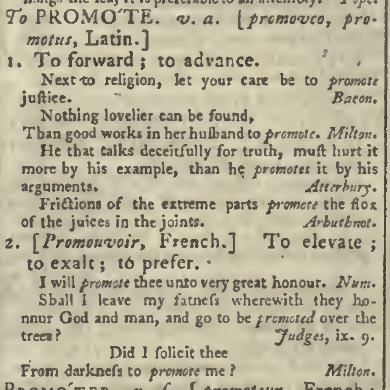
To Promote v. a. — 1756
1. To forward; to advance.
2. To elevate; to exalt; to prefer.
To Promote v. a. — 1785
1. To forward; to advance.
2. To elevate; to exalt; to prefer.
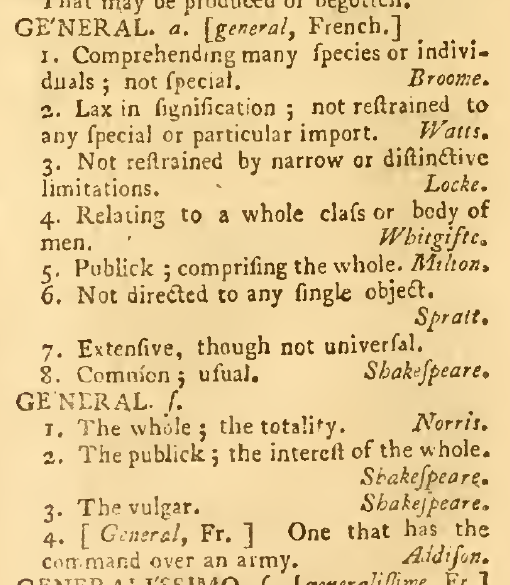

General a. / s. — 1756
a.1. Comprehending many species of individuals; not special.
a.4. Relating to a whole class or body of men.
a.5. Publick; comprising the whole.
a.7. Extensive, though not universal.
s.1. The whole; the totality.
s.2 The publick; the interest of the whole.
General adj. / n. s. — 1785
adj.1. Comprehending many species of individuals; not special; not particular.
adj.4. Relating to a whole class or body of men.
adj.5. Publick; comprising the whole.
adj.8. Extensive, though not universal.
n.s.1. The whole; the totality; the main, without insisting on particulars.
n.s.2 The publick; the interest of the whole.

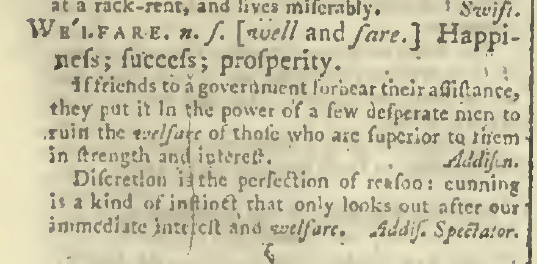
Welfares. — 1756
Happiness; success; prosperity.
Welfare n. s. — 1785
Happiness; success; prosperity.
When it comes the happiness, success, and prosperity; government is supposed to promote, to elevate, to advance, and to prefer the public as a whole as opposed to any individual, corporation, or small sections of the population. This would prohibit corporate bail-outs, individual welfare programs, affirmative action legislation to overly-favor a once trodden sector of population.
Presently, The Constitution addresses the general welfare clause in at least a couple locations: Amendment 9, and all the rights not listed in The Constitution; Amendmnent 14, the equal protection of the law.
Unfortunately, a particular clause in Article 1, Section 1, Clause 3; unethically and in violation of the purpose and Preamble to This Constitution allowed government to devalue certain classes of people. This also violates The Declaration's primary purpose in that stating these self-evident truths —that all men are created equal in that they all possess the same list of rights.
and secure the Blessings of Liberty to ourselves and our Posterity,

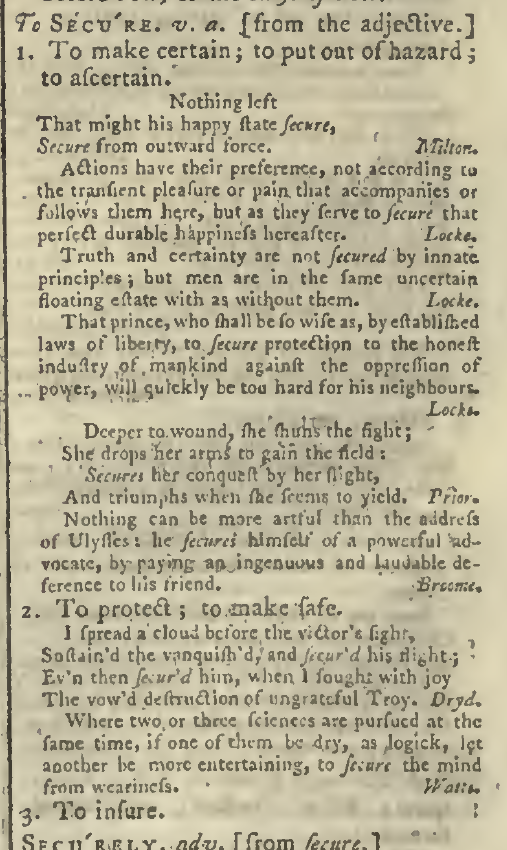
To Secure v. a. — 1756
1. To make certain; to put out of hazard; to ascertain.
2. To protect; to make safe.
To Secure v. a. — 1785
1. To make certain; to put out of hazard; to ascertain.
2. To protect; to make safe.

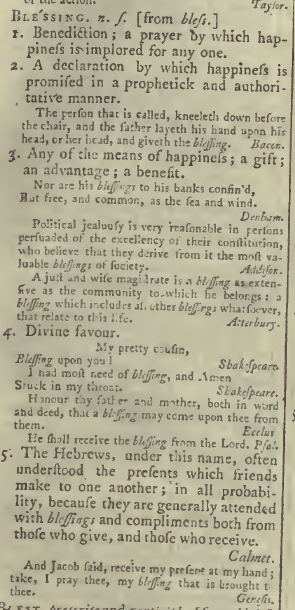
Blessings s. — 1756
2. The means of happiness.
Blessings n. s. — 1785
3. Any of the means of happiness; a gift; an advantage; a benefit.
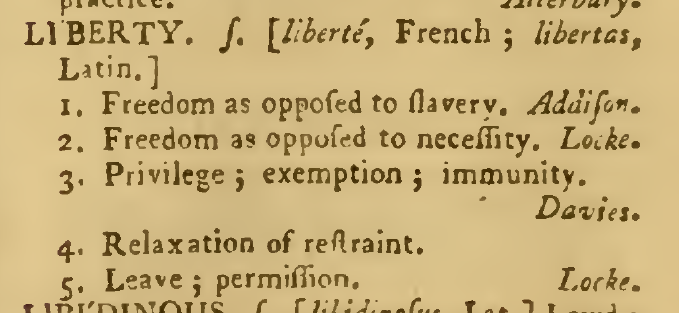
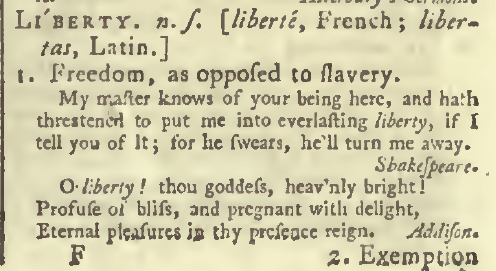
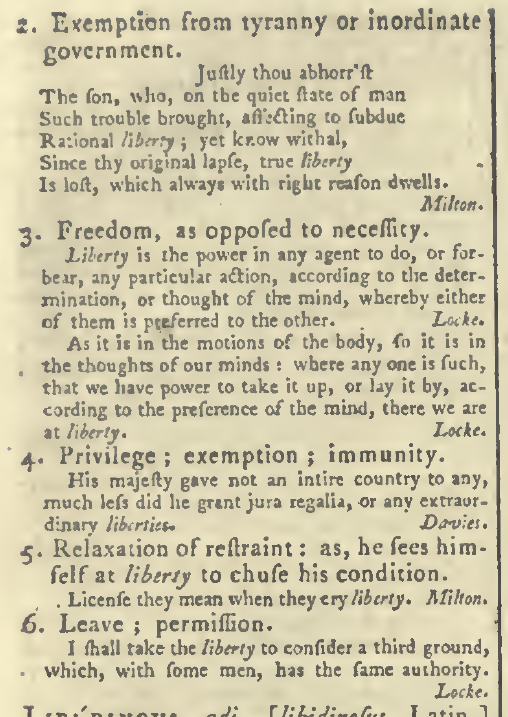
Liberty s. — 1756
1. Freedom as opposed to slavery.
2. Freedom as opposed to necessity.
3. Privilege; exemption; immunity.
4. Relaxation of restraint.
Liberty n. s. — 1785
1. Freedom as opposed to slavery.
2. Exemption from tyranny or inordinate government.
3. Freedom as opposed to necessity.
4. Privilege; exemption; immunity.
5. Relaxation of restraint: as, he sees himself at liberty to chuse his condition.
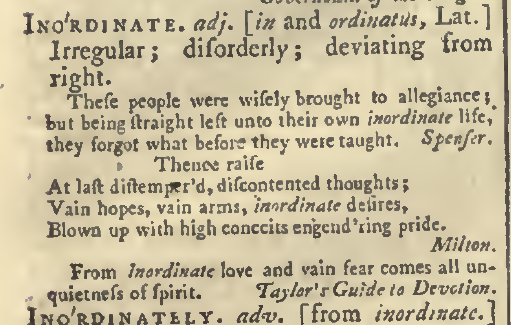
Inordinate adj. — 1785
Irregular; disorderly; deviating from right.

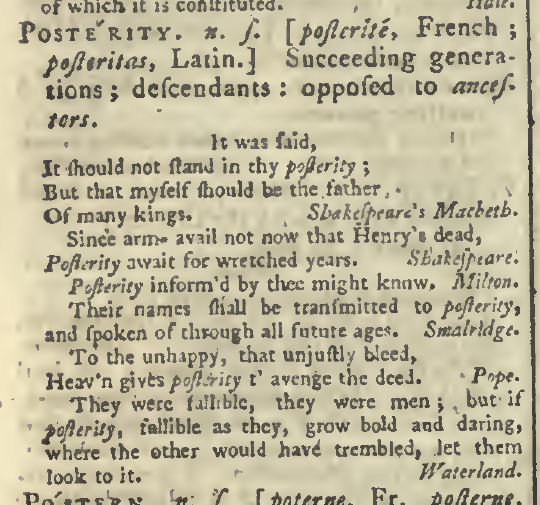
Posterity s. — 1756
Succeeding generations; descendants.
Posterity n.s. — 1785
Succeeding generations; descendants: opposed to ancestors.
What we learn with these definitions is that To secure is simply to protect or to make safe the blessings or any of the means of happiness of liberty being the free of tyranny or inordinate (or unconstitutional acts of) government; not only for ourselves but for future generations.
This Constitution's Article 5 is the means by which to correct the government's powers and stop the political abuses against our rights.
do ordain and establish this Constitution for the United States of America
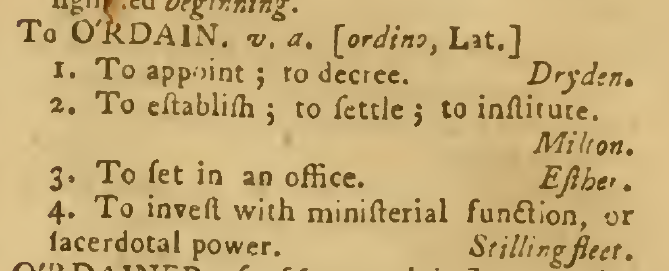
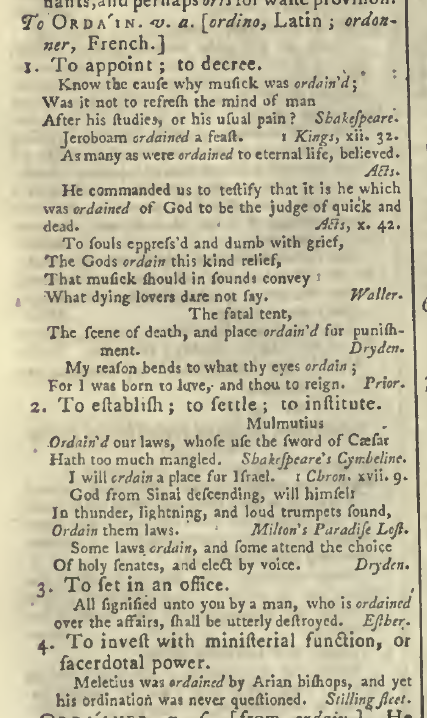
To Ordain v. a. — 1756
2. To establish; to settle; to institute.
To Ordain v. a. — 1785
2. To establish; to settle; to institute.
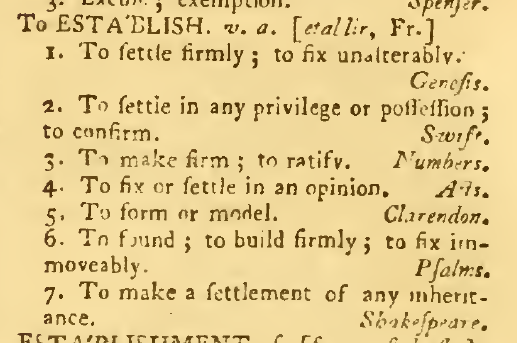


To Establish v. a. — 1756
1. To settle firmly; to fix unalterably.
3. To make firm; to ratify.
5. To form or model.
6. To found; to build firmly; to fix immoveably.
To Establish v. a. — 1785
1. To settle firmly; to fix unalterably.
3. To make firm; to ratify.
5. To form or model.
6. To found; to build firmly; to fix immoveably. A sense not in use.
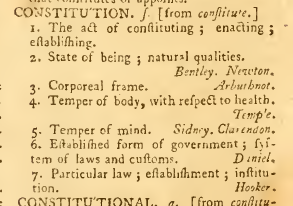
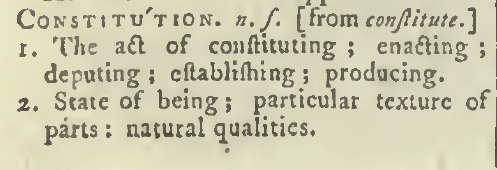
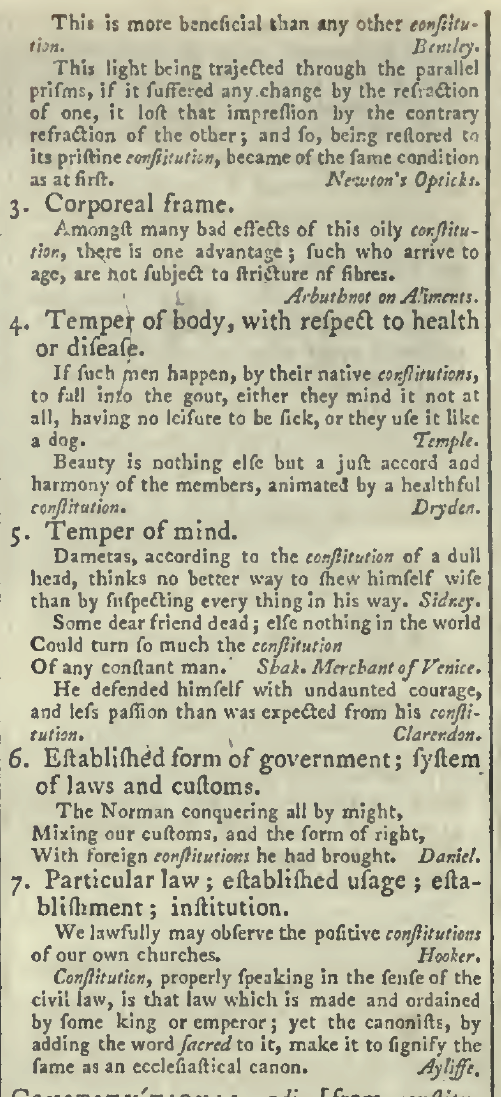
Constitution s. — 1756
1. The act of constituting; enacting; establishing.
3. Corporeal frame.
6. Established form of government; system of laws and customs.
7. Particular law; establishment; institution.
Constitution n. s. — 1785
1. The act of constituting; enacting; deputing; establishing; producing.
3. Corporeal frame.
6. Established form of government; system of laws and customs.
7. Particular law; established usage; establishment; institution.

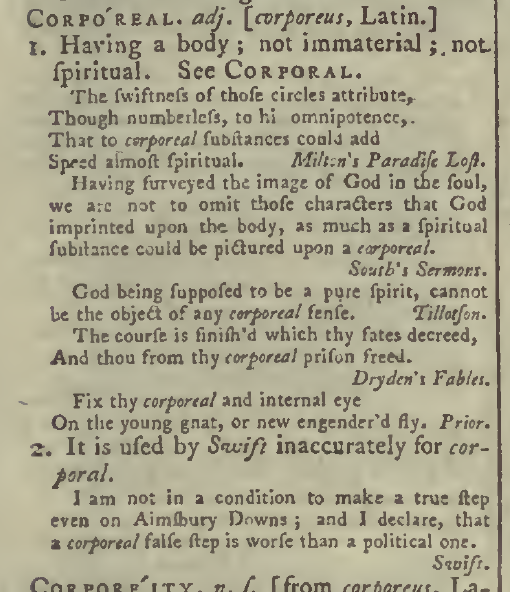
Corporeal a. — 1756
Having a body; not immaterial.
Corporeal adj. — 1785
Having a body; not immaterial. See CORPOREAL.
We the People of the United States [...] do ordain and establish this Constitution for the United States of America.
The people of the union of States ratified the constitution, creating the real government form for our nation. The form is not unalterable; as seen with Article 5, the Amendment Article.
This Constitution has the effective power to nullify and make void, certain parts of the several State Constitutions, as the states have unanimously, (in 1790 with the thirteenth of thirteen states ratifying it) made it superior to the State Constitutions and all other laws, as seen in Article 6.
We know from The Declaration of 1776 — that the governed people hold two positions. As a unified body, at the polling stations, the majority of the total number of registered voters possess the lawful and contractual power to control the government powers for their respective government level. As individuals, they are subject-to the just powers granted to government, in accord with The Declaration, by the respective body or resident-citizens therein.
The concept of the governed people and their being subject to the jurisdiction thereof, is important in properly comprehending Amendment 14, especially where it details who is or can become a citizen.
the United States of America v. "The United States of America" v. the united States of America. The nation's identifying mark v. The governments name.
The unanimous Declaration of the thirteen united States of America refers to the union of states, which is the nation on the American continent. This organizes those people getting together for the purpose they declare in this Founding Charter.
The Articles of Confederation, is the first set of By-Laws created as a control mechanism over the fictitious entity they are creating. The Government and its form. They named that created entity, "The United States of America". This is the government, which, by definition, as seen in dissecting The unanimous Declaration of the thirteen united States of America; Corporations are a form of government and Governments are a form of Corporation. Here, referring to the body of states as, the several states. It also refers to the nation's property as the property of the united states; while referring to the property of individual states as either of them in Article 4, Paragraph 1, "provided also that no imposition, duties or restriction shall be laid by any state, on the property of the united states, or either of them."
Then, along comes The Constitution of the United States of America.
Section 1.
All legislative Powers herein granted shall be vested in a Congress of the United States, which shall consist of a Senate and House of Representatives.
(K. Notes: All legislative Powers herein granted...
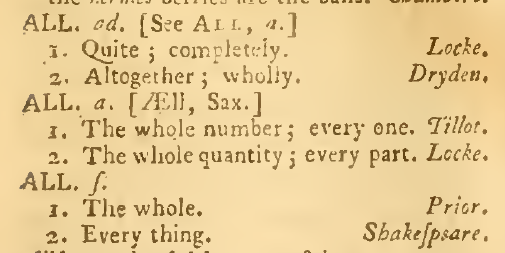


All ad. / a. / s. — 1756
ad.1. Quite; completely.
ad.2. Altogether; wholly.
a.1. The whole number; every one.
a.2. The whole quantity; every part.
s.1. The whole.
s.2. Every thing.
All adj. / adv. / n. s. — 1785
adj.1. Being the whole number; every one.
adj.2. Being the whole quantity; every part.
adv.1. Quite; completely.
adv.2. Altogether; wholly.
n.s.1. The whole; opposed to part, or nothing.
n.s.2. Every thing.


Legislative a. — 1756
Giving laws; lawgiving.
Legislative adj. — 1785
Giving laws; lawgiving.
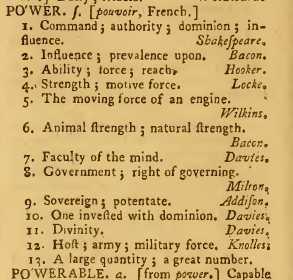
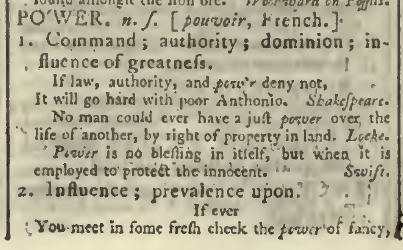

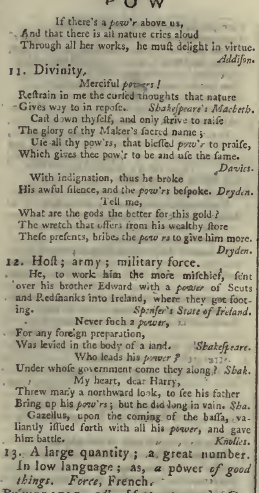
Power s. — 1756
1. Command; authority; dominion; influence.
8. Government; right of governing.
10. One invested with dominion.
Power n. s. — 1785
1. Command; authority; dominion; influence of greatness.
8. Government; right of governing: correlative to subjection.
10. One invested with dominion.


Herein ad. — 1756
In this.
Herein adv. — 1785
In this.
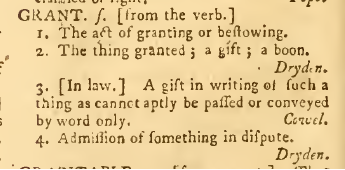
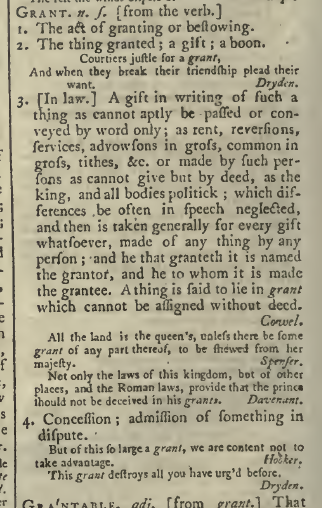
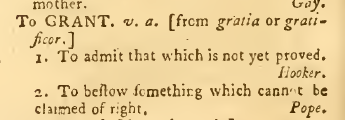
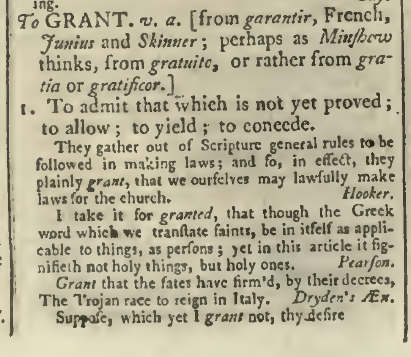
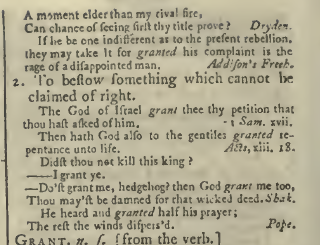
Grant s. — 1756
1. The act of granting or bestowing.
3. [In law.] A gift in writing of such a thing as cannot aptly be passed or conveyed by word only.
Grant n. s. — 1785
1. The act of granting or bestowing.
3. [In law.] A gift in writing of such a thing as cannot aptly be passed or conveyed by word only; [...] or made by such persons as cannot give but by deed, as the king, and all bodies politick; [...] and he that granteth it is named grantor, and he to whom it is made the grantee. [...]
To Grant v. a. — 1756
2. To bestow something which cannot be claimed of right.
To Grant v .a. — 1785
2. To bestow something which cannot be claimed of right.
When would a phrase such as; "All legislative Powers herein granted shall be vested in a Congress[...]" not actually mean just the "Congress of the United States"?
It happens when we know what is about to follow in This Constitution. The two point are key:
• This Constitution, Article 6, Paragraphs 2 & 3.
This Constitution, and the Laws of the United States which shall be made in Pursuance thereof; and all Treaties made, or which shall be made, under the Authority of the United States, shall be the supreme Law of the Land; and the Judges in every State shall be bound thereby, any Thing in the Constitution or Laws of any State to the Contrary notwithstanding.
The Senators and Representatives before mentioned, and the Members of the several State Legislatures, and all executive and judicial Officers, both of the United States and of the several States, shall be bound by Oath or Affirmation, to support this Constitution; but no religious Test shall ever be required as a Qualification to any Office or public Trust under the United States.
Article 6 demands that all legislative bodies (among other government officer) to support This Constitution; and that all laws be made in pursuance of This Constitution.
• This Constitution, Amendments 9 & 10.
Amendment IX: The enumeration in the Constitution, of certain rights, shall not be construed to deny or disparage others retained by the people.
Amendment X: The powers not delegated to the United States by the Constitution, nor prohibited by it to the States, are reserved to the States respectively, or to the people.
At this point; Amendment 9 may limit some of the legislative powers already granted to Congress, especially if those powers work to deny or disparage any of those other rights not listed in This Constitution. Then, Amendment 10 authorizes the State government (in this instance legislators) to exercise some of the powers granted to Congress, so long as those powers are not specifically restricted to Congress only.
With, "All legislative Powers herein granted shall be vested in a Congress of the United States[...]" too many people make two, two incorrect assumptions:
• First, is that Congress can legislate in any manner that Congress "thinks" is in the best interest of the people.
• Second, is that all those legislative powers not granted in The Constitution may be exercised by any of the other branches or government levels; including Congress. After all, it does seem to only refer to the "legislative power herein granted"; right?
We know that both assumptions are incorrect because of this phrase in The unanimous Declaration of the thirteen united States of America: "Governments are instituted among Men, deriving their just powers from the consent of the governed".
We also know that both assumptions are incorrect because of the definitions for "grant" or "to grant", as this refers to that which cannot be claimed of right.
Since, in Article 6, also later in this Constitution, we see that all government branches and levels are required to swear oath to support and defend This Constitution. None of the other government branches or levels may rightly exercise any legislative powers not specifically granted within (herein) this Constitution. Only powers specifically restricted to the nation's level of government are prohibited for any other branch or government level to exercise. Otherwise, the other legislative levels may pass or enforce equal to or less burdensome laws authorized by this Constitution that are not expressly limited to Congress.
The people have retained the right to sleep; as we see that it is not enumerated within The Constitution to allow government to regulate. Yet, many a city and town pass laws that regulate where and or when a person can or cannot sleep. With this, those cities and towns violate Amendment 9 by denying or disparaging our right to sleep. However, if someone visits your house or your business, you can tell them to not sleep in your house or business; but you cannot rightly request that government prohibit people from sleeping in public places (that is places supported by tax dollars), until This Constitution is amended to allow government to regulate where and when you can or cannot sleep.
Additionally, with Amendment 9, the protection of all other rights not listed in The Constitution; Amendment 9 makes it a high crime and treason (waging a political war against the citizens; 1756 and 1785 definitions for the use of War as it appears in Article 3 section 3 - later) to violate any right not listed in the Constitution. And for clarity, government possesses the power to punish people the unjust exercise of a right; when its exercise unjustly violates other people's rights. Thus, not violating the person's right to do something; but punishing them and holding them accountable for the damage they cause to others.
To summarize: if the power is not granted by way of This Constitution, it is a crime (Articles 3 & 6) to exercise that political power. The Declaration also makes the charges of Tyranny and Despotism against any government officer exercising any power not granted.
Section 2.
The House of Representatives shall be composed of Members chosen every second Year by the People of the several States, and the Electors in each State shall have the Qualifications requisite for Electors of the most numerous Branch of the State Legislature.
(K. Notes: the Electors in each State
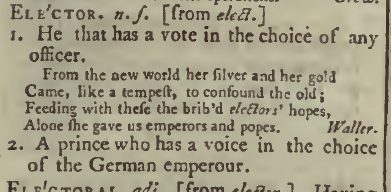
Elector n. s. — 1785
1. He that has a vote in the choice of any officer.
A registered voter is an elector for their respective House, and now Senate members of Congress. This would mean that whatever the (State Charters dictate) a the qualifications to vote for the most numerous Branch of that State's Legislature; those are the qualification to vote for their House, and now Senate members of Congress. But what the (State Charters dictate) is not entirely true. Aside from government prohibitions being stopped with Amendments #15 (race, color, servitude); #19 (sex); #26 (age): All three amendments prohibit the States from denying or abridging the rights of eligible citizens their right to vote based on those conditions mentioned.
As for the (State Charters dictate), this is incorrect. It is The Declaration that is the lawful contract that dictates the eligibility of voters, once the states joined to form the nation. At that time in 1776, with The Declaration, a lot of political activity that Colonial political leaders did was supposed to end; but unfortunately did not. Some of it still continues to this day.
Oddly enough, no person has been able to show, where, in This Constitution it authorizes government to deny, disparage, or otherwise grant to or violate the right of any Declarationally eligible citizen their right to vote.
Better yet: since we are dealing with Corporate Contract Charters; no one has proved where The Declaration prohibits anyone from voting who is first of all a citizen and secondly, a tax-paying citizen. The Declaration does indicate only ONE class of citizen prohibited from voting. It is the top of the very last page that starts with "We, therefore, the Representatives of the United States of America [...] do, in the Name, and by Authority of the good People[...] solemnly publish and declare [etc.]"
That means that only those citizens, and citizen-taxpayers who are duly convicted of a crime; as required by Amendment 13; can be prohibited from voting. Once their sentence is fully served; only then, will they have automatically earned their right to vote. Once duly convicted, they lose the right to vote again (etc).
No Person shall be a Representative who shall not have attained to the Age of twenty five Years, and been seven Years a Citizen of the United States, and who shall not, when elected, be an Inhabitant of that State in which he shall be chosen.
(K. Notes: I still find myself rereading this Qualifications Clause for member of The House of Representatives for Congress of "The United States of America". This one seems a little more double-talk than the one for President.
Article 2, Section 1, Paragraph 5: "No Person except a natural born Citizen, or a Citizen of the United States, at the time of the Adoption of this Constitution, shall be eligible to the Office of President; neither shall any Person be eligible to that Office who shall not have attained to the Age of thirty five Years, and been fourteen Years a Resident within the United States."
In both; we have age, national citizenship years, and place of residency years. Just that the numbers and or places differ, as stated.
There are three qualifications listed here, for members of The House of Representatives in Congress:
• Age; 25 or older;
• National-Citizenship; 7 years or longer;
• State citizen-residency; who shall not, when elected, be an Inhabitant of that State in which he shall be chosen.??
No person shall be a Representative
[and then the three items listed as qualifications or exclusions] who shall not have attained to the Age of twenty five Years, and been seven Years a Citizen of the United States, and who shall not, when elected, be an Inhabitant of that State in which he shall be chosen.
• #1 • No person shall be a Representative [break] who shall not have attained to the Age of twenty five Years [missing the other two elements] when elected, (comma separating the elements of the list) Here, the double-negative makes sense, in that the person actually must be at least 25 years of age.
• #2a • No person shall be a Representative [missing first requirement with 2nd negative] been seven Years a Citizen of the United States [...] when elected, (comma separating the elements of the list) This version claims that you cannot be a Representative if you have been "seven Years a Citizen of the United States" when elected; but it reads choppy when read as written without the first qualification that has thge 2nd negative.
• #2b • and then; No person shall be a Representative [break] who shall not have [keeping the 2nd negative but missing first qualification] been seven Years a Citizen of the United States [...] when elected, (comma separating the elements of the list)However, in this version, with it being part of the 2nd-negative, the person must have been at least "seven Years a Citizen of the United States" when both of these qualification are connected with the 2nd negative; and it reads a lot smoother.
• #3a • and; No person shall be a Representative [break] who shall not have [missing first and second qualifications], who shall not, when elected, be an Inhabitant of that State in which he shall be chosen. This version creates a triple-negative or an ending positive, which would mean; the person "shall not, when elected, be an Inhabitant of that State in which he shall be chosen"; but also reads choppy.
• #3b • and, on the other hand; No person shall be a Representative [missing the 2nd negative and missing the first two qualifications], who shall not, when elected, be an Inhabitant of that State in which he shall be chosen. Here, the person must be a resident-citizen of the state in which they are chosen.
The second negative has three elements, separated by a commas. Then there is another negative attached after the second negative (a 3rd negative) all separated by commas. This would make the 3rd negative double-negative of the 2nd, but a triple of the 1st; making the 3rd negative an actual positive.
1st Neg. "No person shall be"...
2nd Neg. "who shall not have"...
3rd Neg. "who shall not, when elected, be"...
This is one of the examples of politicians starting to make a simple language more complicated than necessary to get the needed points across. To bad they did not come back and correct this, especially after they wrote Article 2 for The Presidency. Since they did not come back and correct the 3rd negative; whether we like it today or not; as written with the 3rd negative, when elected, the person must not be an inhabitant of the state for which they are chosen.
[Representatives and direct Taxes shall be apportioned among the several States which may be included within this Union, according to their respective Numbers, which shall be determined by adding to the whole Number of free Persons, including those bound to Service for a Term of Years, and excluding Indians not taxed, three fifths of all other Persons] (go to: Article 1, Section 8, Clause #1; Amendment 14, Section 2; and Amendment 16). The actual Enumeration shall be made within three Years after the first Meeting of the Congress of the United States, and within every subsequent Term of ten Years, in such Manner as they shall by Law direct. The Number of Representatives shall not exceed one for every thirty Thousand, but each State shall have at Least one Representative; and until such enumeration shall be made, the State of New Hampshire shall be entitled to chuse three, Massachusetts eight, Rhode-Island and Providence Plantations one, Connecticut five, New-York six, New Jersey four, Pennsylvania eight, Delaware one, Maryland six, Virginia ten, North Carolina five, South Carolina five, and Georgia three.
(K. Notes: [Representatives and direct Taxes shall be apportioned among the several States which may be included within this Union, according to their respective Numbers, which shall be determined by adding to the whole Number of free Persons, including those bound to Service for a Term of Years, and excluding Indians not taxed, three fifths of all other Persons] (go to: Article 1, Section 9, Clause #3; Amendment 14, Section 2; and Amendment 16)
This portion, has been amended; according to some, at least once; others, twice; myself, I claim that three later constitutional elements alter the content in the above paragraph (as noted in parenthesis above). 1. Capitation or other direct tax; 2. The actual counting for the representative numbers (enumeration); 3. Direct taxation (income tax).
Many people claim that this section was amended only by Amendment 14, Section 2. because of ENUMERATION changes. Where this part of Article one includes the three-fifths of all other persons clause; Amendment 14 has dropped it. We see that this section in Article 1, Section 2 also includes direct taxes and the apportionment thereof, which is also altered by later content in the other two locations mentioned.
Article 1, Section 9, Clause #3, states: "[No Capitation, or other direct, Tax shall be laid, unless in Proportion to the Census or enumeration herein before directed to be taken.]" This strictly tell us that any capitation or direct tax must be done in accord with the enumeration which was granted earlier, in the constitutional section now under discussion.
Amendment 16 states, "The Congress shall have power to lay and collect taxes on incomes, from whatever source derived, without apportionment among the several States, and without regard to any census or enumeration." This, a direct tax. It directly taxes individuals and corporations on their incomes, and need not be apportioned among and paid by the respective states. We get into more detail about the constitutionality of the application of the Income Tax Code at Amendment 16, later with Stop the Unconstitutional Wage Tax and Equality With Income Tax.
The actual Enumeration shall be made within three Years after the first Meeting of the Congress of the United States, and within every subsequent Term of ten Years, in such Manner as they [Congress] shall by Law direct.
What is an enumeration? Though dictionary definition are very similar to the Constitutional definition of what is an enumeration; The Constitutional definition and descriptive limitations are what apply.
Because the word Census is later used as a possible alternate to an Enumeration; let us look at the definitions for Census from 1768 and 1785, as well as 1828, and 1898.
Those details at Census Un-Constitutional?
We see the evolution of the word "census", stretching back into time before 1790 when this Article 1, Section 2, was ratified (with the entire Constitution) to go from censor to expand this constitutional internal ENUMERATION definition to become that of what a CENSUS is by definitions prior to 1790. Then, after Amendment 16 and the Income Tax is ratified, The Census definitions expand even more, to change The Constitution's word enumeration to that of census.
A Censor, a Census-Taker by 1768 definitions, makes record of every citizen's estate. Yet, no place in This Constitution has it authorized government such an extent of power. Not only does this government conduct a literal census they do so every year with the IRS tax forms, through which they gather your entire estate's value; thus, an annual census.
and until such enumeration shall be made[...]
This simply appoints how many members each State will have in The House, until such time as the first enumeration be taken.
When vacancies happen in the Representation from any State, the Executive Authority thereof shall issue Writs of Election to fill such Vacancies.
(K. Notes:
Simple enough. A vacancy in The House of Congress? The State Governor (Executive Officer) of the State from where the vacancy happens; orders an election to fill the vacancy.
The House of Representatives shall chuse their Speaker and other Officers; and shall have the sole Power of Impeachment.
(K. Notes: Nothing about this clause hints to the fact that The Speaker must belong to the political party that has the most seats in The House. But it is quite unfortunate that is exactly what has become the norm.
The House has the sole Power of Impeachment.
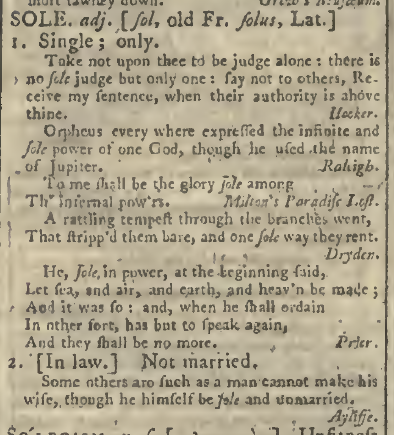
Sole adj. — 1785
1. Single; only.



Power n. s. — 1785
1. Command; authority; dominion; influence of greatness.
2. Influence; prevalence upon.
3. Government; right of governing: correlative to subjection.
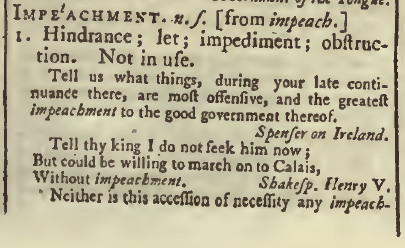
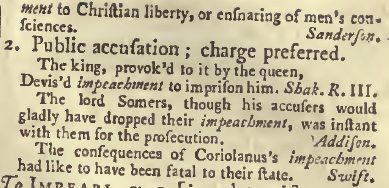
Impeachment n .s. — 1785
1. Hindrance; let; impediment; obstruction. Not in use.
2. Public accusation; charge preferred.
Impeachments are then, a two part trial. The House of Representatives being the investigation and prosecutors; where, as we see later, The Senate is the jury that decides whether or not there is a removal from office.
Section 3.
The Senate of the United States shall be composed of two Senators from each State, [chosen by the Legislature thereof] (go to: Amendment 17), for six Years; and each Senator shall have one Vote.
(K. Notes: With The Articles of Confederation, a single-house Congress; each State had only one vote. This favored the more-numerous, but smaller-populated States, which could almost always outnumber Largely populated state's votes.
The 2-house Congress with This Constitution, balanced the power between the more-numerous smaller states with that of the fewer but more-populated states.
If every Congressional Member honored their oath to The Constitution and Our nation's pledge, as written at the end of The unanimous Declaration of the thirteen united States of America; the One State - One Vote would be all that was needed in Congress. Apparently, that did not happen. Thus, the need to automatically balance power among the states.
The Senate was to favor the more-numerous but less-populated states; where every state has the same number of votes. The House was to favor the fewer but more-populated states by allowing for more votes based on population.
When changed by Amendment 17's clause, "The Senate of the United States shall be composed of two Senators from each State, elected by the people thereof [...], The entire Congress became a popularity contest and reverted back to a Single-House Congress; (that looks like a two-house Congress); this time, generally favoring the larger states.
The State governments lost control over The Senate, which was supposed to be the general overseer and protector for the general interests of the entire State and protect honorable State Powers. Now; both houses are a direct-popular vote election (though not yet in accord with the The Declaration's election, vote-counting terms of the Consent of the governed.
What tends to be missed by most is that fact that The Congress of "The United States of America" is supposed to be looking out for the best and general interest of the NATION as a whole; not political party power; not special interests; not lobbyists; etc. And if the Senate was not doing such to protect the states, each state could remove and replace as and when necessary.
Immediately after they shall be assembled in Consequence of the first Election, they shall be divided as equally as may be into three Classes. The Seats of the Senators of the first Class shall be vacated at the Expiration of the second Year, of the second Class at the Expiration of the fourth Year, and of the third Class at the Expiration of the sixth Year, so that one third may be chosen every second Year; [and if Vacancies happen by Resignation, or otherwise, during the Recess of the Legislature of any State, the Executive thereof may make temporary Appointments until the next Meeting of the Legislature, which shall then fill such Vacancies.] (go to: Amendment 17)
(K. Notes: This simply divides the total Senate body into thirds so that one third is elected every two years. Then, if any seat become vacant, it provides for the filling of that seat. Slightly altered by Amendmcnet 17, Paragraph 2.
No Person shall be a Senator who shall not have attained to the Age of thirty Years, and been nine Years a Citizen of the United States, and who shall not, when elected, be an Inhabitant of that State for which he shall be chosen.
(K. Notes: Aside from age and years residency; this is identically worded to Section 3, Paragraph 1 for Representatives of The House. With that, it retains all the same grammatical questions regarding negatives, double-negative, and triple-negatives. See Section 3, Paragraph 1 above.
The Vice President of the United States shall be President of the Senate, but shall have no Vote, unless they be equally divided.
(K. Notes: The 35 year age requirement for the Senate would make sense if the Senate President pro tempore were next in line after the Vice President. Since the Speaker of The House is next in line after the Vice President; it seems that the age requirement for the Speaker of the House should be 35 as opposed to 25 years of age.
The Senate shall chuse their other Officers, and also a President pro tempore, in the Absence of the Vice President, or when he shall exercise the Office of President of the United States.
(K. Notes: Pretty straight forward. Senate body chooses their officers and the President pro tempore for when the Vice President cannot fill the office.
The Senate shall have the sole Power to try all Impeachments. When sitting for that Purpose, they shall be on Oath or Affirmation. When the President of the United States is tried, the Chief Justice shall preside: And no Person shall be convicted without the Concurrence of two thirds of the Members present.
(K. Notes: The Senate is the Jury half of the Impeachment process. The House being the investigative Prosecutor half.
Judgment in Cases of Impeachment shall not extend further than to removal from Office, and disqualification to hold and enjoy any Office of honor, Trust or Profit under the United States: but the Party convicted shall nevertheless be liable and subject to Indictment, Trial, Judgment and Punishment, according to Law.
(K. Notes: The Impeachment punishment is no more than the removal from office and a disqualification from holding any other office. However, if any prosecutor desires, they may bring criminal charges against an impeached officer; whether removed from office or not.
Section 4.
The Times, Places and Manner of holding Elections for Senators and Representatives, shall be prescribed in each State by the Legislature thereof; but the Congress may at any time by Law make or alter such Regulations, except as to the Places of chusing Senators.
The Congress shall assemble at least once in every Year, and such Meeting shall be [on the first Monday in December,] (go to: Amendment 12, Section 2) unless they shall by Law appoint a different Day.
(K. Notes: Basically, the State Legislature can determine the time, place, and manner for holding elections for Senators & Representatives; EXCEPT Congress can change the times and manner of holding elections.
Assemble once? But for how long each time? Just all year long? This section gives the greatest impression that Congress was not to be a year-long assembly. Very few issues need ever have been elevated to the national level; Especially since The President is supposed to impartially enforce The Constitution's Rule of Law on the States when necessary; without unnecessary legislation.
This, however, requires a constitutionally sound President who is not loyal to political party, but Loyal to the nation and The Constitution.
Section 5.
Each House shall be the Judge of the Elections, Returns and Qualifications of its own Members, and a Majority of each shall constitute a Quorum to do Business; but a smaller Number may adjourn from day to day, and may be authorized to compel the Attendance of absent Members, in such Manner, and under such Penalties as each House may provide.
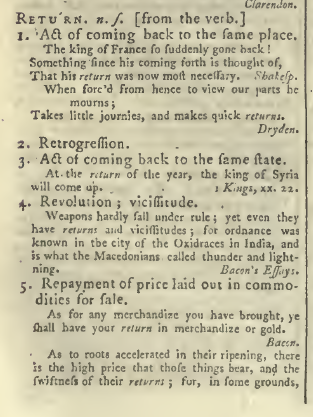
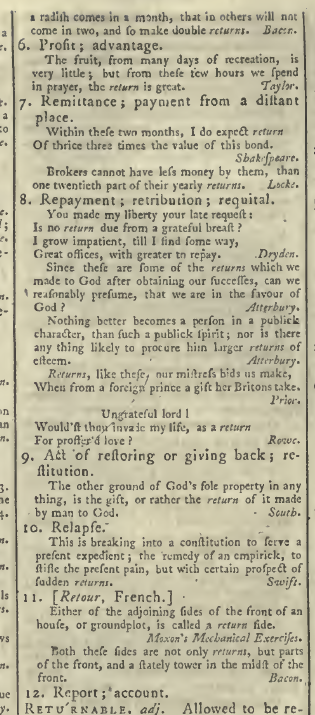
RETURN n. s. — 1785
12. Report; account.
Read with split mind-sets; one from the present, the other from the late 1700's. The present, where political party agenda rules above The Constitution. The past, before political parties took control over government.
About the time these united States of America was getting our start, Great Britain politics had two major political parties, the Tories and the Whigs.
Fast forward to the present. Imagine a political system that has become so corrupted that whatever political party held the majority at the time, refused to accept the qualifications of opposing party members?
Most people in these united States of America forget to remember that the modern Republicans and Democrat started out as Democratic-Republican Party, and remain a single unified party, even today. The illusion that the Democratic-Republican Party presents is that they have divided into separate parties and feud with each other over political control over the nation. The best evidence of the Democratic-Republican Party unity comes with two massive rights violating bills. The Treason Act, which sported the title of The Patriot Act and The Unaffordable Care Act, which they passed off as The Affordable Care Act.
After the Republican side of the party passed the treason act; the Democrat side of the party campaigned for all of eight years to repeal it if they ever got the majority of The House, The Senate, and The Presidency. They got that majority with Obama. They refused to repeal it. But instead, they passed the unaffordable care act. Which, in response, the Republican side of the party campaigned for all of the next eight years to repeal it if they got the majority of The House, The Senate, and The Presidency. The got it with Trump; but they too refused to repeal it.
Thus the evidence that the Republican-Democratic Political Party never parted ways. Only the illusion of a separation holds strong in the one-party politics in these united States of America.
but a smaller Number may adjourn from day to day, and may be authorized to compel the Attendance of absent Members, in such Manner, and under such Penalties as each House may provide.
The problem here is the same that developed in vote-counting the people's vote. A minority size portion of the group can take control over the majority.
Each House may determine the Rules of its Proceedings, punish its Members for disorderly Behaviour, and, with the Concurrence of two thirds, expel a Member.
(K. Notes:
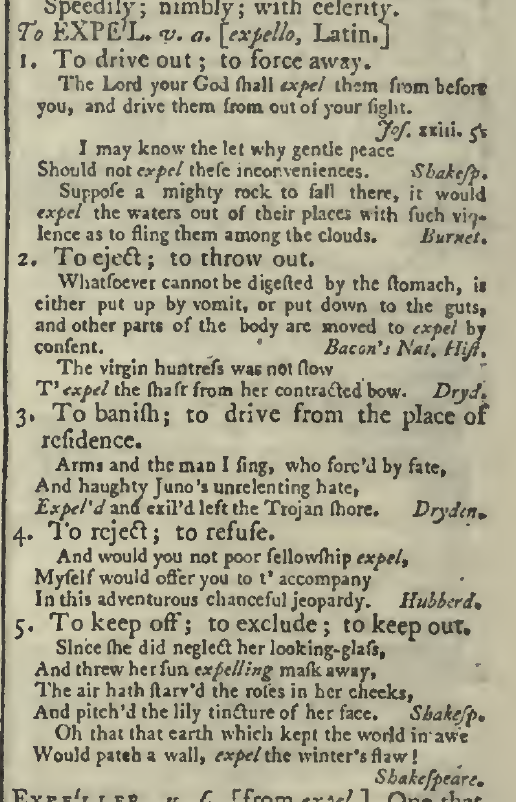
To Expel v. a. — 1785
1. To drive out; to force away.
2. To eject; to throw out.
3. To banish; to drive from the place of residence.
4. To reject; to refuse.
5. To keep off; to exclude; to keep out.
Sounds like club-house rules; as opposed to a place of serious business. This Constitution should have detailed the rules by which any person could be removed.
But wait a minute. This clubhouse belongs the States, which are the people. If a member is committing a crime, such as voting for unconstitutional acts; yes, they should be removed and tried for the treason they commit against the nation.
The House of Representatives? If two-thirds of the people sent there by the MEMBER-States can dictate whether or not The Representatives sent there by other member states are "worthy"; it no longer is a truly Representative House.
Each House shall keep a Journal of its Proceedings, and from time to time publish the same, excepting such Parts as may in their Judgment require Secrecy; and the Yeas and Nays of the Members of either House on any question shall, at the Desire of one fifth of those Present, be entered on the Journal.
(K. Notes: excepting such Parts as may in their Judgment require Secrecy;
The Constitution should detail in advance what types of information may be kept secret and for how long. There really are not many (if any at all) types of information that the corporate officers should be able to withhold from the owners and controllers of the corporation. Are there!
and the Yeas and Nays of the Members of either House on any question shall, at the Desire of one fifth of those Present, be entered on the Journal.
Every vote should detail which member, voted yes, no, absent, etc. This way the respective constituents may better determine to recall or leave seated for the remainder of the term.
Neither House, during the Session of Congress, shall, without the Consent of the other, adjourn for more than three days, nor to any other Place than that in which the two Houses shall be sitting.
(K. Notes: This seems to address The Declaration's grievance, which states, "He has called together legislative bodies at places unusual, uncomfortable, and distant from the depository of their public Records, for the sole purpose of fatiguing them into compliance with his measures."
Section 6.
The Senators and Representatives shall receive a Compensation for their Services, to be ascertained by Law, and paid out of the Treasury of the United States. They shall in all Cases, except Treason, Felony and Breach of the Peace, be privileged from Arrest during their Attendance at the Session of their respective Houses, and in going to and returning from the same; and for any Speech or Debate in either House, they shall not be questioned in any other Place.
(K. Notes: The Senators and Representatives shall receive a Compensation for their Services, to be ascertained by Law, and paid out of the Treasury of the United States.
This, unfortunately, was finally amended by one of those 'eternally' open proposed amendments; #27, which literally allows Congress to establish their own wages and benefits; as though the Corporate owners and controllers have no say. Though Originally proposed Sept. 25, 1789; it took nearly 200 years of dumbing down a nation to allow this to finally pass.
They shall in all Cases, except Treason, Felony and Breach of the Peace, be privileged from Arrest during their Attendance at the Session of their respective Houses, and in going to and returning from the same; and for any Speech or Debate in either House, they shall not be questioned in any other Place.
Part of this makes for really good logic. "They shall in all Cases, except Treason, Felony and Breach of the Peace, be privileged from Arrest [...] for any Speech or Debate in either House, they shall not be questioned in any other Place."
Why that clause makes for perfect logic is so that members may freely debate pros or cons of an issue that skirts the lines of constitutional-violations, treason or not. However, if such actual vote approves of such constitutional-violations, treason; those voting to favor it, must be tried for their actual vote, but not for the debate.
Where justice fails and falls apart is when these Congress members, or any legislative branch will exempt themselves from answering in courts of justice for any of their minor violations for which any citizen may be fined or otherwise arrested while going to or from their jobs, or while doing their jobs. This, in fact has been amended with Amendment 14 and the nor deny to any person within its jurisdiction the equal protection of the laws. It has, as yet, not been honorably applied. Our government officers, years ago, have been systematically exempting themselves from justice.
No Senator or Representative shall, during the Time for which he was elected, be appointed to any civil Office under the Authority of the United States, which shall have been created, or the Emoluments whereof shall have been encreased during such time; and no Person holding any Office under the United States, shall be a Member of either House during his Continuance in Office.
(K. Notes: The attentions of any government officer should be to only one job, one office. Unfortunately, with back-to back terms, those people occupying elected offices tend to spend their entire term running for re-election; rarely, if ever, getting any actual work done for which they were supposedly elected to do.
Section 7.
All Bills for raising Revenue shall originate in the House of Representatives; but the Senate may propose or concur with Amendments as on other Bills.
(K. Notes: The reason for every Revenue (money) Bill starting in The House is simple. Before the Representative favor or reject it, they must first balance it with The Constitution; then, if it is in fact constitutional; balance it with the will of their constituents (as opposed to how much money they were paid to pass or reject it).
This directly corrects The Declaration's grievance against Tyranny & Despotism, which states, "For imposing Taxes on us without our Consent".
Every Bill which shall have passed the House of Representatives and the Senate, shall, before it become a Law, be presented to the President of the United States; If he approve he shall sign it, but if not he shall return it, with his Objections to that House in which it shall have originated, who shall enter the Objections at large on their Journal, and proceed to reconsider it. If after such Reconsideration two thirds of that House shall agree to pass the Bill, it shall be sent, together with the Objections, to the other House, by which it shall likewise be reconsidered, and if approved by two thirds of that House, it shall become a Law. But in all such Cases the Votes of both Houses shall be determined by yeas and Nays, and the Names of the Persons voting for and against the Bill shall be entered on the Journal of each House respectively. If any Bill shall not be returned by the President within ten Days (Sundays excepted) after it shall have been presented to him, the Same shall be a Law, in like Manner as if he had signed it, unless the Congress by their Adjournment prevent its Return, in which Case it shall not be a Law.
(K. Notes: This details the passing of Bills into Law; the Presidential Veto, signing, or ignoring; and the Congressional Veto Override.
What generally is not discussed in this regard; is that even if a president thinks a Bill has societal merit; The President must veto the Bill if The Constitution does not authorize it to exist. To the contrary, if a president, for whatever reason does not like a particular Bill, but does find constitutional authority for it and has no reason to suspect the members pass it against the people's demands; The President must sign it, or at least allow the 10 days to expire, by which it becomes Law automatically.
Every Order, Resolution, or Vote to which the Concurrence of the Senate and House of Representatives may be necessary (except on a question of Adjournment) shall be presented to the President of the United States; and before the Same shall take Effect, shall be approved by him, or being disapproved by him, shall be repassed by two thirds of the Senate and House of Representatives, according to the Rules and Limitations prescribed in the Case of a Bill.
(K. Notes: If one House or the Other may Constitutionally do it; it does not need Presidential approval. However if it requires Both Houses, the President must approve or veto it, as with any other Bill.
Section 8.
(K. Notes: Section 8 primarily deals with granting specific powers to Congress; as opposed to Section 9, which are a list of limited or prohibited powers.
The Congress shall have Power To lay and collect Taxes, Duties, Imposts and Excises, to pay the Debts and provide for the common Defence and general Welfare of the United States; but all Duties, Imposts and Excises shall be uniform throughout the United States;
(K. Notes:
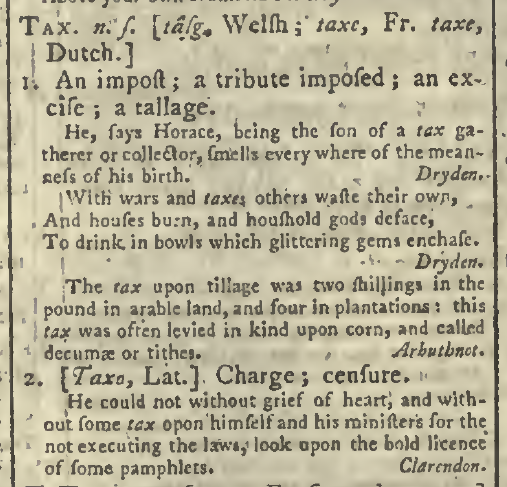
TAX n. s. — 1785
1. An impost; a tribute imposed; an excise; a tallage.
2. [Taxe, Lat.] Charge; censure.
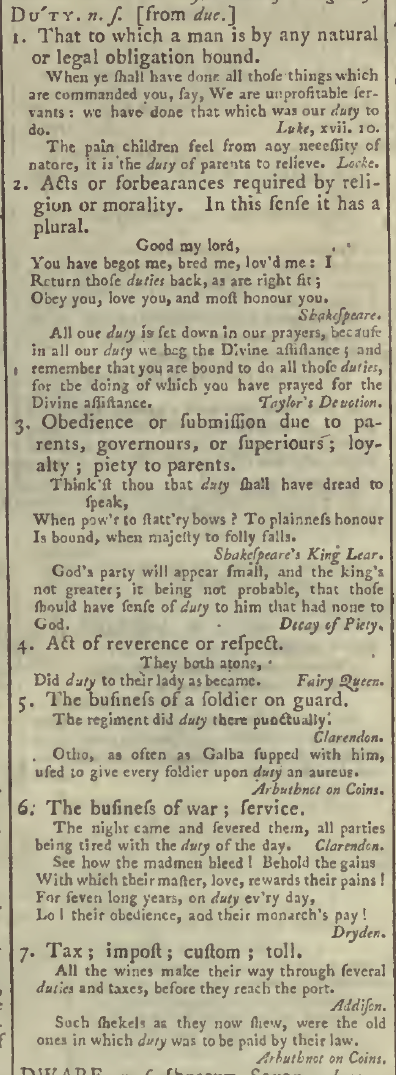
DUTY n. s. — 1785
7. Tax; impost; custom; toll.

IMPOST n. s. — 1785
A tax; a toll; a custom paid.
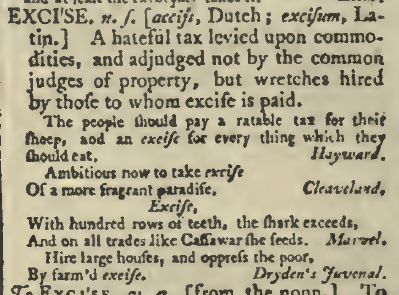
EXCISE n. s. — 1785
A hateful tax levied upon commodities, and adjudged not by the common judges of property, but wretches hired by those to whom excise is paid.
Four ways to collect taxes to pay for the military (common defense) and general powers granted to government to help the people secure their rights to happiness and prosperity. See definitions in the Preamble.
[The Congress shall have Power...] To borrow Money on the credit of the United States;
(K. Notes:
It seems to never make sense as to why Congress would need to borrow from anyone other than the taxpayers. Legitimately, honorably, honestly and such. The citizens are literally supposed to authorize their Representatives to vote to approve all bills of Revenue to pay for those things authorized by The Constitution and by the Taxpayers.
The government borrows from foreign countries, foreign banks, etc. and with interest. The interest also being repaid by the taxpayers. It seems quite logical that if this same Congress, as seen later, with the power to coin money; once authorized Constitutionally and by the citizens, Congress would coin/print the necessary money to pay those accounts. This will temporarily reduce the value of the nation's currency in relation to the volume created. Then, the people, through taxation, will repay that currency into the Treasury, without penalized interest. This, making it easier for the people to keep the national debt in manageable range.
When the
[The Congress shall have Power...] To regulate Commerce with foreign Nations, and among the several States, and with the Indian Tribes;
(K. Notes:
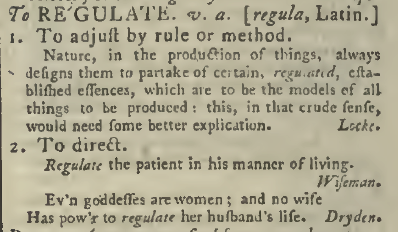
To REGULATE v. a. — 1785
1. To adjust by rule or method.
2. To direct.
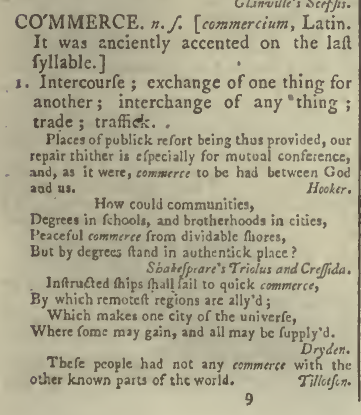
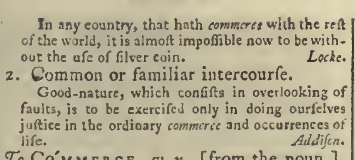
COMMERCE n. s. — 1785
1. Intercourse; exchange of one thing for another; interchange of any thing; trade; traffick.
Tis a good time to know how this changed from The Articles of Confederation. "The united states, in congress assembled, shall also have the sole and exclusive right and power of [...] - regulating the trade and managing all affairs with the Indians, not members of any of the states;".
As seen with the present Constitution, Congress is no longer authorized to manage all affairs with the Indians; only to regulate COMMERCE; as though they were merely another foreign country. Yet; Congress interferes with far more aspects of life in the Tribes than merely regulating commerce.
As seen by the definitions above, regulating commerce does not allow one party to dictate what they must take from the united States or give to the united States. The pipeline in the Dakotas is a great example. The tribes Said No! Yet the Federal Government has forced the pipeline into foreign land without consent. That is a declaration of war.
[The Congress shall have Power...] To establish an uniform Rule of Naturalization, and uniform Laws on the subject of Bankruptcies throughout the United States;
(K. Notes: Though Congress has established Immigration and Naturalization laws, they are poorly enforced; almost without penalty against offenders who enter or stay illegally. Amendment 13 helps address illegal immigration as well.
[The Congress shall have Power...] To coin Money, regulate the Value thereof, and of foreign Coin, and fix the Standard of Weights and Measures;
(K. Notes: regulate the Value thereof, and of foreign Coin
Though Congress may regulate the value of foreign coin domestically, that valuation may not hold in any other foreign country.
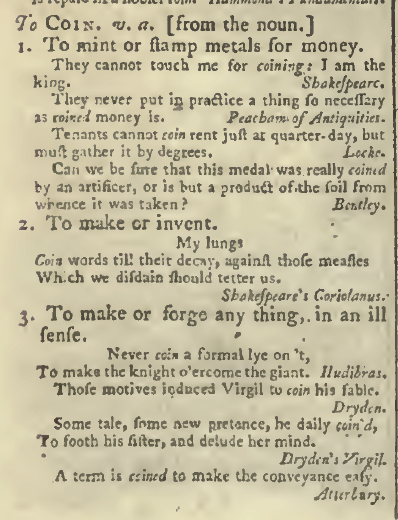
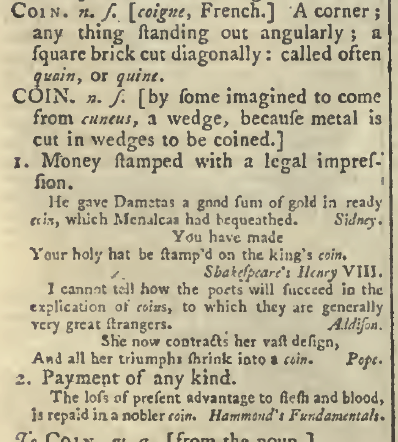
To COIN v. a. — 1785
1. To mint or stamp metals for money.
2. To make or invent.
3. To make or forge any ting, in an ill sense..
COIN n. s. — 1785
1. Money stamped with a legal impression.
2. Payment of any kind.
Congress has the power to coin money. O.K. And regulate the value of it. O.K. So where would Congress get the impression they could borrow money from any other entity than the citizens? Anyhow; Though the To Coin definition certainly restricts Congress authority to only that of metals; the Coin definition does not.
and fix the Standard of Weights and Measures
This mean that an Ounce of gold will weigh the same from state to state, city to city. The the length to a foot or rod will be the same also from state to state, city to city. However, these measurements may not be standardized from nation to nation.
[The Congress shall have Power...] To provide for the Punishment of counterfeiting the Securities and current Coin of the United States;
(K. Notes:
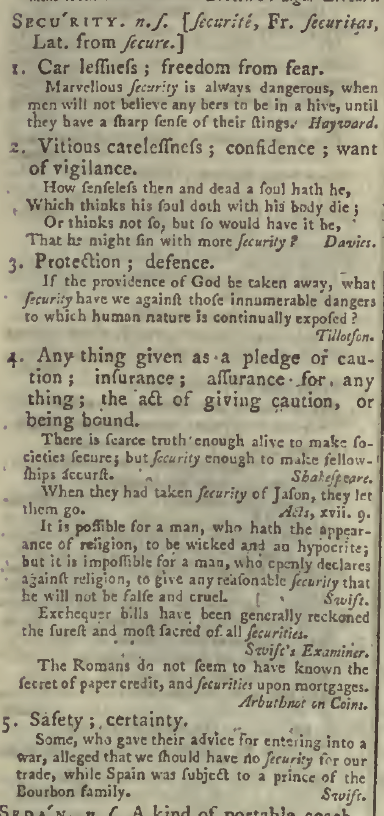
SECURITY n. s. — 1785
3. Protection; defence.
4. Anything given as a pledge or caution; insurance; assurance for any thing; the act of giving caution, or being bound.
5. Safety; certainty.

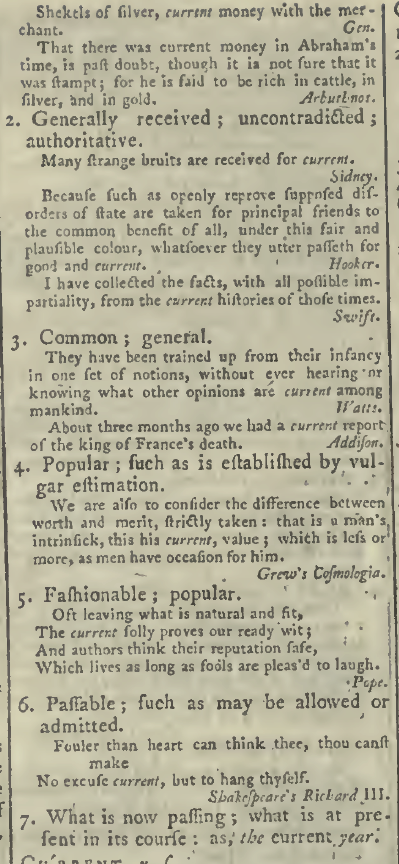
CURRENT adj. — 1785
1. Circulatory; passing from hand to hand.
2. Generally received; uncontradicted; authoritative.
3. Common; general.
4. Popular; such as is established by vulgar estimation.
5. Fashionable; popular.
6. Passable; such as may be allowed or admitted.
7. What is now passing; what is now present in it course: as; the current year.
Seems that once the government has taken a particular currency year out of circulation (say for age); anyone counterfeiting, that is, reproducing the out of circulation year cannot be punished for those acts as they are not counterfeiting the current Securities or coin.
[The Congress shall have Power...] To establish Post Offices and post Roads;
(K. Notes:
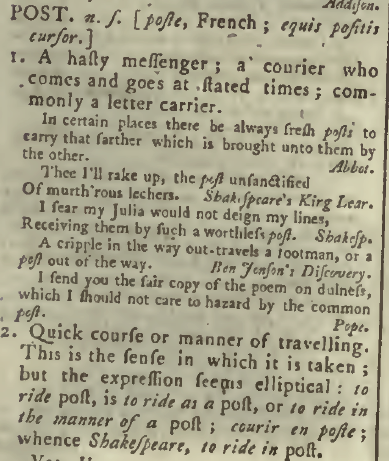
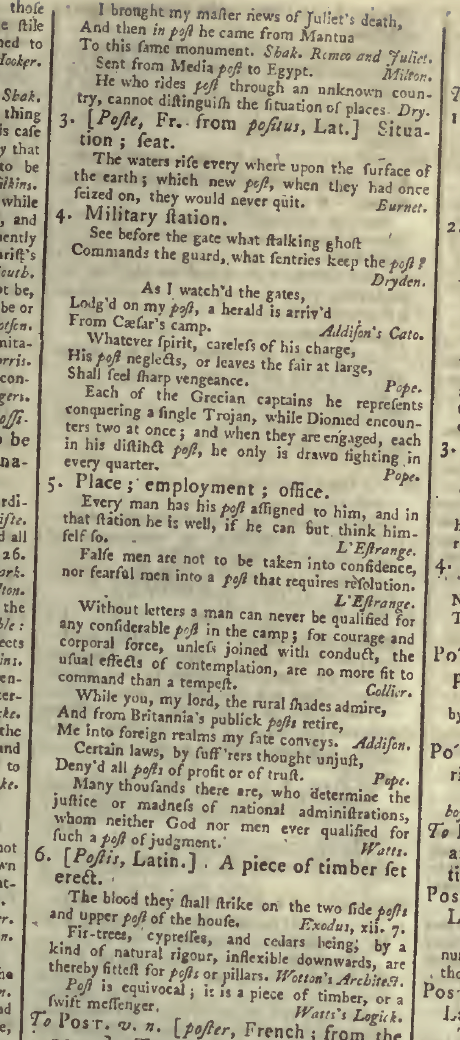
POST n. s. — 1785
1. A hasty messenger; a courier who comes and goes at stated times; commonly a letter carrier.
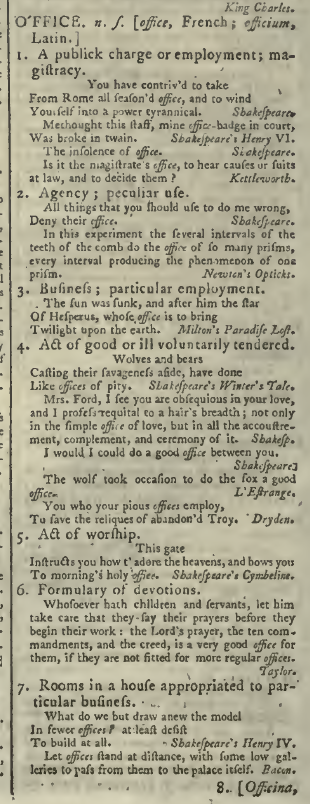
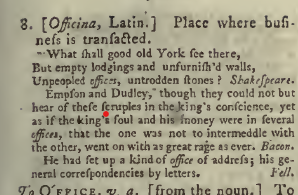
OFFICE n. s. — 1785
1. A publick charge or employment; magistracy.
2. Agency; peculiar use.
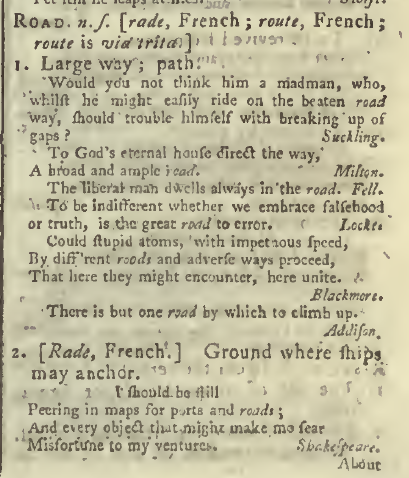
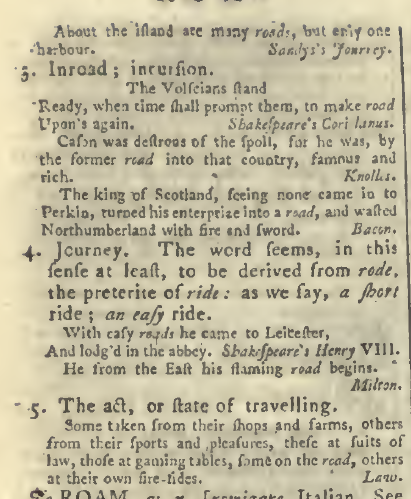
ROADS n. s. — 1785
1. Large way; path.
2. Ground were ships may anchor.
3. Inroad; incursion.
5. The act, or state of traveling.
Older generations are all to familiar with the brick and mortar Post Offices. Younger generations are more familiar with the internet post offices and post roads. The Information Highway? Other companies that deliver packages, they also are post offices. All if which fall under the control and regulation of Congress to protect the peoples rights and secure them from fraudulent actions.
This includes ground, water, and air; now space; as messages, posts, are sent along all those roads.
[The Congress shall have Power...] To promote the Progress of Science and useful Arts, by securing for limited Times to Authors and Inventors the exclusive Right to their respective Writings and Discoveries;
(K. Notes:

To PROMOTE v. a. — 1785
1. To forward; to advance.
2. To elevate; to exalt; to prefer.
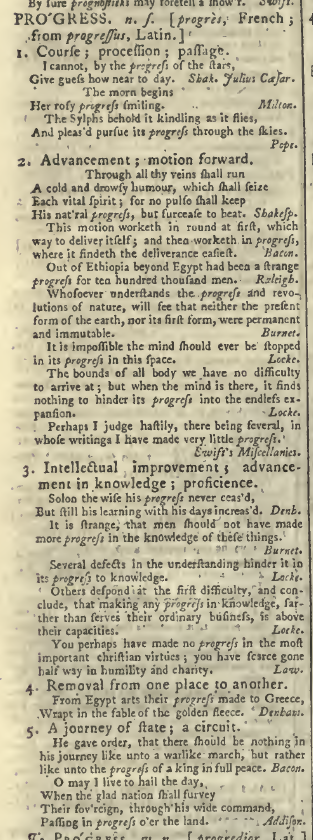
PROGRESS n. s. — 1785
2. Advancement; motion forward.
3. Intellectual improvement; advancement in knowledge; proficience.
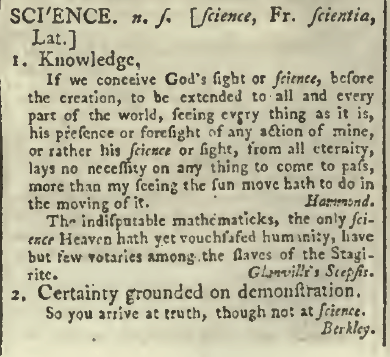
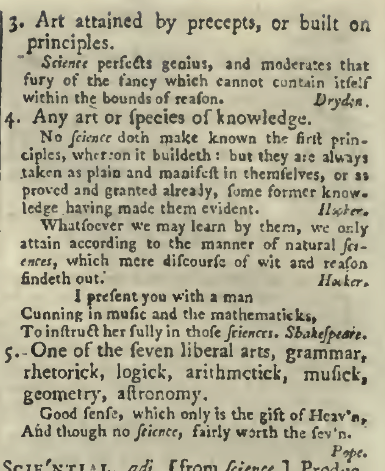
SCIENCE n. s. — 1785
1. Knowledge.
2. Certainty grounded on demonstration.
3. Art attained by precepts, or built on principles.
4. Any art or species of knowledge.
5. One of the seven liberal arts, grammar, rhetorick, logick, arithmetick, musick, geometry, astronomy.
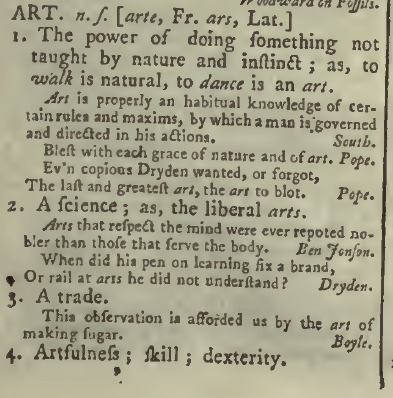
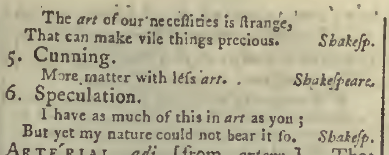
Art n. s. — 1785
1. The power of doing something not taught by nature and instinct; as, to walk is natural, to dance is an art.
2. A science; as, the liberal arts.
3. A trade.
4. Artfullness; skill; dexterity.
5. Cunning.
6. Speculation.
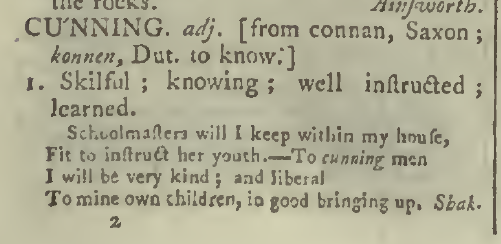
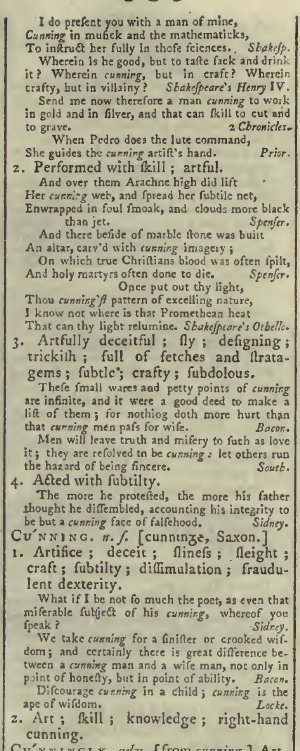
CUNNING adj. — 1785
1. Skillful; knowing; well instructed; learned.
2. Performed with skill; artful.
Congress is to basically popularize intellectual improvement of knowledge that can be demonstrated, as well as the skills and trades not taught by nature.
[The Congress shall have Power...] To constitute Tribunals inferior to the supreme Court;
(K. Notes:
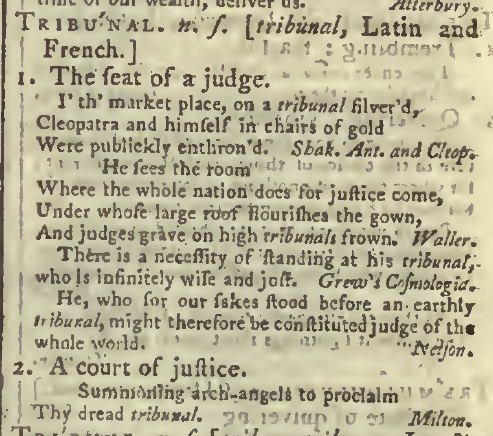
TRIBUNAL n. s. — 1785
1. The seat of a judge.
2. A court of a justice.
Thus the federal district courts, immigration courts, bankruptcy courts, etc.
[The Congress shall have Power...] To define and punish Piracies and Felonies committed on the high Seas, and Offences against the Law of Nations;
(K. Notes:
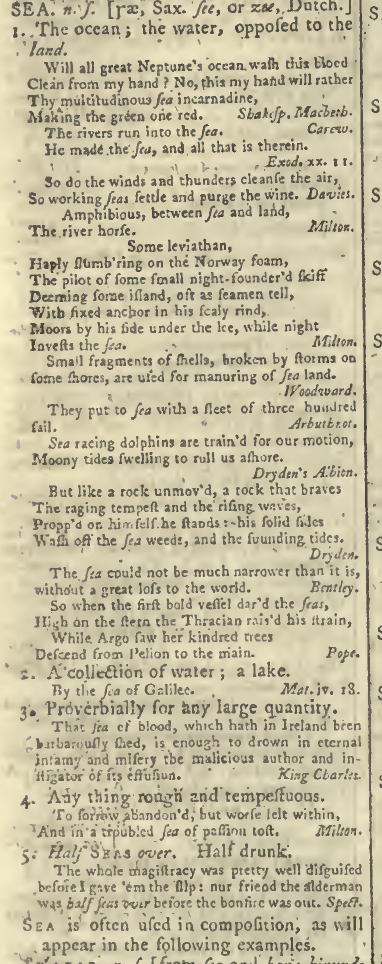
SEA n. s. — 1785
1. The ocean; the water, as opposed to the land
2. A collection of water; a lake.
3. Anything rough and tempestuous.
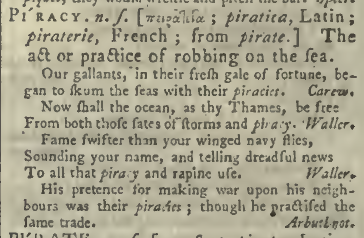
PIRACY n. s. — 1785
The act or practice of robbing on the sea.
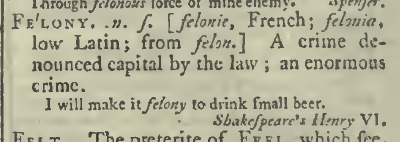
FELONY n. s. — 1785
A crime denounced capital by the law; an enormous crime.


Capital adj. — 1785
1. Relating to the head.
2. Criminal in the highest degree, so as to touch life.
2. That which affects life.
When we get into, what is The Law of Nations, as referred to here; the dictionaries are no help. However, the works of Emer de Vattel with his four-volume work titled, The Law of Nations, (1758); we realize that about that time in history, what is referred to as the law of nations is simply reliant upon existing treaties covering common areas, in this instance the oceans, or seas, as it states in The Constitution.
It is just too bad that in our nation's own history, we were not as eager to punish ourselves for violating the Laws of Nations, those treaties entered into by other politicians; as we have been against others who may have violated them against us.
This would not allow Congress to punish one offender against another entity that is not the united States of America; unless those other two parties contract with "The United States of America" to sit as judge over the issue.
[The Congress shall have Power...] To declare War, grant Letters of Marque and Reprisal, and make Rules concerning Captures on Land and Water;
(K. Notes:
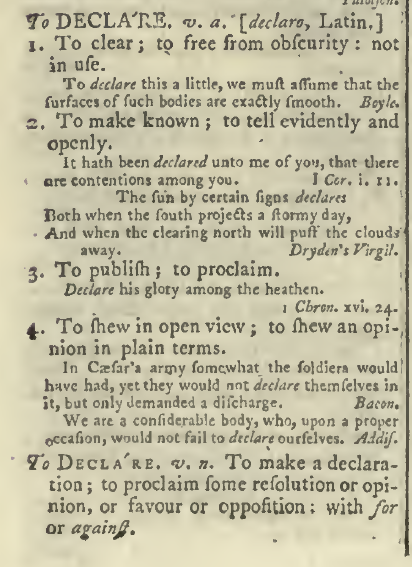
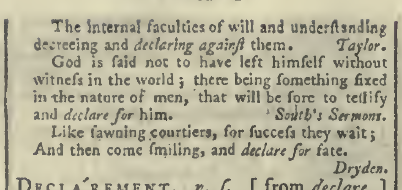
To DECLARE v. a. — 1785
2. To make known; to tell evidently and openly.
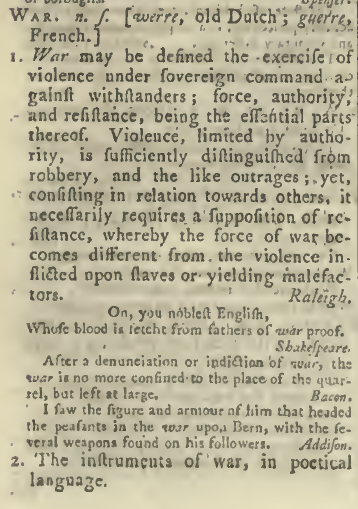
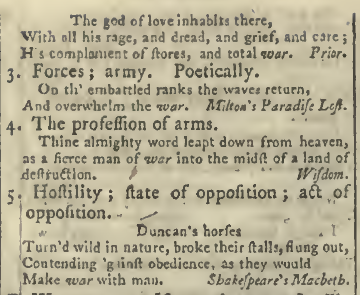
WAR n. s. — 1785
1. War may be defined the exercise of violence under sovereign command against withstanders; force authority, and resistance, being the essential parts thereof. Violence, limited by authority, is sufficiently distinguished from robbery. and the like outrages; yet, consisting in relation towards others, it necessarily requires a supposition of resistance, whereby the force of war becomes different from the violence inflicted upon slaves or wielding malefactors.
5. Hostility; state of oppression; act of oppression.
Neither the 1785 nor the 1756 dictionaries had anything close to "Letters of Marque and Reprisal". Went back to 1708, tripping over this different spelling as "LETTERS of MART or MARK"; and then went back to 1785.

LETTERS of MART or MARK — 1708
Letters which authorize one to take by Force of Arms those Goods which are due by the Law of Mark.
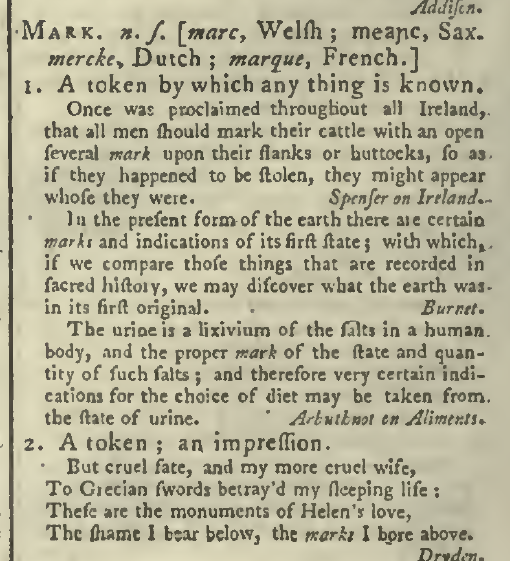
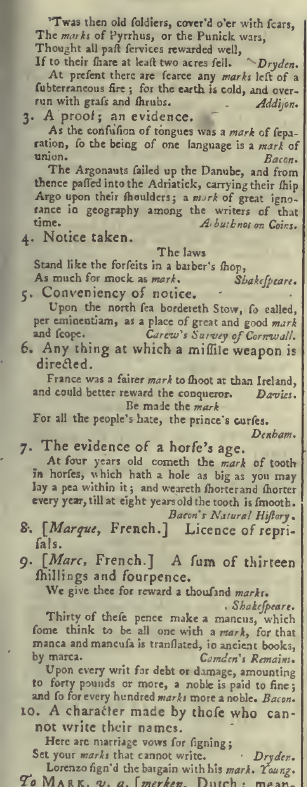
MARK n. s. — 1785
8. [Marque, French] Licence of reprisals.
From de Vattel "in every civilised state, a subject who thinks himself injured by a foreign nation, has recourse to his sovereign in order to obtain permission to make reprisals. This is what the French call applying for letters of marque."
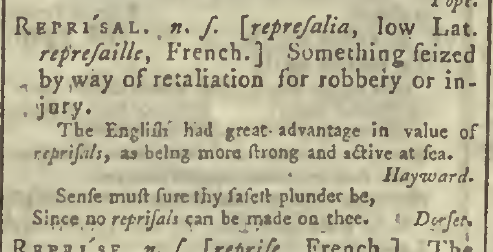
REPRISAL n. s. — 1785
Something seized by way of retaliation for robbery or injury.
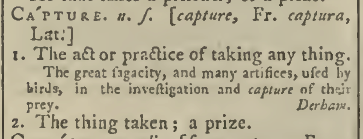
CAPTURE n. s. — 1785
1. The act or practice of taking any thing.
2. The thing taken; a prize.
To properly comprehend the war powers of Congress, we must know what our nation's founding Charter, The Declaration, tells us about how we are to treat the rest of the world.
We must, therefore, acquiesce in the necessity, which denounces our Separation, and hold them [British brethren], as we hold the rest of mankind, Enemies in War, in Peace Friends.
In summary; Congress holds no power to declare any offensive wars; only, defensive. With that, the letters and captures must be connected to a Constitutionally declared war. It is not supposed to have anything to do with whether or not some country leaders or other business managed to get the upper hand over some politician and caused them to lose lots of money, etc.
[The Congress shall have Power...] To raise and support Armies, but no Appropriation of Money to that Use shall be for a longer Term than two Years;
(K. Notes:
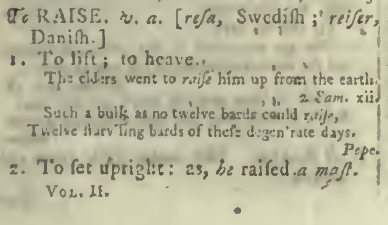

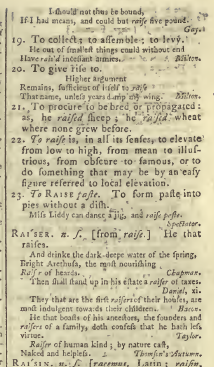
To RAISE v. a. — 1785
10. To excite to war or tumult; to stur up.
13. To bring into being.
18. To collect; to obtain a certain sum.
19. To collect; to assemble; to levy.
20. To give rise to.
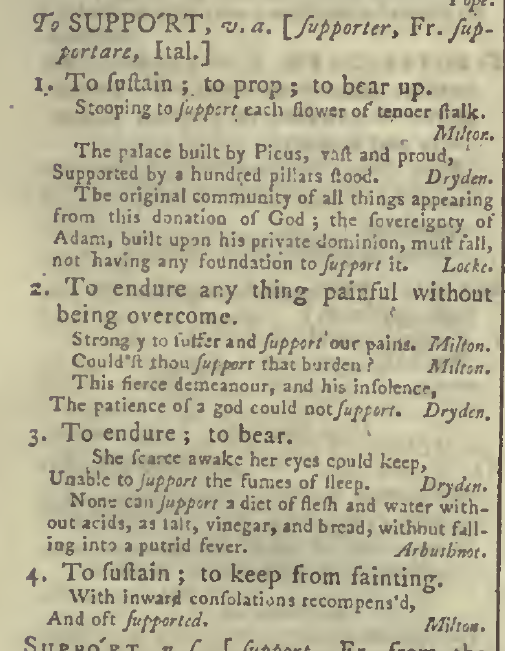
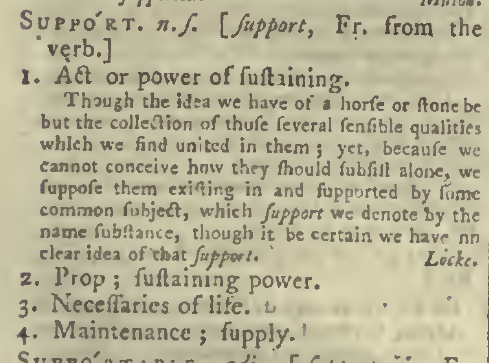
To SUPPORT v. a. — 1785
1. To sustain; to prop; to bear up.
4. To sustain; to keep from fainting.
SUPPORT n. s. — 1785
1. Act or power of sustaining.
2. Prop; sustaining power.
3. Necessaries of life.
4. Maintenance; supply.
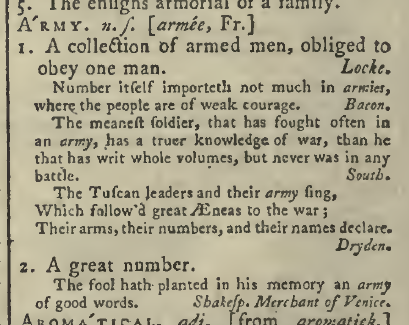
ARMY n. s. — 1785
1. A collection of armed men, obliged to obey one man.
2. A great number.
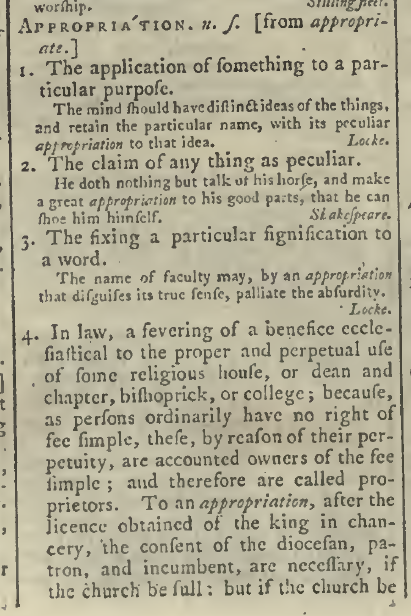

APPROPRIATION n. s. — 1785
1. The application of something to a particular purpose.
This is not referring to the Militia. The Militia are addressed in about three more references to armed people. The Navy, Air Force, Marines, Coast Guard, Border Patrol, Marines, Homeland Security, Space Force, FBI, NSA, Sheriff's Departments, Police; and most probably more; all qualify as Armies, by definition. All of them, in times of war, can be called into service of the united States of America, the nation; by way of "The United States of America", the government: All, then obliges to obey one person, The President's Constitutional Orders.
To Raise & Support; is nothing more than assembling these bodies of armed people, providing them with the necessities of life, supplying them with the tools and equipment to perform their duties. More on this in the arming and equipping.
Congress may apply a specific sum of money for the raising and supporting the Armies; but those funds must not extend beyond two years. This does not prohibit Congress from passing appropriations bills for raising and supporting the Armies every Second Year.
At the end of each two years, Congress is supposed to analyze what is needed and what can or should be cut.
[The Congress shall have Power...] To provide and maintain a Navy;
(K. Notes:
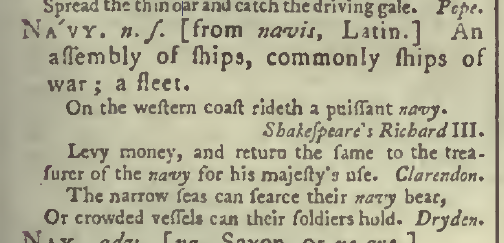
NAVY n. s. — 1785
An assembly of ships, commonly ships of war; a fleet.
As with the Armies (plural), Congress is to provide and maintain a Navy; which is nothing but an army on water. Notice the 1785 definition simply states "an assembly of ships". It does not specify "water"-ships, "air"-ships, or even "space"-ships. Just ships.
So, by definition; though they may never have seen airplanes, jets, or spaceships as things in the future; their definition certain do not exclude them. What would be curious to know is whether the naming of these other craft was done with The Definition of Constitutional words in mind or not.
[The Congress shall have Power...] To make Rules for the Government and Regulation of the land and naval Forces;
(K. Notes: This is one of those types of clauses where commas can make all the difference in meaning. “Goats cheese salad ingredients: lettuce, tomato, goats, cheese” and then; “Slow children crossing”.
In the two examples above; first with the Goat & Cheese or the Goat Cheese. When we know that some salads are served with bacon, ham, chicken, tuna, etc. this might not be a mistake as the people at https://www.oxbridgeediting.co.uk/blog/funny-grammar-mistakes-commas/ have indicated. Maybe the meat served with the salad is actually Goat meat.
In there second, from the same resource, they indicated that there was comma missing between Slow and Children. But that would only be true if the children were neither physically slow or mentally slow.
With "[The Congress shall have Power...] To make Rules for the Government and Regulation of the land and naval Forces;" a person might incorrectly assume that Congress has the authority to makes the "Rules for government" as well as the "Regulation of the land and naval Forces". Why an incorrect assumption? Because This Constitution IS the Rule for government. We know this from Article 6, of this Constitution.
With the clause under investigation: The Congress shall have Power To make Rules for the (Government and Regulation) of the land and naval Forces. This allows Congress to govern and regulate the Armed Forces, ALL of them, as the militia and local sheriffs and police departments are part of those Armed (land and naval) Forces.
[The Congress shall have Power...] To provide for calling forth the Militia to execute the Laws of the Union, suppress Insurrections and repel Invasions;
(K. Notes: The Militia Act of 1792 is a direct violation against The Constitution, this Article, This Section, This Clause; which grants that power only to Congress, without authority to deligate that power. The Presidential calling of the militia is unconstitutional. The Militia Act of 1792 is an act of Rebellion, Insurrection, and Treason against The Constitution, Article 5.
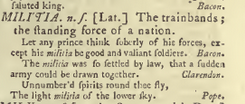
MILITIA n. s. — 1785
The trainbands; the standing forces of a nation.
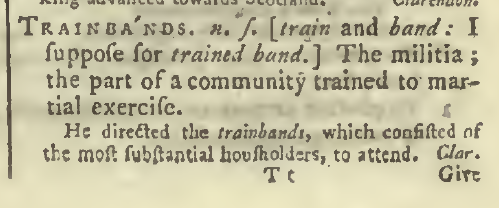
TRAINBANDS n. s. — 1785
The militia; part of a community trained to martial exercise.
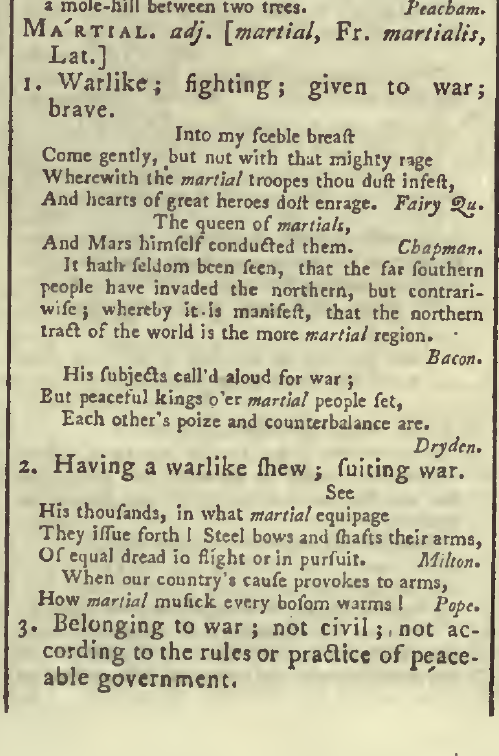
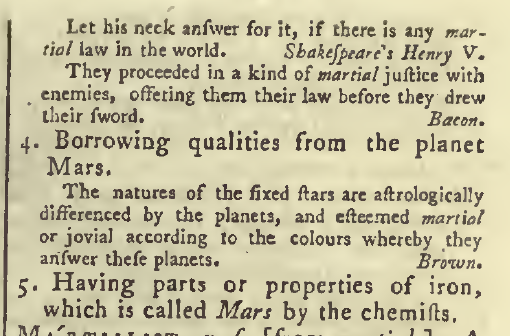
MARTIAL adj. — 1785
1. Warlike; fighting; given to war; brave.
2. Having a warlike shew; suiting war.
3. Belonging to war; not civil; not according to the rules and practices of peaceable government.
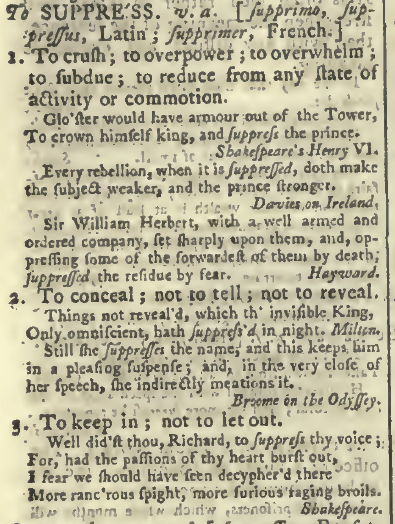
To SUPPRESS v. a. — 1785
1. To crush; to overpower; to overwhelm; to subdue; to reduce from any state of activity or commotion.
2. To conceal; not to tell; not to reveal.
3. To keep in; not to let out.
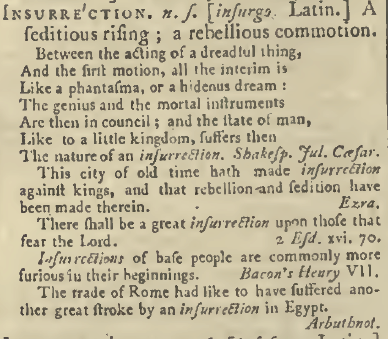
INSURRECTION n. s. — 1785
A seditious rising; a rebellious commotion.
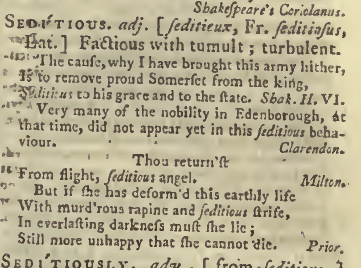
SEDITIOUS adj. — 1785
Factious with tumult; turbulent.
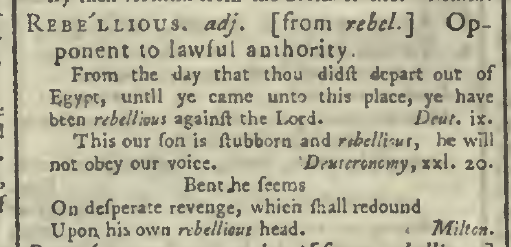
REBELLIOUS adj. — 1785
Opponent to lawful authority.
(K. Notes: This note is simply to stress the words lawful authority in the definition; [Opponent to lawful authority.] Any government action that violates The Constitution is not lawful authority.
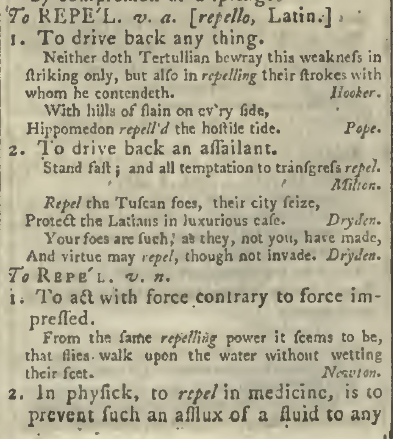
To REPEL v. a. / v. n. — 1785
v.a.1. To drive back any thing.
v.a.2. To drive back an assailant.
v.n.1. To act with force contrary to force impressed.
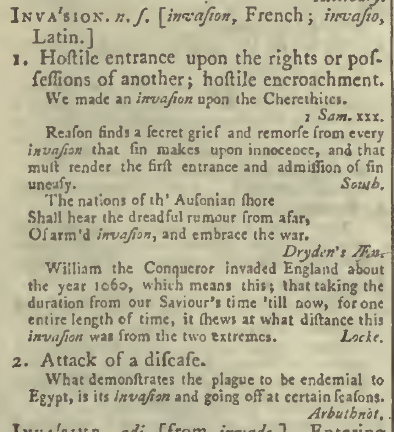
INVASION n. s. — 1785
1. Hostile entrance upon the rights or possessions of another; hostile encroachment.
2. Attack of a disease.
Congress can call the militia, which includes any of people trained to martial, that is military, that is armed combat. People of the community, such as police and sheriffs departments. We know this part to be true as most police forces are better armed and better militarily equipped than many foreign countries standing military.
But...
Congress can only call on these armed people to enforce the
nation's laws; to stop the violence from insurrections,
which are rebellions, which are restricted
to only those Opponents to lawful authority. None of the government branches or levels have been a
constitutionally lawful authority; as
violating The Constitution of the United States of America in any way, removes them from being a lawful authority (except in those extremely few instances where they are acting with certain and clearly defined constitutional authority). Congress, here, as in other sections and clauses of this Constitution, Congress does not possess the power to define what is an insurrection or rebellion; only to stop the ones that oppose LAWFUL, that is Constitutional government authority.
Also Congress has power to drive back any invasion. This would include illegally entering the nation. But Congress grants mass amnesty to those who violate the immigration laws the longest. This is a treasonous act by Congress and Presidents who pass and sign those amnesty bills, and the supreme Court that holds neither of the others accountable to the Constitution.
Hostile entrance on the rights or possessions of others; hostile encroachment? Yes! This also is another treasonous act of Congress by giving private property to railroads by use of deadly force. This is an act of any government office or branch that uses the unconstitutional power of Eminent Domain.
[The Congress shall have Power...] To provide for organizing, arming, and disciplining, the Militia, and for governing such Part of them as may be employed in the Service of the United States, reserving to the States respectively, the Appointment of the Officers, and the Authority of training the Militia according to the discipline prescribed by Congress;
(K. Notes: This is interesting in the way it is worded; by what it includes; but more by what it excludes.
What it includes is the nations government level is responsible funding, the (provide) part for organizing, arming, and disciplining, the Militia, and for governing (ONLY) such Part of them as may be employed in the Service of the United States.
Then, it leaves to the states to appoint the Officers and to train the Militia as Congress sees fit.
What is not mentioned is the expected eventuality that the government, Congress, will begin trampling the people's rights; the same as Ole King George III. This is for what The Declaration prepares the citizens, when t states; "When governments become destructive to the security of the people's rights...". Amendment 2 somewhat alters the Congress-Militia relationship. Though Congress is required to train, arm and supply the militia is not specified in that it the militia members may, and should take the weapons and equipment of their training home with them for that "when" clause of The Declaration. Amendment 2 does not prohibit any citizen from arming themselves in like manner as the military, or militia. Amendment 2 does not exempt the private citizen from the requirement of being properly trained on how to use those ARMS in defense of community (local or nationally).
The worst part about Congressional Training of the Military and the Militia is that none of that training instructs the individual about how to recognize our domestic enemies in government; those tyrants and despots that exercise any of those political powers listed in The Declaration as characteristic marks of tyranny and despotism. But, Congress has treasonously adopted a pledge of allegiance to the government and forced young impressionable children to recite it, under threat of punishment, as though it were patriotic to do so. The citizen owes the government absolutely no allegiance. It is the government that owes to the citizen its allegiance, by way of the oath administered to support and defend and uphold The Constitution of the United States of America.
[The Congress shall have Power...] To exercise exclusive Legislation in all Cases whatsoever, over such District (not exceeding ten Miles square) as may, by Cession of particular States, and the Acceptance of Congress, become the Seat of the Government of the United States, and to exercise like Authority over all Places purchased by the Consent of the Legislature of the State in which the Same shall be, for the Erection of Forts, Magazines, Arsenals, dock-Yards, and other needful Buildings;—And
(K. Notes: We must take careful notice of this clause "To exercise exclusive Legislation in all Cases whatsoever, over such District (not exceeding ten Miles square)" we we also remember this clause from The Declaration as one of the grievances that identify tyranny and despotism; "For suspending our own Legislatures, and declaring themselves invested with power to legislate for us in all cases whatsoever."
If this is not to be the start of our nation's demise; beginning to grant tyrannical and despotic powers to our own government; we must read the remainder of this section really carefully. With hind-site reference points to their future, our past; we must see if there is a difference between that of the word CESSION, used here; and that of SECESSION, used in the 1860's when several states left the union.
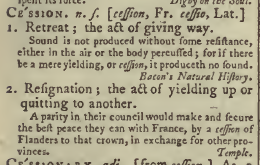
CESSION n. s. — 1785
1. Retreat; the act of giving away.
2. Resignation; the act of yielding to or quitting to another.
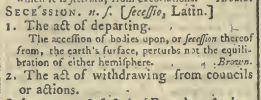
SECESSION n. s. — 1785
1. The act of departing.
2. The act of withdrawing from councils or actions.
SECESSION is when one part leaves or withdraws from another or the other parts. This is not what was happening here.
What was happening here was where one or more states would volunteer to Congress some portion of their State for the use of our nation's Seat of Government; thus resigning that State's use and giving away that use for Congress to use for the Seat of the Nation's Government, which, if correct, started out in just single building in New York, until the 1800's. The seat of government would occupy some space in that 10 miles square, but no more.
Congress may legislate in all cases whatsoever over the actual seat of government; not the businesses and not the residences; as these remain part of the State that they were in. At the very least; the area that is DC should be a two-state city; Washington DC, Maryland and that of Washington DC, Virginia. Otherwise, so tyranny does not spread; the resident citizens of DC should participate in the selection of every member of Congress, because every member of Congress is the actual legislative body over DC. The DC City Council is nothing more than a legislative committee of Congress, since Congress must approve of or reject the actions of the "City Council".
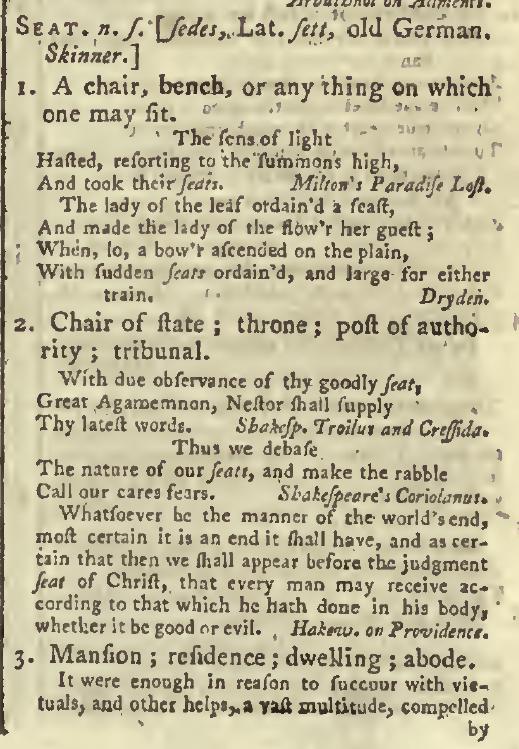
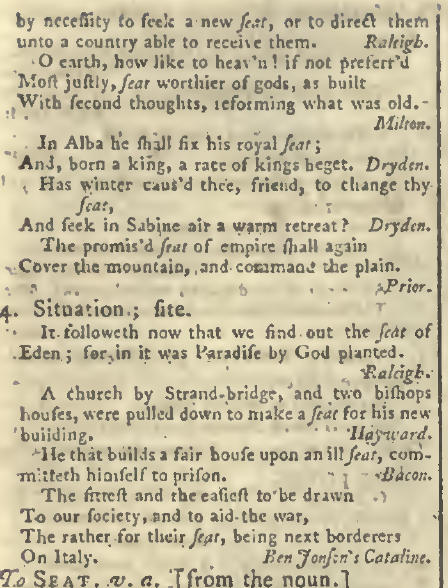
SEAT n. s. — 1785
1. A chair, bench, or any thing which one may sit.
2. Chair of state; throne; post of authority; tribunal.
3. Mansion; residence; dwelling; abode.
4. Situatiopn; site.
The actual SEAT of government is the Legislative Buildings, the Executive Buildings, and the Judicial Buildings where the constitutional activity of government take place. NONE of the remainder of that ten miles square is the actual seat of government and subject to the laws of the respective states.
Congress as full constitutional legislative authority over those other Constitutionally authorized forts, magazines (not the publishing magazines; so you may look up those 1785 definions), etc., listed.
[The Congress shall have Power...] To make all Laws which shall be necessary and proper for carrying into Execution the foregoing Powers, and all other Powers vested by this Constitution in the Government of the United States, or in any Department or Officer thereof.
(K. Notes: This is not authorizing Congress to execute those powers, but to make laws for the President, the Executive Officer to do.
Any powers granted to government, from within this Constitution, Congress may legislate. But no more. This would then restrict the powers of the Executive and Judicial powers as well to only those areas that Congress constitutionally legislates.
Section 9.
The Migration or Importation of such Persons as any of the States now existing shall think proper to admit, shall not be prohibited by the Congress prior to the Year one thousand eight hundred and eight, but a Tax or duty may be imposed on such Importation, not exceeding ten dollars for each Person.
(K. Notes: With Section 9, we get into specific limitation or prohibitions against Congressional Power. This clause seems merely to allow a similar clause from The Articles of Confederation, Article 9 to continue unhindered by Congress until after 1808; after which time Congress could take over the regulation on the migration and importation of people by way of the Uniform Code of Immigration and Naturalization; and with respect to slavery, as they were, at the time, considered merchandise, regulate the commerce of slavery between the united States of America and foreign countries and with the tribes.
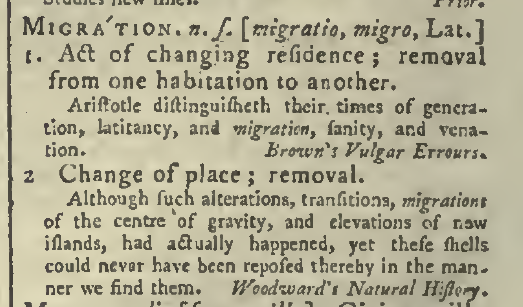
MIGRATION n. s. — 1785
1. The act of changing residence.
2. A change of place; removal.
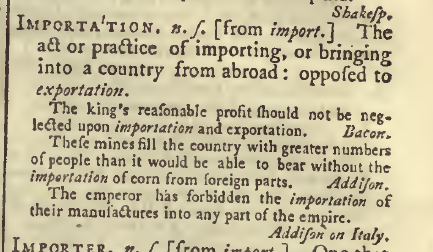
IMPORTATION n. s. — 1785
The act or practice of importing, or bringing into a country from abroad: opposed to exportation
The migration suggests a more voluntary action on the part of the people coming into a given state. At which point, it seems that each state would regulate its own population. The importation, on the other hand, hints more towards slavery as a commodity; when, in The Declaration, it states, "all men are created equal"; slavery in these united States of America was supposed to end in 1776, except, of course, for forcing people to work to pay off a debt they owed to another; thus, the eventual application of Amendment 13.
The Privilege of the Writ of Habeas Corpus shall not be suspended, unless when in Cases of Rebellion or Invasion the public Safety may require it.
(K. Notes:
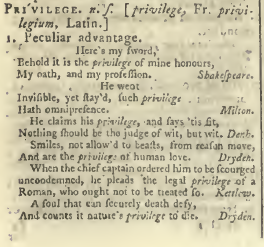

PRIVILEGE n. s. — 1785
1. Peculiar advantage.
2. Immunity; right not universal.
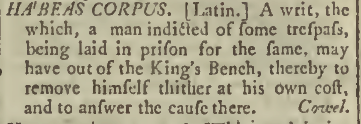
HABEAS CORPUS — 1785
A writ which, a man indicted of some trespass, being laid in prison for the same. may have out of the King's Bench, thereby to remove himself thither at his own cost and to answer the cause there.
This clause is another example of This Constitution taking our nation backwards from The Declaration and it proclaiming, That All Mankind Are Created Equal. This clause certainly favored the richer portions of society. For who else could afford to get the courts to hear their case earlier, so they did not have to remain in prison until their turn in line?
Thus, the need for a clause on Amendment 14, Section 1; "nor shall any State deprive any person of life, liberty, or property, without due process of law; nor deny to any person within its jurisdiction the equal protection of the laws."
But not even Amendment 14 could stop government by imposing bail, that generally only the wealthier sectors of society could afford.
No Bill of Attainder or ex post facto Law shall be passed.
(K. Notes:
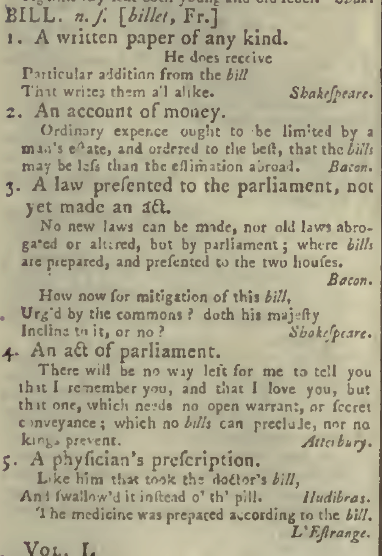
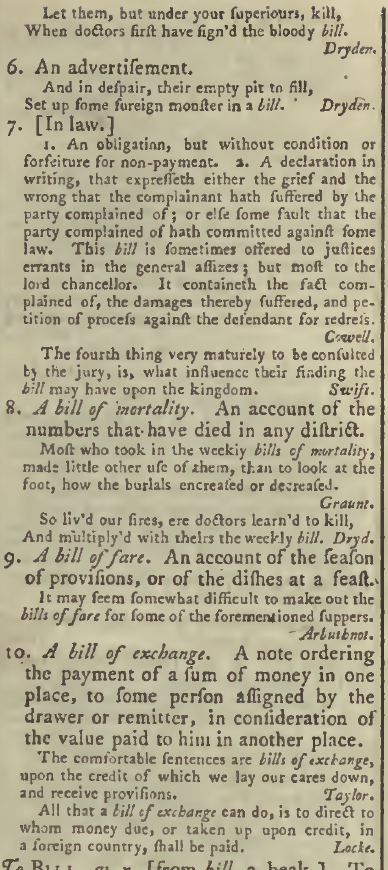
BILL n. s. — 1785
1. A written paper of any kind.
7. [In law] 1. An obligation, but without condition or forfeiture for non-payment. 2. A declaration in writing, that expresseth either the grief and the wrong that the complainant hath suffered by the party complained of; or else some fault that the party complained of hath committed against some law. This bill is sometimes offered to justices errants in the general assizes; but most to the lord chancellor. It containeth the fact complained of, the damages thereby suffered, and petition of process against the defendant for redress.
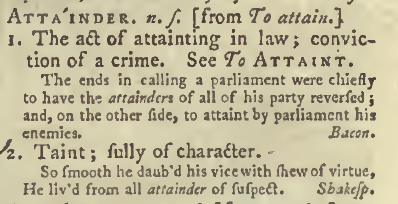
ATTAINDER n. s. — 1785
1. The act of attainting in law; conviction of a crime.
2. Taint; sully of character.

EX POST FACTO — 1708
Term us'd for the do'ng a thing after the time when it should have been done.
This is curious. "No Bill of Attainder [...] shall be passed"?
I hate to do this, using modern resources to define older phrases, but I make the exception in this instance as a way of explaining the two-part dictionary definitions above for BILL and ATTAINDER.
First, from
https://www.law.cornell.edu, it states, "A bill of attainder is a piece of legislation that declares a party is guilty of a crime. Bills of attainder allow the government to punish a party for a perceived crime without first going through the trial process."
Then from
constitution.congress.gov It states: A bill of attainder is legislation that imposes punishment on a specific person or group of people without a judicial trial. The term has its roots in English law before the Founding. As the Supreme Court has explained:
The bill of attainder, a parliamentary act sentencing to death one or more specific persons, was a device often resorted to in sixteenth, seventeenth and eighteenth century England for dealing with persons who had attempted, or threatened to attempt, to overthrow the government.
In light of the current events at this time, regarding Ex-President Donald Trump; seems that the so-called experts regarding a disqualification for the office of President (among others) is that the mere suspicion that a person may have engaged in rebellion or insurrection against This Constitution is enough to disqualify them without a trial. If this were true about Amendment 14, Section 3; then it, itself, is a Bill of Attainder, which could be unjustly used against anyone by any political party person for any reason at all. Guilty. No Trial needed? The politicians can sully, destroy, and otherwise ruin a person's reputation in such manner; and all without the Amendment 6 jury-trial requirement.
Some might claim that since Amendment 14 follows Amendment 6; that 14 somehow excludes trial by an impartial jury. It does not. Rebellion, Insurrection against This Constitution is a criminal act. Amendment 14 does not exclude these charges from the requirements of Amendment 6 criminal prosecutions.
That is the difference here, as opposed with the differences between Amendment 8's prohibition against cruel or unusual punishment and that of Amendment 13's provision for the use of slavery to punish criminal actors. Both these amendments cover punishment. The later defining that slavery is neither cruel nor unusual punishment for criminal actions. However, the difference between Amendment 6 and that of 14 Section 3 is that they both deal with criminal prosecutions; the latter, Amendment 14, not excluding itself from Amendment 6 by declaring the Amendment 14 actions as "non-criminal".
As for the Ex Post Facto laws? Government is prohibited from passing laws that criminalize action not prohibited prior to the prohibiting law. This must be viewed along with Amendment 9, which prohibits government from passing any laws the deny, disparage, infringe, or otherwise violate any right not listed in the Constitution that authorizes government some limited intrusion of that right.
(K. Notes:

CAPITATION n. s. — 1785
Numeration by heads.
This will be covered in more detail when discussing Amendment 16 and the Income Tax authorization and application. But for now, this clause does not authorize the use of either a census or an enumeration. It simply states that the one to be used was authorized earlier in The Constitution. People might generally be surprised to realize or learn that This Constitution does not ever (yet) authorize government the power to do a Census. More on this at Amendment 14.
No Tax or Duty shall be laid on Articles exported from any State.
(K. Notes:
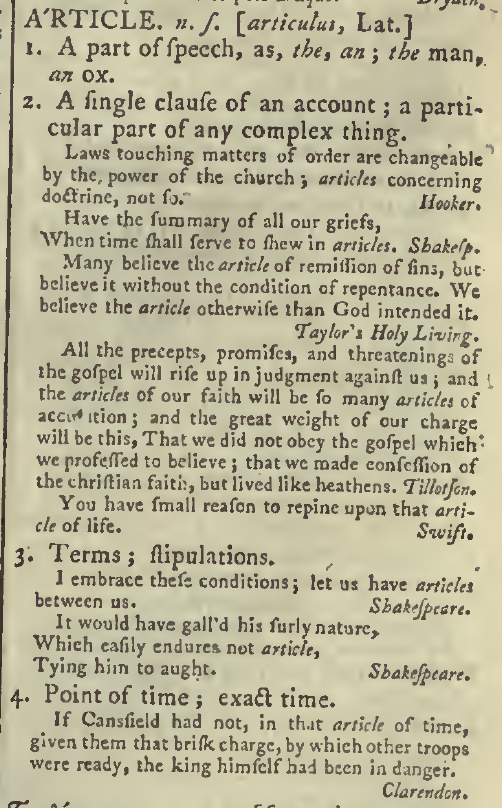
ARTICLE n. s. — 1785
1. A part of speech, as, the, an; the man, an ox.
2. A single clause of an account; a particular part of any complex thing.
3. Terms; stipulations.
But what are 'Articles'? This, as you see from the 1785 dictionary definition; the definitions seem strange to the use of the word. The same definition shows in 1708, 1756, and 1768, with little or no variation. Having looked up Commodities, Items, Wares, Merchandise, Goods, Effects, Moveables, and a few others to see if they circle back to Article; none that I looked up did.
Looks as though when actual useful definitions seem of little help, we must rely on logical deduction. Articles can be exported. So, we ask: What are things that can be exported? Merchandise, personal property, harvests, information, etc., even George Carlin's STUFF (came Close) by mentioning several of the other items previously listed. An article of clothing, is a part of someones clothes. With this, Definition #1 seems closest to a correct definition.
This does not allow my state or the nation's government to tax any articles I export from my state, or any state.
There are frequent references to there being only one government (several levels, three branches per level). They all swear oath to This Constitution; thus, only one government. All branches and levels must obey This Constitution. In some places certain powers are reserved or prohibited for or against only The nation's level (at one branch or another). Some powers specifically prohibited to the states. But in all cases, when any branch or level of government fails or refuses to perform their duties; it becomes the duty of any or all the other levels and branches to step up and correct those ills. When government fails generally, it all falls back on the people, the citizens.
No Preference shall be given by any Regulation of Commerce or Revenue to the Ports of one State over those of another: nor shall Vessels bound to, or from, one State, be obliged to enter, clear, or pay Duties in another.
(K. Notes:

PORT n. s. — 1785
1. A harbour; a safe station for a ship.
2. [Porta, Latin; porte, Saxon; porte, French.] A gate.
Basically, citizens and domestic commerce are supposed to be allowed freedom of movement throughout the country without being required to pay funds into one state's treasury over another. Though, Congress may regulate commerce between the states, Congress cannot give preference to any state; requiring trucks or ships to go through this or that port of entry. Though in most instances the taxes are prepaid in registration fees, and inspection fees.
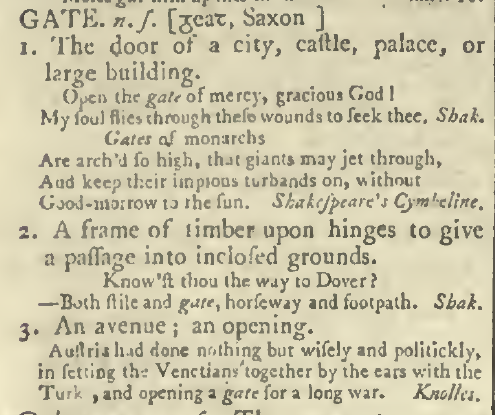
GATE n. s. — 1785
1. The door of a city, castle, place, or large building.
3. An avenue; an opening.
So, even though great big truck were not around in the 1700's, this still applies to them today, as every state has a "port-of-entry" along nearly every major highway entering and leaving each state to inspect and otherwise fine/tax the company.
No Money shall be drawn from the Treasury, but in Consequence of Appropriations made by Law; and a regular Statement and Account of the Receipts and Expenditures of all public Money shall be published from time to time.
(K. Notes: Appropriations made by Law;
Those by law words do not start with bills passed by Congress and signed by Presidents. It starts with The Supreme Law of the Land, as detailed in Article 6 of This Constitution, which requires that all laws be made in pursuance to this Constitution. This means that a spending bill that violates This Constitution is not made in pursuance thereof, that spending bill is unconstitutional, and not made, by law.
The regular Statement and Account of the Receipts and Expenditures of all public Money shall be published from time to time is where concerned citizens can check whether Congress is unconstitutionally spending money, by checking this report; supposing, of course, that it is complete.
No Title of Nobility shall be granted by the United States: And no Person holding any Office of Profit or Trust under them, shall, without the Consent of the Congress, accept of any present, Emolument, Office, or Title, of any kind whatever, from any King, Prince, or foreign State.
(K. Notes: Simple enough. Try to keep the officers loyal to these united States of America. But what about dual citizenship. Citizenship is a title belonging to a foreign country, a foreign state that signifies divided loyalties.
Section 10.
No State shall enter into any Treaty, Alliance, or Confederation; grant Letters of Marque and Reprisal; coin Money; emit Bills of Credit; make any Thing but gold and silver Coin a Tender in Payment of Debts; pass any Bill of Attainder, ex post facto Law, or Law impairing the Obligation of Contracts, or grant any Title of Nobility.
(K. Notes: No need to repeat word definitions. These are simple prohibitions against the States in the union. Each State may by rights create it own currency, but that currency must be gold and or silver.
According to The Declaration, at that time, the Global Empire of Great Britain was counted as a State. In this note: "The United States of America" the government, represent the State of the united States of America, which is the union of States on the American Continent. So, these too are prohibitions against the nation's government-level.
A note about the events of 1860's tie the last clause of this Article of The Constitution with this one (regarding compacts, agreements, treaties, alliances, or confederations) in what many mistakenly refer to as a Civil War. A Civil War is a war between two or more factions of the same country. Once the States in the 1860's seceded from the united States of America, the terms of This Constitution no longer applied.
Article 4, Section 3, later in This Constitution, allows Congress to admit new States into this union. No place in This Constitution does it require any existing State to seek Congressional approval for leaving the union. As such, in accord with Amendment 10 later; the States have reserved this power, so long as the citizens of that respective States have granted that power to their government.
In December, 1860; South Carolina seceded from the union. Then from January through April of 1861 Missippissi, Florida, as well as Georgia, Louisiana, Texas, and Virginia; all seceded..
Then, The Confederate States of America fired shots at their own fort, at Sumter, South Carolina. The Fort, though built with Union Money, of which included funds from all the states that seceded, as they also contributed funds to all the other forts in the union; once they seceded, the forts became Confederate property, so long as they were within that state's lines. With that, the official start of that war of nations, was when the one refused to remove their troops from the other Then, in defense of their sovereignty, The Confederacy fired at the Union to get them to leave, which worked for a short time.
Then, the Union Government, never very knowledgeable, even at the present, about the content of their own Constitution, and rarely following it limitations on powers, the Union initiated the blood-bath of what people mistakenly refer to as a Civil War.
Whether or not the Union agreed with the reasons for the Secession, is irrelevant; the States were fully within their rights to do so —freeing themselves from the terms of The Constitution of the United States of America and its then-present Administration.
No State shall, without the Consent of the Congress, lay any Imposts or Duties on Imports or Exports, except what may be absolutely necessary for executing it's inspection Laws: and the net Produce of all Duties and Imposts, laid by any State on Imports or Exports, shall be for the Use of the Treasury of the United States; and all such Laws shall be subject to the Revision and Controul of the Congress.
(K. Notes: The states can charge fees over what it costs them to inspect, but the excess over that cost goes directly into the Nation's Treasury.
This is granting Congress an odd power to medal in State Legislative practices that ordinarily do not violate This Constitution. We see it in other parts of This Constitution when it comes to voting aspects.
No State shall, without the Consent of Congress, lay any Duty of Tonnage, keep Troops, or Ships of War in time of Peace, enter into any Agreement or Compact with another State, or with a foreign Power, or engage in War, unless actually invaded, or in such imminent Danger as will not admit of delay.
(K. Notes: Once the war starts, it is a little late to start rounding them up and training these troops. Thus the need to have a ready force, which can be made use of for peace-time activity of disaster relief to keep them trained.
The, "No State shall, without the Consent of Congress, [...] enter into any Agreement or Compact with another State, or with a foreign Power". This is all well and good; so long as those states are still part of the union. Once they secede, this rule no longer applies to them.
These two parts conflict. "No State shall, without the Consent of Congress, [...] keep Troops, or Ships of War in time of Peace, [...] or engage in War, unless actually invaded, or in such imminent Danger as will not admit of delay."
How is the State to be able to do the second (when actually invaded) if they have not done the first. With party politics, it is easy to see a one-side Congress deny to the other side State the power to maintain troops to defend themselves. Such games have played out in world history more than once. One case in particular is detailed in The Declaration where King George III declared the Colonies, objectionable to the Kings activity, out of the King's protection, and then waged wars against the Colonies.
Section 1.
The executive Power shall be vested in a President of the United States of America. He shall hold his Office during the Term of four Years, and, together with the Vice President, chosen for the same Term, be elected, as follows:
(K. Notes: Simple enough, one would think. This simply introduces The Executive Branch. Specifically, this clause introduces the election of The President and The Vice President --of Government, not the nation. Both chosen for the Same Term of 4 years. At present, there is nothing that indicates they run as a team or even of the same political party.
What we should be looking for is the constitutional validity of the political-party process that seems to have favored the Democratic-Republican Party, which was founded in the early 1790's. This; we refer to as The Presidential Primaries. An election process that discriminates against registered voters of different political parties from selecting the best of all candidates regardless of political party.
Each State shall appoint, in such Manner as the Legislature thereof may direct, a Number of Electors, equal to the whole Number of Senators and Representatives to which the State may be entitled in the Congress: but no Senator or Representative, or Person holding an Office of Trust or Profit under the United States, shall be appointed an Elector.
(K. Notes: Most people seem to remain totally unaware that the Offices of President and Vice President are the only Nationally Elected offices. With that thought in mind; the election process should be uniform throughout the entire united States of America. Presently, the mixed up system where each state does their own thing, with the nation's single largest political party (the Republican-Democratic Party, or the Democratic-Republican Party, as shown earlier) pulling the strings of this election under the appearance of a democratic choice for the same political party.
The only people who cannot be electors for the President are those presently in any government office, regardless of level or branch where that person serves as an officer of Trust. It also excludes any person who works for any person or business contracted by government as an Office of Profit.
As seen at
Restructure the Presidential Electoral System; this new system equalizes every electoral jurisdiction with just one electoral vote that is automatically determined by the Popular Vote in that district.
(K. Notes: For the most part, Amendment 12 does not change a lot of the text written here. There are some punctuation, capitalization, and other minor alterations.
Here, in Article 2, it states, "And they shall make a List of all the Persons voted for". Whereas in Amendment 12, it elaborates a bit with; "they shall name in their ballots the person voted for as President, and in distinct ballots the person voted for as Vice-President, and they shall make distinct lists of all persons voted for as President, and of all persons voted for as Vice-President,"
Here, in Article 2, it states, "and if there be more than one who have such Majority, and have an equal Number of Votes, then the House of Representatives shall". Whereas in Amendment 12, it slightly rewords it, but seems to retain the same meaning; "and if no person have such majority, ... the House of Representatives shall choose".
Here, in Article 2, it states, "the five highest on the List". Whereas in Amendment 12, "persons having the highest numbers not exceeding three on the list"
Here, for Vice President, is the greatest amount of change. In Article 2, it states, "In every Case, after the Choice of the President, the Person having the greatest Number of Votes of the Electors shall be the Vice President". There was no separate ballot for Vice-Presidents. Whereas in Amendment 12, "The person having the greatest number of votes as Vice-President, shall be the Vice-President, if such number be a majority of the whole number of Electors appointed, and if no person have a majority, then from the two highest numbers on the list, the Senate shall choose the Vice-President;" As indicated earlier, Amendment 12 has two separate lists; one for Presidential Candidates; the other for Vice-Presidential Candidates.
Here, in Article 2, as well as in Amendment 12, it details how votes are supposed to be counted; for this purpose specifically; as well as generally. They states: "if such Number be a Majority of the whole Number of Electors appointed;" then, "A quorum for this Purpose shall consist of a Member or Members from two thirds of the States, and a Majority of all the States shall be necessary to a Choice".
The majority of either the whole number of electors; or the whole number of States. Even when it refers to a two-thirds quorum, it still requires whole number of that body, whether it be electors or Senators. With this note: when we have a known number of people registered as voters; the only way to get their consent is when the majority of the whole number of registered voters consent to the same item or same candidate.
As for Amendment 20, as it related to the Executive Office;
Section 1 simply specifies the start/end date for the Executive (President & Vice-President) and the Legislative (House & Senate).
Section 3 deals with death or failure to qualify of a President-Elect and or Vice-President before being sworn into office.
Section 4 allows Congress to pass a law regarding the replacement of President or Vice-President when the right of choice has fallen to either the House or the Senate.
Amendment 23 touches the Executive Branch and Presidency by allowing a non-state entity electoral-voting power with respect to Presidents. DC should also have voting Representation in Congress' both houses, as DC is, and has remained part of the two states from which DC was created. The Citizens are still citizens of their respective states (Maryland and Virginia). Just the use of the land specific to the Seat of Government is under the jurisdiction of Congress. —Not the residence or the businesses.
The Congress may determine the Time of chusing the Electors, and the Day on which they shall give their Votes; which Day shall be the same throughout the United States.
(K. Notes: It is good that this shall be the same throughout the United States. It would be even better if the ballot access for Presidential candidates was the same in all the states for the only nationally elected office. Perhaps: A certain number of dollars cash, based on population? A specific percentage of the total number of registered voters to sign a ballot-access petition!
No Person except a natural born Citizen, or a Citizen of the United States, at the time of the Adoption of this Constitution, shall be eligible to the Office of President; neither shall any Person be eligible to that Office who shall not have attained to the Age of thirty five Years, and been fourteen Years a Resident within the United States.
(K. Notes: NOTE: The STRIKE-THROUGH is added, as it is no longer operative as those qualifying by it are all dead or over 250 years of age. However, it remains there, as it has not been Article 5 amended out.
natural born Citizen as opposed to native born
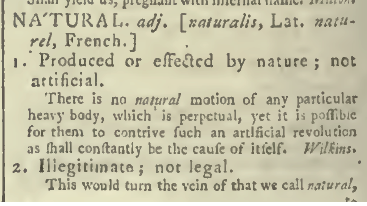
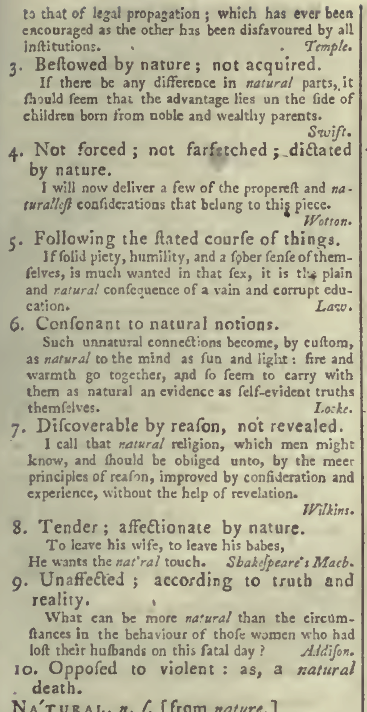
NATURAL adj. — 1785
3. Bestowed by nature; not acquired.
4. Not forced; not farfetched; dictated by nature.
7. Discoverable by reason. Not revealed.
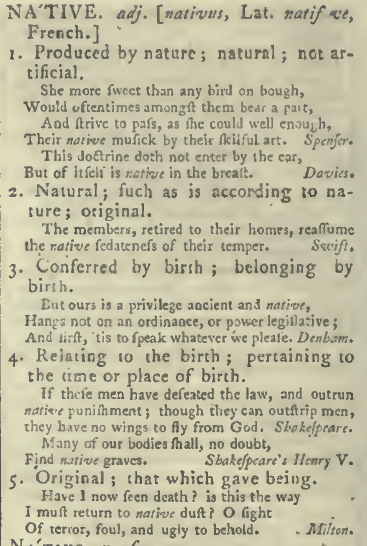
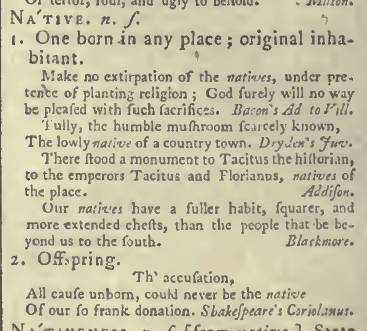
NATIVE adj. — 1785
1. Produced by nature; natural; not artificial.
4. Relating to the birth; pertaining to the time or place of birth.
The difference between native v. natural is noticeable.
Natural, definition #4 states; " Not forced; not farfetched; dictated by nature." The situation is forced when the expectant mother travels to a foreign country to give birth; primarily for a different citizenship than that of the mother. This forced situation would not qualify as a natural-born citizen.
Natural, definition #7 states; "Discoverable by reason. Not revealed." Reason dictates that the child would enjoy the same citizenship as the mother, at the very least. It must then be revealed that the child may have a different citizenship than either the mother or the father. Logic must reason that the above example is not a natural-born citizen.
Amendment 14 clarifies this in these words, "All persons born or naturalized in the United States, and subject to the jurisdiction thereof, are citizens of the United States and of the State wherein they reside."
The mother, as a foreigner, is not 'subject to' the united States Jurisdiction. The child, until it reaches the age of consent, remains under the parents' jurisdiction and cannot attain automatic citizenship through the criminal actions of the mother and or father.
Age of thirty five Years
In addition to the natural-born citizenship earlier, the age requirement also demands the presentation of a valid Certificate of Live Birth. On this, it will list the citizenship of the mother, at the very least, which will then, also be the citizenship of the child. Then, it also will show they time and date of birth.
fourteen Years a Resident within the United States
This is odd that it is not stated, consecutively prior to swearing into office. Why is this odd? Say the candidate lived with parents from age birth to 16. Then became a citizen of a foreign country. Came back to these united States of America, with dual citizenship and ran for President. Even if at 35 years of age, the Candidate will have lived in these united States less than in a foreign country. Where does this person loyalties most likely reside?
Certainly, the same questions should be asked of a candidate who, born of united States American citizens has lived in foreign countries their entire life, except for the fourteen years just prior to the election.
Unfortunately, we think of these as the only qualification to this office. Recent Trump-Trials bring out Amendment 14, Section 3; with:
No person shall be a Senator or Representative in Congress, or elector of President and Vice-President, or hold any office, civil or military, under the United States, or under any State, who, having previously taken an oath, as a member of Congress, or as an officer of the United States, or as a member of any State legislature, or as an executive or judicial officer of any State, to support the Constitution of the United States, shall have engaged in insurrection or rebellion against the same, or given aid or comfort to the enemies thereof. But Congress may by a vote of two-thirds of each House, remove such disability.
Yet, citizens who register to as voters almost never question the candidates concerning how their past actions as a government officer undermined The Constitution; which qualifies as a rebellion or insurrection against the same.
We also have Article 6:
This Constitution, and the Laws of the United States which shall be made in Pursuance thereof; and all Treaties made, or which shall be made, under the Authority of the United States, shall be the supreme Law of the Land; and the Judges in every State shall be bound thereby, any Thing in the Constitution or Laws of any State to the Contrary notwithstanding.
The Senators and Representatives before mentioned, and the Members of the several State Legislatures, and all executive and judicial Officers, both of the United States and of the several States, shall be bound by Oath or Affirmation, to support this Constitution; but no religious Test shall ever be required as a Qualification to any Office or public Trust under the United States.
Yet, citizens who register as voters almost never question the candidates concerning how their promises will either undermine or uphold The Constitution.
(K. Notes: This element deals with the resignation, death, disability, or removal of president or vice president from office.
Amendment 25, also covering the same aspects, has changed up who can declare whom unfit and how that person can challenge. Then, a "trial" so to speak takes place to determine inability for service or not.
The President shall, at stated Times, receive for his Services, a Compensation, which shall neither be encreased nor diminished during the Period for which he shall have been elected, and he shall not receive within that Period any other Emolument from the United States, or any of them.
(K. Notes: This should be simple enough. But, of late, there seems to be question about; What exactly is an Emolument?

EMOLUMENT n. s. — 1785
Profit; advantage.
Profit; advantage. If a President owns a business, before being elected; there is no requirement that the person sell off this asset before being sworn into office. With that said; if, as president, the business increases; because people feel there is somehow more future-value in the product or service provided by a President's business: Has the president received a Profit or advantage; or did the business?
First: We must separate the business from the owner. Either may continue without the other. If the candidate for president has an established compensation from the Business and that compensation or compensation-formula remains unchanged after being sworn into office; the business owner, now as President will not have received any profit or emolument from the business.
However; if in the process of doing business, marketing involves using the U.S. Presidency of the business owner to get new business; or even increasing fees charged, because of the presidency; these would be Profit or advantage as a result of the office of presidency —Thus emoluments.
Before he enter on the Execution of his Office, he shall take the following Oath or Affirmation:—"I do solemnly swear (or affirm) that I will faithfully execute the Office of President of the United States, and will to the best of my Ability, preserve, protect and defend the Constitution of the United States."
(K. Notes: In addition to this, as commander in Chief of the armed forces, the President is also bound to this oath: "I, _____, do solemnly swear (or affirm) that I will support and defend the Constitution of the United States against all enemies, foreign and domestic; that I will bear true faith and allegiance to the same." Which adds the phrase against all enemies, foreign and domestic; that I will bear true faith and allegiance to the same.
Section 2.
The President shall be Commander in Chief of the Army and Navy of the United States, and of the Militia of the several States, when called into the actual Service of the United States; he may require the Opinion, in writing, of the principal Officer in each of the executive Departments, upon any Subject relating to the Duties of their respective Offices, and he shall have Power to grant Reprieves and Pardons for Offences against the United States, except in Cases of Impeachment.
(K. Notes: "The President shall be Commander in Chief of the Army and Navy of the United States, and of the Militia of the several States, when called into the actual Service of the United States;"
There are four definable parts to this clause.
•The first part identifies The President as, Commander in Chief...
•The second identifies two of the nation's military establishments; The Army and the Navy...
•The third part identifies the Militia of the several States...
•The fourth part tells us when The President may exercise those powers. When called into the actual service of the united States, which would be the protection of the nation, as opposed to the protection of political interests of the nation's government.
When the nation is attacked by foreign countries, on our domestic soil, The President has the automatic power to defend the nation, on our domestic soil. Once the enemy has left the Domestic soil, the President needs the Congressional Declaration of War to pursue the enemy; as The President has done the initial requirement of getting the enemy out of our nation.
This may seem a weak position; but it is the Constitutional command.
In accord with The unanimous Declaration of the thirteen united States of America, the governed people cannot honorably grant to government the power of offensive wars. We know this fact from this clause in The Declaration "We must... hold them, as we hold the rest of mankind, Enemies in War, in Peace Friends."
With that, it might seem the Congressional Declaration of war as somewhat useless. This is not the case. The Congressional declaration of war would come into play when it comes to sending our military to the defense of an ally or another foreign country —that was unjustly attacked.
(K. Notes: "he may require the Opinion, in writing, of the principal Officer in each of the executive Departments, upon any Subject relating to the Duties of their respective Offices,"
Though the President may require the opinions, and in writing; the total responsibility for final decisions rests solely with the President.
There is nothing about this clause that prohibits a President from seeking opinions from other people, especially if time is not an issue.
(K. Notes: and he shall have Power to grant Reprieves and Pardons for Offences against the United States, except in Cases of Impeachment.
Generally, the Pardon seems to defeat the entire Rule of Law, when one person, for whatever reason, sees fit to pardon a person found guilty of crimes against the nation. However, if there is evidence of underhanded conviction, the Reprieve seems logical so that a trial on the misconduct may be heard. Then, if misconduct is found, the sentence ended and restitution made for the wrongful conviction.
The, "except in Cases of Impeachment" clause give rise to question the President Ford pardon of resigned President Nixon, after The House adopted the Impeachment Resolution on July 30, 1974.


IMPEACHMENT n. s. — 1785
2. Public accusation; charge preferred.
Once The House Adopted the Impeachment Resolution; The Impeachment has begun. The Impeachment is in progress. This prohibition, "except in Cases of Impeachment" means that Ford's Pardon of Nixon is invalid as it violates this Clause.
Article 1, Section 3, Clause 7 Impeachment Judgments: "Judgment in Cases of Impeachment shall not extend further than to removal from Office, and disqualification to hold and enjoy any Office of honor, Trust or Profit under the United States: but the Party convicted shall nevertheless be liable and subject to Indictment, Trial, Judgment and Punishment, according to Law."
With Art 1, Sec 3, Clause 7; it would not matter whether or not a President who is being impeached resigns or not. The final outcome of decisions are what change history. In the Nixon case, since the Impeachment stopped, he could have run for any office; possibly even for President again, since he served less than two full years of his second term. The Department of Justice could also have sought criminal charges, after the Senate impeachment Trial.
Unfortunately, many impeachment procedures are used as political tools, as opposed to defending The Constitution. If this were not true, the impeachment procedure would go the entire process to hold the individual accountable; and criminally accountable where applicable. The political tool evidences when the person being impeached either leaves office at end of term or resigns; at which time the impeachments process also ends.
He shall have Power, by and with the Advice and Consent of the Senate, to make Treaties, provided two thirds of the Senators present concur; and he shall nominate, and by and with the Advice and Consent of the Senate, shall appoint Ambassadors, other public Ministers and Consuls, Judges of the supreme Court, and all other Officers of the United States, whose Appointments are not herein otherwise provided for, and which shall be established by Law: but the Congress may by Law vest the Appointment of such inferior Officers, as they think proper, in the President alone, in the Courts of Law, or in the Heads of Departments.
(K. Notes: He shall have Power, by and with the Advice and Consent of the Senate, to make Treaties, provided two thirds of the Senators present concur;...
Treaties, being instruments that bind the nation, must be made in accord with the terms of The Declaration so as to prevent elements of potential tyranny and despotism.
Though in other section of this Constitution, it requires a minimum quorum and then a simple majority or super-majority to pass the item. Here, it only specifies that The President "shall have Power[...] to make Treaties, provided two thirds of the Senators present concur. Does this means that in underhanded activity, where a president might benefit hugely from a treaty that destroys the nation; that if only three Senators are present that this questionable treaty is legitimate?
One would hope that since treaties are part of the business of The Senate, there would have to be a minimum quorum, and then a specified majority of those present (as here 2/3) for it to pass.
(K. Notes: ...and he shall nominate, and by and with the Advice and Consent of the Senate, shall appoint Ambassadors, other public Ministers and Consuls, Judges of the supreme Court, and all other Officers of the United States, whose Appointments are not herein otherwise provided for, and which shall be established by Law:...
This, being a separate clause from the previous; does this still hold to the two-thirds present; or does this hold to the minimum quorum and a specified minimum majority to do business?
For consistency, we must expect that the initially established minimum quorum of a majority of the total body, as in Article 1, be present; and then some specified majority of the total body be necessary for an action to succeed. Without these minimums, the gates of tyranny and despotism open wide, allowing ever-smaller groups of the total body to assemble for special interest activity.
(K. Notes: ...but the Congress may by Law vest the Appointment of such inferior Officers, as they think proper, in the President alone, in the Courts of Law, or in the Heads of Departments.
Basically? Any office not specified by the Constitution, Congress may delegate which of the three entities listed get to appoint those officers.
NOTE: The creation of those Offices must be in accord with The Constitution or it becomes just another act of Tyranny and Despotism as detailed in The Declaration, with this grievance, "erected a multitude of New Offices, and sent hither swarms of Officers to harass our people, and eat out their substance."
The President shall have Power to fill up all Vacancies that may happen during the Recess of the Senate, by granting Commissions which shall expire at the End of their next Session.
(K. Notes: This seems to have been presumed to apply to Senate vacancies. However, this applies to all offices, agencies, department heads, and such. These are temporary fillings. When Congress, the Senate reconvenes, those positions are filled in the standard process and take effect at the close of that session of the Senate/Congress.
Section 3.
He shall from time to time give to the Congress Information of the State of the Union, and recommend to their Consideration such Measures as he shall judge necessary and expedient; he may, on extraordinary Occasions, convene both Houses, or either of them, and in Case of Disagreement between them, with Respect to the Time of Adjournment, he may adjourn them to such Time as he shall think proper; he shall receive Ambassadors and other public Ministers; he shall take Care that the Laws be faithfully executed, and shall Commission all the Officers of the United States.
(K. Notes: He shall from time to time give to the Congress Information of the State of the Union,...
Nothing about this says that it must be done in person, or that it is prohibited in person. Apparently, it would have to be done in writing, at the very least, so there will be a written record; though in-person, television, radio, etc. all can be transcribed for the Record
This is where the President might state what is working and what is not. As well as new areas of concern.
(K. Notes: ...and recommend to their Consideration such Measures as he shall judge necessary and expedient;
This must be where presidential candidates get the, "I'm going to pass or get passed this or that legislation". This is merely a means for presidents to recommend to Congress those things and issues they should address.
(K. Notes: ... he may, on extraordinary Occasions, convene both Houses, or either of them,...
However, if there are emergency situations, the President may assemble Congress and address those issues at any time.
(K. Notes: ...and in Case of Disagreement between them, with Respect to the Time of Adjournment, he may adjourn them to such Time as he shall think proper; ...
This could be construed that a President might permanently adjourn Congress, if ever this duty came to the office of President to decide. However, The Constitution, Article 1, Section 4, requires that Congress meet at least once every year.
(K. Notes: ...he shall receive Ambassadors and other public Ministers;...
The President, according to this, is the nation's Representative to the "world", at least to other foreign countries and domestic states and territories.
(K. Notes: ...he shall take Care that the Laws be faithfully executed,...
This clause cannot be seen to contradict, in any manner what so ever, the swearing in Oath that states, "I do solemnly swear (or affirm) that I will faithfully execute the Office of President of the United States, and will to the best of my Ability, preserve, protect and defend the Constitution of the United States."
When a President knows that a law or bill or department was passed or created before their administration; that president is duty-bound by oath to The Constitution to not execute those laws. In fact, this flows through the military and police forces as EXECUTIVE Enforcement Officers. In such instances, it is the Executive Branch to see to it that those unconstitutional legislative actions be amendment to become constitutional, or repealed to make certain they are no longer enforced.
(K. Notes: ...and shall Commission all the Officers of the United States.
The difference between Appoint and Commission. The 1785 definitions below do not seem to really clear this up.

Appointer n. s. — 1785
He that settles or fixes any thing or place.
(K. Notes:
COMMISSION — 1785

COMMISSION n. s. — 1785
1. The act of entrusting any thing.
2. A Trust; a warrant by which any trust is held, or authority exercised.
3. A warrant by which a military officer is constituted.
4. Charge; mandate; office; employment
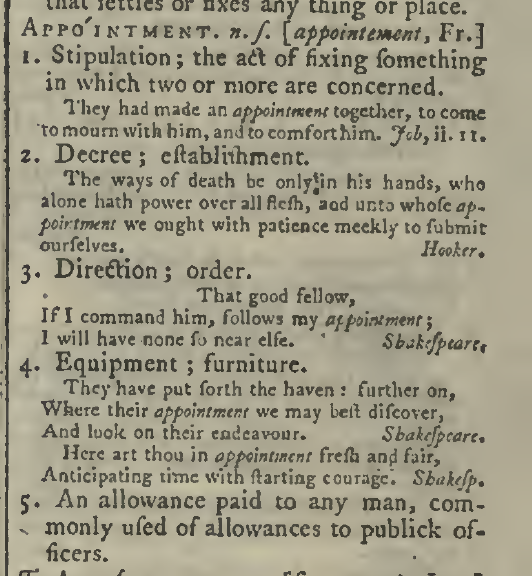
APPOINTMENT n. s. — 1785
2. Decree; establishment.
3. Direction; order.
5. An allowance paid to any man, commonly used of allowances to publick officers.
Two primary points of interest with this short clause, "Commission all the Officers of the United States". The first is that this does not specifically include or exclude military officers, but clearly states, "all the Officers of the United States".
Article 1, Section 8, Clause 16: "To provide for organizing, arming, and disciplining, the Militia, and for governing such Part of them as may be employed in the Service of the United States, reserving to the States respectively, the Appointment of the Officers, and the Authority of training the Militia according to the discipline prescribed by Congress;"
The President, since not responsible for selecting all the officers; this means that the President is to make certain that each new person properly comprehends the duties of their office.
Section 4.
The President, Vice President and all civil Officers of the United States, shall be removed from Office on Impeachment for, and Conviction of, Treason, Bribery, or other high Crimes and Misdemeanors.
(K. Notes: The violation of a law is a crime, no matter the law. The violation of The Supreme Law of the Land is a high Crime. It also qualifies as treason, in the levying of a political war against withstanders.


WAR n. s. — 1785
1. War may be defined the exercise of violence under sovereign command against withstanders; force, authority, and resistance, being the essential parts thereof. Violence, limited by authority, is sufficiently distinguished from robbery, and the like outrages; yet, in consisting in relation towards others, it necessarily requires a supposition of resistance, whereby the force of war becomes different from the violence inflicted upon slaves or yielding malefactors.
4. The profession of arms.
5. Hostility; state of opposition; act of opposition.
Congress has established the penalty for Treason, in TITLE 18; PART I; CHAPTER 115; Section 2381. Treason; which states: "Whoever, owing allegiance to the United States, levies war against them or adheres to their enemies, giving them aid and comfort within the United States or elsewhere, is guilty of treason and shall suffer death, or shall be imprisoned not less than five years and fined under this title but not less than $10,000; and shall be incapable of holding any office under the United States."
Also: §2382. Misprision of treason; states: "Whoever, owing allegiance to the United States and having knowledge of the commission of any treason against them, conceals and does not, as soon as may be, disclose and make known the same to the President or to some judge of the United States, or to the governor or to some judge or justice of a particular State, is guilty of misprision of treason and shall be fined under this title or imprisoned not more than seven years, or both."
§2383. Rebellion or insurrection, which states; "Whoever incites, sets on foot, assists, or engages in any rebellion or insurrection against the [Constitutionally Lawful] authority of the United States or the laws thereof, or gives aid or comfort thereto, shall be fined under this title or imprisoned not more than ten years, or both; and shall be incapable of holding any office under the United States."
§2384. Seditious conspiracy; which states: "If two or more persons in any State or Territory, or in any place subject to the jurisdiction of the United States, conspire to overthrow, put down, or to destroy by force the Government of the United States, or to levy war against them, or to oppose by force the [Constitutionally Lawful] authority thereof, or by force to prevent, hinder, or delay the execution of any law of the United States, or by force to seize, take, or possess any property of the United States contrary to the [Constitutionally Lawful] authority thereof, they shall each be fined under this title or imprisoned not more than twenty years, or both."
"§2385. Advocating overthrow of Government, which states: "Whoever knowingly or willfully advocates, abets, advises, or teaches the duty, necessity, desirability, or propriety of overthrowing or destroying the government of the United States or the government of any State, Territory, District or Possession thereof, or the government of any political subdivision therein, by force or violence, or by the assassination of any officer of any such government; or
Whoever, with intent to cause the overthrow or destruction of any such government, prints, publishes, edits, issues, circulates, sells, distributes, or publicly displays any written or printed matter advocating, advising, or teaching the duty, necessity, desirability, or propriety of overthrowing or destroying any government in the United States by force or violence, or attempts to do so; or
Whoever organizes or helps or attempts to organize any society, group, or assembly of persons who teach, advocate, or encourage the overthrow or destruction of any such government by force or violence; or becomes or is a member of, or affiliates with, any such society, group, or assembly of persons, knowing the purposes thereof—
Shall be fined under this title or imprisoned not more than twenty years, or both, and shall be ineligible for employment by the United States or any department or agency thereof, for the five years next following his conviction.
If two or more persons conspire to commit any offense named in this section, each shall be fined under this title or imprisoned not more than twenty years, or both, and shall be ineligible for employment by the United States or any department or agency thereof, for the five years next following his conviction.
As used in this section, the terms "organizes" and "organize", with respect to any society, group, or assembly of persons, include the recruiting of new members, the forming of new units, and the regrouping or expansion of existing clubs, classes, and other units of such society, group, or assembly of persons.
It is odd, but out own government officers have and are violating each of those Laws, in addition to The Constitution, which is the Lawful Authority over government. They have and still use violence against people who resist their unconstitutional activity. The government of the United States is The Constitution of the United States of America, not the building, not the people in office. We, the citizens and registered voters must ENFORCE The Constitution's Rule of Law upon our government officers, as is our DUTY!
When we FEAR the government or its officers; the government and those officers have already won. Let us not let that happen again.
Section 1.
The judicial Power of the United States, shall be vested in one supreme Court, and in such inferior Courts as the Congress may from time to time ordain and establish. The Judges, both of the supreme and inferior Courts, shall hold their Offices during good Behaviour, and shall, at stated Times, receive for their Services, a Compensation, which shall not be diminished during their Continuance in Office.
(K. Notes: The part most interesting here is this clause on the term limits of the judges: The Judges, both of the supreme and inferior Courts, shall hold their Offices during good Behaviour... Now, we need to know: What is good behaviour?
The definitions for GOOD from 1785 are quite lengthy.
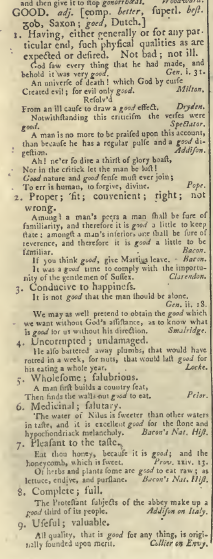




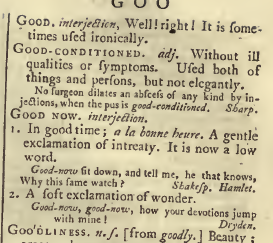
GOOD adj.
1. Having, either generally or for any particular end, such physical qualities as are expected or desired. Not bad; not ill.
2. Proper; fit; convenient; right; not wrong.
4. Uncorrupted; undamaged.
13. Honourable.
GOOD n.s.
1. That which physically contributes to happiness, benefit; advantage; the contrary to evil or misery.
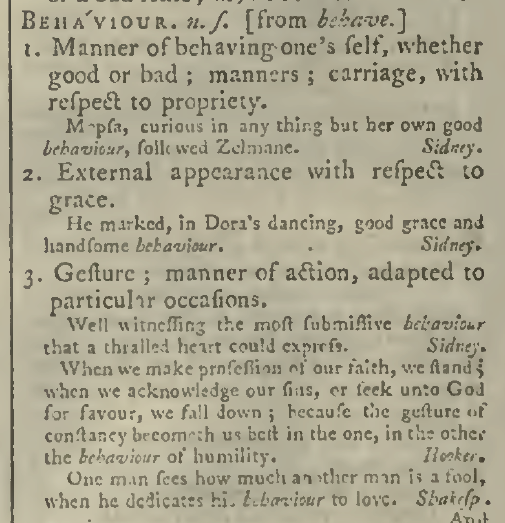
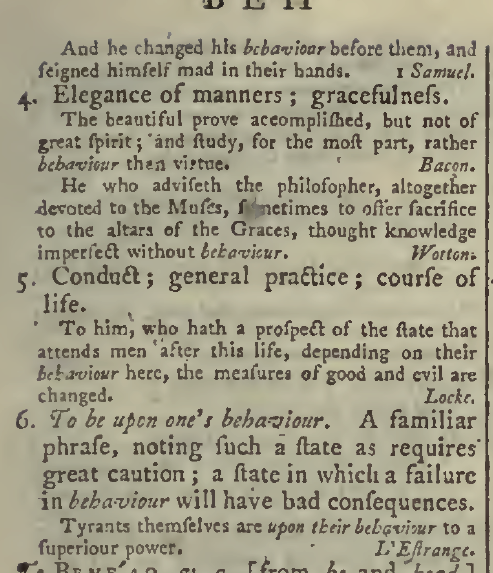
BEHAVIOUR adj.
1. Manner of behaving one's self, whether good or bad; manners; carriage, with respect to propriety.
5. Conduct; general practice; course of life.
6. To be on one's behaviour. A familiar phrase, noting such a state as requires great caution; a state in which a failure in behaviour will have bad consequences.
When it comes to The Constitution and government officers and their oath to support and defend The Constitution of the United States of America; their behavior must be measured against the preservation of the people's rights, constitutional authority, as well as whether they have respect for the general laws as they expect of the average citizen.
Especially, the repeated violation of the general laws and or any violation of The Supreme Law of the Land is certainly —BAD behaviour
Section 2.
The judicial Power shall extend to all Cases, in Law and Equity, arising under this Constitution, the Laws of the United States, and Treaties made, or which shall be made, under their [Constitutionally Lawful] Authority; —to all Cases affecting Ambassadors, other public Ministers and Consuls; —to all Cases of admiralty and maritime Jurisdiction; —to Controversies to which the United States shall be a Party; —to Controversies between two or more States; — [between a State and Citizens of another State,] (go to: Amendment 11) —between Citizens of different States, —between Citizens of the same State claiming Lands under Grants of different States, [and between a State, or the Citizens thereof, and foreign States, Citizens or Subjects.] (go to: Amendment 11)
(K. Notes: The judicial Power shall extend
We know this paragraph does not apply solely to the United States supreme Court or only to the Federal Court System.
The judicial Power is present in every community (city, county, state, nation) that has any government court at all (district, superior, supreme, etc.
In the next paragraph of this Article, we see that the supreme Court has; "In all the other Cases before mentioned, the supreme Court shall have appellate Jurisdiction, both as to Law and Fact, with such Exceptions, and under such Regulations as the Congress shall make."
to all Cases, in Law and Equity, arising under this Constitution, the Laws of the United States, and Treaties made, or which shall be made, under their [Constitutionally Lawful] Authority;
Article 6 has this extending from Nation's court into every court in the land (city, county, state, federal) as they all are required to swear oath to support and defend This Constitution.
Nearly every law and act of government touches one of the citizen's rights. With this, Amendment 9 applies to all the rights not listed; as well as to all the rights that are listed. With this, nearly every case arises under This Constitution —especially cases of Law.
The emphasis of [Constitutionally Lawful] is added to the phrase, "under their Authority", so as to avoid confusion about their [Constitutionally Lawful] Authority; and that of the unconstitutional authority frequently exercised by government.
—to all Cases affecting Ambassadors, other public Ministers and Consuls;
This would include cases where any of the mentioned parties is accused, tried, and possibly convicted of any crime from parking to mass-murder, etc. within these united States of America. Congress has no constitutional authority to exempt any person, foreign or domestic regardless of rank or nobility from the protection or penalty of the law. We know this because of Amendment 14's clause; "Equal protection under the law.
Protection goes both ways. One, if the person is the accused, the protection is that their rights are not violated to get a guilty plea or verdict. The other is if they are the victim so that the person who committed a crime against them is not set free because of some plea deal, rank or royalty, or other political and unconstitutional government acts that exempt certain people (foreign or domestic) from being held accountable for violating our laws and our citizens.
—to all Cases of admiralty and maritime Jurisdiction;
These involve cases that happen on open water, not a possession of any country. All water, seen to be under "The United States of America", the government's management, would actually not fall under maritime or admiralty law. The united States water-covered land masses have the same courts as all other non-water covered land masses.
Admiralty and maritime law would not take effect until the ship or boat or person passes the 12 nautical miles marker from "shore"; except when that 12 miles encroaches upon a foreign country's water-covered land.
To assume that this admiralty and maritime jurisdiction covers all bodies of land covered by water, for any length of time, might, by some tyrant, extend to include standing water on your land after a rain, or your private lake or ponds.
—to Controversies to which the United States shall be a Party;
When it comes to the law, the people's rights, and This Constitution; The United States is automatically a party by oath to support and defend This Constitution.
—to Controversies between two or more States;
— [between a State and Citizens of another State,] (go to: Amendment 11)
Amendment XI: Passed by Congress March 4, 1794. Ratified February 7, 1795. "The Judicial power of the United States shall not be construed to extend to any suit in law or equity, commenced or prosecuted against one of the United States by Citizens of another State, or by Citizens or Subjects of any Foreign State."
This would be that the Federal Courts are not the court of Original Jurisdiction; but as seen in the next paragraph of this Article, they are the appellate jurisdiction.
Otherwise, this prohibits the citizens of one state from bringing suit against another state. If so, there can be no justice. Where does a person seek justice when such a State violates The Constitution and or the rights of a citizen of a different State?
However, when the next paragraph states, "... with such Exceptions, and under such Regulations as the Congress shall make."
Now, we get into another problem. Can Congress honorably exclude certain types of cases from being heard in the courts and restrict other cases so as to not allow a citizen or foreign visitor to prosecute a state or other government entity for Constitutional Violations? To allow such government actions would defeat the entire purpose for The Constitution's limited government that protects the people's rights.
Recently, it was decided by the US supreme Court that a citizen from one state did not have standing to sue another state that supposedly violated their own election laws in a US Presidential election. The elections of all Congress members and President are the concerns of all citizens, regardless of state. The reason for this is that all members of Congress pass laws that affect the lives of people throughout the nation. As for the President, this is the only nationally elected office; so if one state violates their own election laws, that violation most likely will alter the election results to favor a different candidate.
Otherwise, for the city, county, and state election of one state, the citizen of another state would have far less standing; but would still have standing in accord with The Declaration which binds all citizens to come to the aid of other citizens when their rights are unjustly attacked. This is known by the pledge among united States Americans, at the end of The Declaration and signed by their respective Representatives on their behalf.
—between Citizens of different States,
This allows suits between citizens of different states; but previously excluded suits against a state by a citizens from another state. These types of clauses tend to work more unjust power into favor government.
—between Citizens of the same State claiming Lands under Grants of different States,
[and between a State, or the Citizens thereof, and foreign States, Citizens or Subjects.] (go to: Amendment 11)
In all Cases affecting Ambassadors, other public Ministers and Consuls, and those in which a State shall be Party, the supreme Court shall have original Jurisdiction. In all the other Cases before mentioned, the supreme Court shall have appellate Jurisdiction, both as to Law and Fact, with such Exceptions, and under such Regulations as the Congress shall make.
(K. Notes: "... the supreme Court shall have appellate Jurisdiction, both as to Law and Fact..." simply means that every court (city, county, state, federal) has original jurisdiction as to Law and Fact.
Here is where a lot of judicial misconduct happens with legislators, police, lawyers (defense and prosecution), as well as judges. In nearly every criminal prosecution, the judge only wants to know whether the accused violated the law for which they are prosecuted. This ignores the entire other side of the equation. The Law.
Before the facts are to be tried; the law in question must be out on trial to determine if it is made in pursuance to The Constitution of the United States of America as Article 6 of this Constitution demands. If the law, as it is written, by definition at the time just prior to its writing, violates some element of The Constitution of the United States of America, as it is written, by definition at the time just prior to its writing; it is the Law that is the crime and the person accused of violating that law must be set free without a trial regarding the facts. For the accused only exercised a protected right (usually Amendments 2, 4, 5, or 9.)
When the law is the crime, the court is duty bound to hold the Executive and Legislative branches accountable for passing (or not repealing) and enforcing an unconstitutional law. In this manner, many laws are removed from the book; no longer enforced to allow police to focus on the more violent and other rights-violating activity; and the courts are no longer plugged up with large volumes of unconstitutional law cases against innocent persons.
We must remember that Congress cannot establish any rule, exception, or regulation that infringes upon any right that the people possess; no matter how well-intended those congressional actions may seem. There is an Article 5 amendment process for granting that authority.
The Trial of all Crimes, except in Cases of Impeachment, shall be by Jury; and such Trial shall be held in the State where the said Crimes shall have been committed; but when not committed within any State, the Trial shall be at such Place or Places as the Congress may by Law have directed.
(K. Notes: The Trial of all Crimes, except in Cases of Impeachment, shall be by Jury;
Amendment 6 somewhat altered this by not allowing any exceptions in any type of criminal activity. As with Amendment 6, the all here does not exclude any type of crime no matter how minor (misdemeanors or offenses).
and such Trial shall be held in the State where the said Crimes shall have been committed;
Amendment 6 somewhat altered this by changing the word state to state and district.
but when not committed within any State, the Trial shall be at such Place or Places as the Congress may by Law have directed.
Section 3.
Treason against the United States, shall consist only in levying War against them, or in adhering to their Enemies, giving them Aid and Comfort. No Person shall be convicted of Treason unless on the Testimony of two Witnesses to the same overt Act, or on Confession in open Court.
(K. Notes: Ordinarily, this should be a rather short section. We define a few terms from 1785 (Treason, levying, War, Adhering, Aid, Comfort, and Overt. However, having stumbled upon United States Code TITLE 18; PART I; CHAPTER 115; Sections 2381 through 2390; this is going to take a little more time. So: We start with the short path first, the definitions.
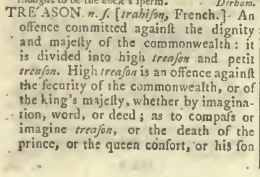
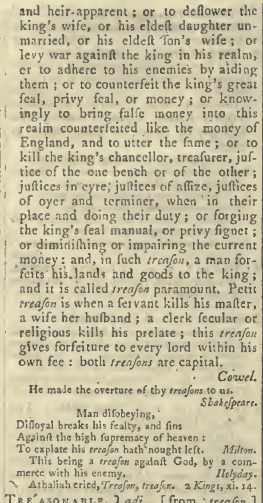
TREASON — 1785
An offense committed against the dignity and majesty of the commonwealth: it is divided into high treason and petit treason. High treason is an offence against the security of the commonwealth.... Petit treason is when a servant kills his master.....
(K. Notes: We can see a bit of clarification in The Constitution's definition for treason, as opposed to here. When the contract specifically defines a word, it is the contract's definition that must be used. But let's play with this for a paragraph or two.
With a monarchy, dictatorship, or even a tyranny; the "dignity and majesty of the commonwealth" would be considered the king/queen, dictator, or tyrant. However, with a Democratically Sovereign Authority, that delegates certain limited powers to a Republican form of Government; —the dignity of the "commonwealth", the state, would be (from the least to the greatest Authority) the standing constitution, then the contract among the sovereign-body, then the body that holds the Sovereign Authority & Power that they may delegate to others to exercise in their name and by their authority.
In these united States of America, that reverse order from the newest to the source starts with The Constitution of the United States of America, then The unanimous Declaration of the united States of America, then to the body of registered voters, and finally the body of citizens who may act in the manner of a limited Direct Democracy for granting powers to government.
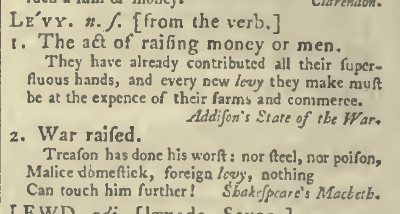
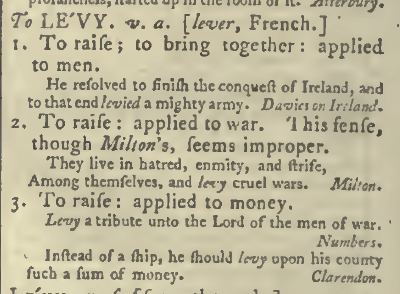
To LEVY — 1785
1. The act of raising money or men.
2. War raised.
To LEVY — 1785
1. To raise; to bring together: applied to men.
2. To raise: applied to war.
3. To raise: applied to money.
(K. Notes: This requires defining the term raise.



To RAISE — 1785
8. To advance; to promote; to prefer.
9. To excite; to put into action.
10. To excite to war or tumult; to stir up.
11. To rouse; to stir up.
13. To bring into being.
16. To occasion; to begin.
20. To give rise to.
(K. Notes: To levy war is to prefer war, to promote war, to advance war, to put [war] into action.
Now, all we have to do is properly define: What is War.


WAR — 1785
1. War may be defined the exercise of violence under sovereign command against withstanders; force, authority, and resistance, being the essential parts thereof. Violence, limited by authority, is sufficiently distinguished from robbery, and the like outrages; yet, in consisting in relation towards others, it necessarily requires a supposition of resistance, whereby the force of war becomes different from the violence inflicted upon slaves or yielding malefactors.
4. The profession of arms.
5. Hostility; state of opposition; act of opposition.
(K. Notes: Most people are familiar with the guns and bombs of wars, as well as the killing that they deliver. However, there is a part of wars that are not as frequently seen or thought about. These, tend to become what are referred to as Civil Wars; wars between two or more factions within the same country. This can be the people against the government; as was the case in 1776 that gave birth to these united States of America (This, being a British Civil War). Other, not even a civil war at all, it taught by the victors that it was the Civil War of the 1860's between "The United States of America" (the government) and The Confederate States of America (states that once belonged to these united States of America, but seceded before the war started; thus, not a civil war.
From the 1785 definition for WAR, we have, "1. War may be defined the exercise of violence under sovereign command against withstanders; force, authority, and resistance, being the essential parts thereof." And then "5. Hostility; state of opposition; act of opposition."
When armed police officers enforce unconstitutional laws and armed military carry out unconstitutional orders; we have the sovereign command (legislators and presidents); we have the force (police and military; and we have the withstanders (citizens, when domestic; or foreigners when on their soils). The withstanders also include The Constitution that is supposed to control or limits the exercise of unjust government people; and we have The Declaration which is supposed to limit the types of powers the people may grant to their government or allow their government to exercise.
With the definitions for war, levy, and raise; the government officers are are advancing, promoting, as preference of war, rather than that of peace when they pass laws that unconstitutionally violate the citizen's rights.
The government officers excite and put into action the very elements necessary for war by constantly attacking, by way of unjust and unconstitutional government activity; eventually the citizens must exercise our retained rights detailed in The Declaration to alter, to abolish, or to throw off those FORMS of government that no longer equally everyone's rights. Unfortunately, our government, as evidenced below with the 9 or so Sections of the US Code have turned it around against the citizens who may try those very things; and our government now calls those patriotic citizens a traitor for not simply complying with the Constitutionally defined treasonous acts of government.
The other definition of "To RAISE" further the evidence that the government is exciting WAR between the citizens and the government when the government, stirs up the people towards war; brings these types of war into being, and gives rise to the first shots of war.
A casual observer from the outside, or a well informed observer from the inside; would rightly claim that this blood bath war has already started when one looks at the extremely high rate of citizens in jails and prisons for having done nothing worse than violate easily-proved unconstitutional laws, if The Constitution were allowed in the courts to prove the law violates The Constitution of the United States of America.

ADHERE — 1785
1. To stick to; as, wax to the finger; with to before the thing.
2. To stick, in the figurative sense; to be consistent; to hold together.
3. To remain firmly fixed to a party, person, or opinion.
(K. Notes: "To remain firmly fixed to a party, person, or opinion." When police enforce laws that they are supposed to know are unconstitutional, as the police have sworn oath to support and defend The Constitution; the only way the police can do that is to KNOW when a law violates The Constitution and bring the legislators and executive officers who passed and signed off on it to trial for violating the SUPREME LAW OF THE LAND, The Constitution; thus committing treason by adhering to the people or opinions of those who passed and authorized the enforcement.
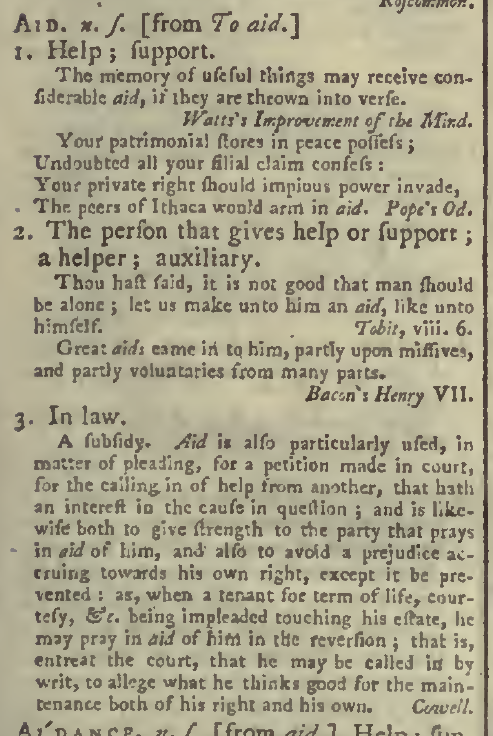
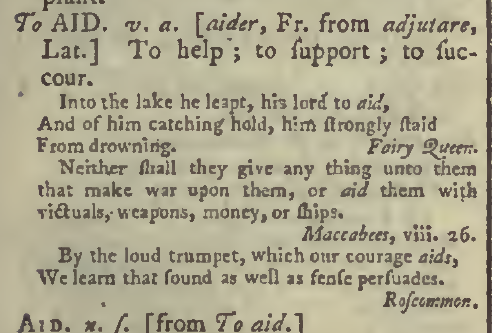
AID — 1785
1. Help; support.
2. The person that gives help to support; a helper; auxiliary.
3. (in law. A subsidy. Aid is also particularly used, in matter of pleading, for a petition made in court, for the calling in of help form another, that hath an interest in the cause in question; and is likewise both to give strength to the party that prays in aid of him, and also to avoid a prejudice accruing towards his own right, except it be prevented: as, when a tenant for term of life, courtesy, &c. being impleaded touching his estate, he may pray in aid of him in the reversion; that is, entreat the court, that he may be called in by writ, to allege what he thinks good for the maintenance both of his right and his own.
To AID — 1785
To help; to support; to sucour.
(K. Notes: AID, help and support, from those who swore oath to support and defend The Constitution, also happens then these people under oath to The Constitution —do nothing.
But what is nothing? We see this nothing with the military, which generally does not enforce civilian laws, and worse yet, does not hold politicians accountable for passing unconstitutional laws. With the police, on the other hand, they actively give aid and comfort to the legislators who passed the unconstitutional laws; first by enforcing them, and second by not filing charges against them for high crimes against these united States of America for violating The Constitution.
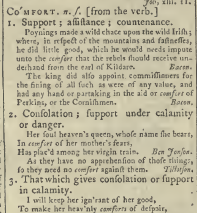
COMFORT — 1785
1. Support; assistance; countenance.
2. Consolation; support under calamity or danger.
3. That which gives consolation or support in calamity.
(K. Notes: AS mentioned under AID, the police and military actions of enforcing unconstitutional laws and obeying unconstitutional orders falls also under active support for the levied war from the legislators and other executive officers. Such was seen at the US Capitol building on Jan 6th with seeming danger the law enforcement agencies all sided with the legislators who passed unconstitutional laws. Granted, the civilians entering the Capitol Building should have had better leadership and organization; if their intent was in fact to put a stop to the unconstitutional government actions.
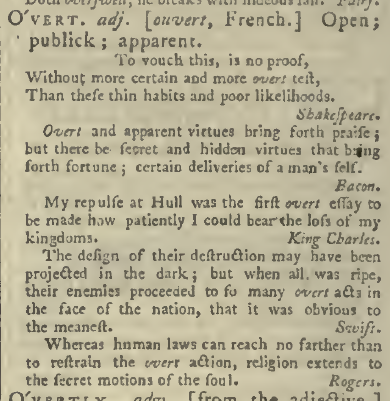

OVERT — 1785
Open; publick; apparent.
OVERTLY — 1785
Openly
(K. Notes: When the legislators pass; the executive enforces, and the judicial sentences innocent people for having violated unconstitutional government laws and unconstitutional government orders; this all is generally done in an overt manner in that it is generally witnessed by the public and or the constitution-violators have kept audio, video, and or written records of their unconstitutional actions.
Now, we look at Congressionally passed Code regarding the Treason subject to see whether they unconstitutionally expand or change the definition for treason.
United States Code TITLE 18; PART I; CHAPTER 115 was copied from
uscode.house.gov
as of Feb 05, 2024. The historical notes and histories type details not included.
Sec.
§2381. Treason.
§2382. Misprision of treason.
§2383. Rebellion or insurrection.
§2384. Seditious conspiracy.
§2385. Advocating overthrow of Government.
§2386. Registration of certain organizations.
§2387. Activities affecting armed forces generally.
§2388. Activities affecting armed forces during war.
§2389. Recruiting for service against United States.
§2390. Enlistment to serve against United States.
Whoever, owing allegiance to the United States, levies war against them or adheres to their enemies, giving them aid and comfort within the United States or elsewhere, is guilty of treason and shall suffer death, or shall be imprisoned not less than five years and fined under this title but not less than $10,000; and shall be incapable of holding any office under the United States.
(K. Notes: Whoever, owing allegiance to the United States, levies war against them or adheres to their enemies, giving them aid and comfort within the United States or elsewhere, is guilty of treason and shall suffer death, or shall be imprisoned not less than five years and fined under this title but not less than $10,000; and shall be incapable of holding any office under the United States. No Person shall be convicted of Treason unless on the Testimony of two Witnesses to the same overt Act, or on Confession in open Court.
The text in red was added, supposing for clarity, since foreign person cannot commit treason against these united States of America. However, a citizen or non-citizen, having sworn oath and owing allegiance to these united States of America, by way of their oath to The Constitution of the United States of America.
It must be stated here, in light of the 2024 hearings regarding Mr. Trump (former President) and his ballot access in the States. The courts seem to have mistakenly ruled that the Secretary of States may keep a candidate for office off the ballot, merely if that Secretary of State assumes that the candidate participated in a rebellion, insurrection, or violated their oath to The Constitution. Rebellion, insurrection, and treason are Constitutionally codified criminal activity. No place in The Constitution does it exempt or exclude any criminal prosecution from trial by an impartial jury.
The text in purple is what Congress forgot to put in; which, if only this Section of the Code were adhered to, a treason conviction might happen with only one witness; or because of a public statement concerning some treason, which is not repeated in open court.
The penalties, in red, in the above paragraph would be the only Constitutional part of this Code Section, even though the other parts seem merely to clarify. The unfortunate aspect of clarification clauses no matter how accurate they may be, the act alone is an unauthorized amendment procedure. Such unauthorized amendment procedures often work to violate the rights of citizens and they themselves become acts of treason against the united States of America, by way of violating their sovereign authority of The Constitution.
Whoever, owing allegiance to the United States and having knowledge of the commission of any treason against them, conceals and does not, as soon as may be, disclose and make known the same to the President or to some judge of the United States, or to the governor or to some judge or justice of a particular State, is guilty of misprision of treason and shall be fined under this title or imprisoned not more than seven years, or both.
(K. Notes: When we take into account the often stated government quotes that, "ignorance of the law is no excuse for violating the law"; it must be presumed that every person who, having sworn oath to support and defend The Constitution knows how to recognize violations against The Constitution and that they know how to bring those people accused to trial for that treason against The Constitution.
On the other hand, based solely on how this US Code Section is worded; this is an act of giving aid and comfort to the enemy; by doing nothing to hold the treasonous persons accountable. In this aspect, Congress as separated an element of Constitutionally Defined Treason and unconstitutionally amended its name, claiming that this part of treason is more acceptable and less dangerous.
The founding generation recognized that this form of treason is perhaps the worst. The worst, in that it allows the other form of treason to get progressively worse against the citizens. It is this form of treason that should hold the harshest of punishment as it is this form of treason that can stop the other form of treason before it causes as much damage as it usually does.
Whoever incites, sets on foot, assists, or engages in any rebellion or insurrection against the authority of the United States or the laws thereof, or gives aid or comfort thereto, shall be fined under this title or imprisoned not more than ten years, or both; and shall be incapable of holding any office under the United States.
(K. Notes: This is where Congress has turned the tables of justice against the citizens... again.
We start with The Constitution, Amendment 14, Section 3, which states, with emphasis added: ""No person shall be a Senator or Representative in Congress, or elector of President and Vice-President, or hold any office, civil or military, under the United States, or under any State, who, having previously taken an oath, as a member of Congress, or as an officer of the United States, or as a member of any State legislature, or as an executive or judicial officer of any State, to support the Constitution of the United States, shall have engaged in insurrection or rebellion against the same, or given aid or comfort to the enemies thereof. But Congress may by a vote of two-thirds of each House, remove such disability."
Congress' most treasonous aspect of this US Code section is this statement, or the laws thereof, or gives aid or comfort thereto. What Congress as done, has equated themselves with The Constitution under which they are supposed to serve; as many of the laws they pass violate The Constitution.
Then, where The Constitution insists that the person must have engaged in a rebellion or insurrection against The Constitution, Congress has added the incite, sets foot, and assists to it. They have, once again, amended The Constitution without an Article 5 Process; which by itself is an act of tyranny and despotism; the levying of war against these united States of America.
It is the duty of every citizen to resist and to do everything in their power to put down. and to throw off unconstitutional actions of government; such as, but not limited to unconstitutional laws from Congress.
Rebellion and insurrection here, has a potentially harsher sentence than misprision of treason and treason. Though, imprisoned not less than 5 years for treason, this demands a maximum sentence of 10 years; where The Constitution, in Amendment 14, Section 3, only authorizes the inability to hold office or trust under the United States.
If two or more persons in any State or Territory, or in any place subject to the jurisdiction of the United States, conspire to overthrow, put down, or to destroy by force the Government of the United States, or to levy war against them, or to oppose by force the authority thereof, or by force to prevent, hinder, or delay the execution of any law of the United States, or by force to seize, take, or possess any property of the United States contrary to the authority thereof, they shall each be fined under this title or imprisoned not more than twenty years, or both.
(K. Notes: Each of these clearly lesser crimes are holding more harsh sentences. Here it is up to 20 years imprisonment. The really odd thing here is this statement from The Declaration, which is still binding upon the citizens: " "That whenever any Form of Government becomes destructive of these ends, it is the Right of the People to alter or to abolish it, and to institute new Government...." and then, later states, "...But when a long train of abuses and usurpations, pursuing invariably the same Object evinces a design to reduce them under absolute Despotism, it is their right, it is their duty, to throw off such Government, and to provide new Guards for their future security.-".
We see that from The Declaration, it is not only the people's right, but it is their DUTY to "put down", abolish, throw off, or alter any form of government that no longer secures to secure and protect the peoples' rights.
The government officers are nothing more than mere employees of government. They are not THE government. The Government FORM and BODY is The Constitution of the United States of America, as seen in The Constitution, Article 4, Section 4.
WHEN government officers violate their oath to The Constitution, it is the DUTY of the citizens to put a stop to those government officers in any way necessary. Amendment 1, provides for petitioning government for them to stop violating The Constitution. But, as the people of 1776 experienced, we too receive even more injury from government in the form of more strict laws invading our rights. Those unconstitutional laws have turned innocent citizens into jail and prison inmates.
Whoever knowingly or willfully advocates, abets, advises, or teaches the duty, necessity, desirability, or propriety of overthrowing or destroying the government of the United States or the government of any State, Territory, District or Possession thereof, or the government of any political subdivision therein, by force or violence, or by the assassination of any officer of any such government; or
Whoever, with intent to cause the overthrow or destruction of any such government, prints, publishes, edits, issues, circulates, sells, distributes, or publicly displays any written or printed matter advocating, advising, or teaching the duty, necessity, desirability, or propriety of overthrowing or destroying any government in the United States by force or violence, or attempts to do so; or
Whoever organizes or helps or attempts to organize any society, group, or assembly of persons who teach, advocate, or encourage the overthrow or destruction of any such government by force or violence; or becomes or is a member of, or affiliates with, any such society, group, or assembly of persons, knowing the purposes thereof—
Shall be fined under this title or imprisoned not more than twenty years, or both, and shall be ineligible for employment by the United States or any department or agency thereof, for the five years next following his conviction.
If two or more persons conspire to commit any offense named in this section, each shall be fined under this title or imprisoned not more than twenty years, or both, and shall be ineligible for employment by the United States or any department or agency thereof, for the five years next following his conviction.
As used in this section, the terms "organizes" and "organize", with respect to any society, group, or assembly of persons, include the recruiting of new members, the forming of new units, and the regrouping or expansion of existing clubs, classes, and other units of such society, group, or assembly of persons.
(K. Notes: For this US Code Section, because of its length; this will focus on the words used here and compare them with the words used in The Declaration, specific to alter, abolish, and throw off. This comparison remains good of the other US Code Sections in this part. With the other longer Sections, we will do the same.
Since the next section deals with the overthrow of government; we must consider the Congressional definitions in this Section with that of 1776 and The Declaration, where it uses the words alter, abolish, and throw off as the peoples' rights when government no longer works to secure and protect the peoples' rights.
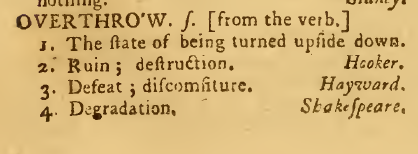
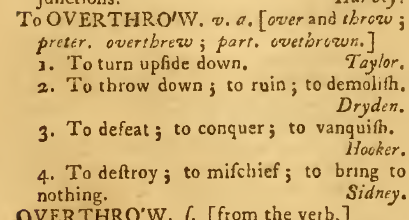
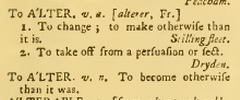


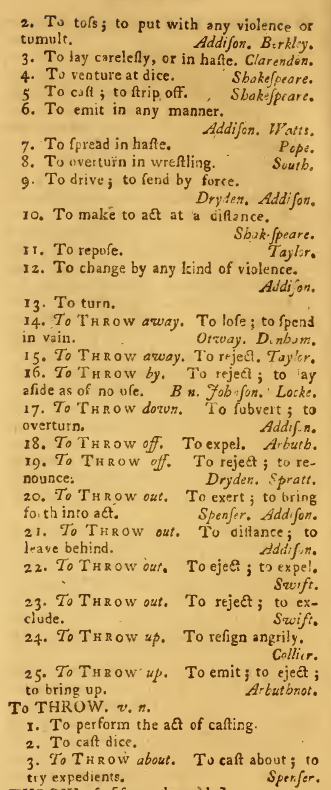
Overthrow — 1756
1. The state of being turned upside down.
2. Ruin; destruction.
3. Defeat; discomfiture.
4. Degradation.
To Overthrow — 1756
1. To turn upside down.
2. To throw down; to ruin; to demolish.
3. To defeat; to conquer; to vanquish.
4. To destroy; to mischief; to bring to nothing.
To Alter v.a. — 1756
1. To change; to make otherwise than it is.
To Alter v.n. — 1756
To become otherwise than it was.
To Abolish — 1756
1. To annul
2. To put an end to; to destroy.
To Throw — 1756
17. To THROW down. To subvert; to overturn.
18. To THROW off. To eject; to expel.
19. To THROW off. To reject; to renounce.
Even from the 1756 definitions for overthrow, which was not used in The Declaration; and that of To Alter, To Abolish, & To Throw Off all three being used in The Declaration. The Declaration proclaims these three activities, To Alter, To Abolish, & To Throw Off as either being the governed peoples right and or duty when government no longer works to secure and protect the people's rights.
We see that even in 1756-76 that the four words, overthrow, To Alter, To Abolish, & To Throw Off can be used interchangeably.
overthrow:
2. Ruin; destruction.
to overthrow:
2. To throw down; to ruin; to demolish. [common with To Throw Off #17.
4. To destroy; to mischief; to bring to nothing.
To Alter:
1. To change; to make otherwise than it is. [clearly being a potentially more peaceful process from anything from making simple amendment to destroying; as both make something other than it is.]
To Abolish :
2. To put an end to; to destroy.
To Throw:
17. To THROW down. To subvert; to overturn.
18. To THROW off. To eject; to expel. &
19. To THROW off. To reject; to renounce.
What we are seeing; when comparing 1776 to the present; as it seems this US Code and these Sections are still enforceable. As such, Congress has unethically, Tyrannically and Despotically prohibited the governed people from exercising the rights they have retained from The Declaration, for those such instances when government no longer serves the people. This is most evident when a person reviews the list of grievances against King George III and compare it with the laws and actions by our present government (all levels, all branches). There is very little difference.
This series of Code Sections is a prime example of against a warning from The Declaration that states, "governments should not be changed for light and transient causes".
The origin of these Sections of Code stem back to 1909 and 1940 (the era of World Wars I & II) when communism as the big political scare words to executing and jailing those who disagreed with government.
What we are seeing is that nearly all of the prohibited acts in these Code Sections are supposed to be protected by government so that the people can, by whatever means necessary correct the evils of government.
The following step will be to identify the Codes Prohibited Actions and compare that with The Peoples' Protected Rights (naming where the protection occurs).
| US Code - Prohibited Rights | Dec & Con- Protected Rights |
|---|---|
| Whoever knowingly or willfully advocates, abets, advises, or teaches the duty, necessity, desirability, or propriety of overthrowing the government of the United
States... or any political subdivision therein... by force or violence,
or by the assassination of any
officer of any such government;
1756 Definitions: To Overthrow: 4. To destroy; to mischief; to bring to nothing. |
The [knowingly or willfully] clause. How difficult is it to prove what a person actually does know some thing or whether they willing participated in some even or was somehow coerced or forced into it? The government of the United States is nothing but a FORM of government 1776 The Declaration's Clause: "That whenever any Form of Government becomes destructive of these ends, it is the Right of the People to alter or to abolish it..." 1756 Definition: To Abolish : 2. To put an end to; to destroy. 1790 The Constitution, Amendment 9: "The enumeration in the Constitution, of certain rights, shall not be construed to deny or disparage others retained by the people." The potential deciding factor may hing with The US Code clause, "by force or violence, or by the assassination of any officer of any such government". Though The Declaration & The Constitution both encourage peaceable changes to government [The Declaration via the To Alter phrase; and The Constitution via the Article 5 Amendment process]: It has been repeated history that Tyrants and Despots are reluctant to simply surrender power once they have it. It is for this reason that with respect to the change from one government form to another they repeated it three times in The Declaration with varying degrees of force, by definition, are suggested with each [To Alter, To Abolish, and To Throw Off]. The #2 definition for To Abolish; To put an end to; to destroy does not suggest any peaceable option exist. It is usually the Tyrant or Despot who makes the violence necessary. |
| Whoever knowingly or willfully advocates, abets, advises, or teaches the duty, necessity, desirability, or propriety of destroying the government of the United
States... or any political subdivision therein... by force or violence,
or by the assassination of any
officer of any such government;
1756 Definitions: To Overthrow: 4. To destroy; to mischief; to bring to nothing. |
Identical to the above. |
| Whoever, with intent to cause the overthrow or destruction of any such government, prints, publishes, edits, issues, circulates, sells, distributes, or publicly displays any written or printed matter advocating, advising, or teaching the duty, necessity, desirability, or propriety of overthrowing or destroying any government in the United States by force or violence, or attempts to do so; | Regarding the [with intent to cause] clause. How difficult is it to prove what a person actually intends or intended by their action? These prohibited actions [prints, publishes, edits, issues, circulates, sells, distributes, or publicly displays any written or printed matter advocating, advising, or teaching] are protected, preserved, and retained by the people, as follow: From The Declaration's clause, "That to secure these rights, Governments are instituted among Men, deriving their just powers from the consent of the governed," we know that if the governed people, in accord with the terms of The Declaration, have not granted a power to government to regulate one of the governed peoples' rights; the people have retained that right. Then, from The Constitution, Amendment1 & Amendment 9, as most all of these prohibitions qualify as freedom of speech, press, petition, and assembly. We know that if any specific right is not enumerated within The Constitution, the people have retained that right. Amendment 1 states: "Congress shall make no law ... abridging the freedom of speech, or of the press; or the right of the people peaceably to assemble, and to petition the Government for a redress of grievances." Amendment 9 states: "The enumeration in the Constitution, of certain rights, shall not be construed to deny or disparage others retained by the people." the duty, necessity, desirability, or propriety of overthrowing or destroying any government in the United States by force or violence, or attempts to do so; This is discussed earlier with the 1756 definitions for Overthrow & Abolish with respect to their striking similarity in the use of the words to destroy. The words To Alter and To Destroy certainly strike up images of force and or violence; both in 1756 and in present-day societies. |
| Whoever organizes or helps or attempts to organize any society, group, or assembly of persons who teach, advocate, or encourage the overthrow or destruction of any such government by force or violence; or becomes or is a member of, or affiliates with, any such society, group, or assembly of persons, knowing the purposes thereof— | The part: "Whoever organizes or helps or attempts to organize any society, group, or assembly of persons" clearly violates The Constitution, Amendment 1, and the peoples' right to peaceably assemble. Amendment 1 does not put any exceptions on that right. The words: "who teach, advocate, or encourage" also violate Amendment 1's prohibition against Congress regarding freedom of speech. This could be repeated over and over again: This US Code clause, prohibiting those who "teach, advocate, or encourage the overthrow or destruction of any such government by force or violence;" makes it quite clear why united States of American Civics is no longer taught as completely as it used to be some hundred plus years ago. The last thing tyrants and despots want is a well informed society that knows how to control their government; and frequently exercises that power. This last part of this US Code Section states: "or becomes or is a member of, or affiliates with, any such society, group, or assembly of persons, knowing the purposes thereof". This violates the peoples' right of association. Though not listed specifically in either The Declaration or The Constitution; Amendment 9 of The Constitution covers it by not enumerating it. And The Declaration covers it in its first paragraph, when it states: "When in the Course of human events, it becomes necessary for one people to dissolve the political bands which have connected them with another..." The right of association. It does not matter whether a person knows or does not know the purpose of the organizations they join. If they know, that knowing may be for an educational purpose and possibly to share better information and better ways of getting the same job accomplished. |
|
As used in this section, the terms "organizes" and "organize", with respect to any society, group, or assembly of persons, include the recruiting of new members, the forming of new units, and the regrouping or expansion of existing clubs, classes, and other units of such society, group, or assembly of persons. |
See Right of Association above. |
(A) For the purposes of this section:
"Attorney General" means the Attorney General of the United States;
"Organization" means any group, club, league, society, committee, association, political party, or combination of individuals, whether incorporated or otherwise, but such term shall not include any corporation, association, community chest, fund, or foundation, organized and operated exclusively for religious, charitable, scientific, literary, or educational purposes;
"Political activity" means any activity the purpose or aim of which, or one of the purposes or aims of which, is the control by force or overthrow of the Government of the United States or a political subdivision thereof, or any State or political subdivision thereof;
An organization is engaged in "civilian military activity" if:
(1) it gives instruction to, or prescribes instruction for, its members in the use of firearms or other weapons or any substitute therefor, or military or naval science; or
(2) it receives from any other organization or from any individual instruction in military or naval science; or
(3) it engages in any military or naval maneuvers or activities; or
(4) it engages, either with or without arms, in drills or parades of a military or naval character; or
(5) it engages in any other form of organized activity which in the opinion of the Attorney General constitutes preparation for military action;
An organization is "subject to foreign control" if:
(a) it solicits or accepts financial contributions, loans, or support of any kind, directly or indirectly, from, or is affiliated directly or indirectly with, a foreign government or a political subdivision thereof, or an agent, agency, or instrumentality of a foreign government or political subdivision thereof, or a political party in a foreign country, or an international political organization; or
(b) its policies, or any of them, are determined by or at the suggestion of, or in collaboration with, a foreign government or political subdivision thereof, or an agent, agency, or instrumentality of a foreign government or a political subdivision thereof, or a political party in a foreign country, or an international political organization.
(B)(1) The following organizations shall be required to register with the Attorney General:
Every organization subject to foreign control which engages in political activity;
Every organization which engages both in civilian military activity and in political activity;
Every organization subject to foreign control which engages in civilian military activity; and
Every organization, the purpose or aim of which, or one of the purposes or aims of which, is the establishment, control, conduct, seizure, or overthrow of a government or subdivision thereof by the use of force, violence, military measures, or threats of any one or more of the foregoing.
Every such organization shall register by filing with the Attorney General, on such forms and in such detail as the Attorney General may by rules and regulations prescribe, a registration statement containing the information and documents prescribed in subsection (B)(3) and shall within thirty days after the expiration of each period of six months succeeding the filing of such registration statement, file with the Attorney General, on such forms and in such detail as the Attorney General may by rules and regulations prescribe, a supplemental statement containing such information and documents as may be necessary to make the information and documents previously filed under this section accurate and current with respect to such preceding six months' period. Every statement required to be filed by this section shall be subscribed, under oath, by all of the officers of the organization.
(2) This section shall not require registration or the filing of any statement with the Attorney General by:
(a) The armed forces of the United States; or
(b) The organized militia or National Guard of any State, Territory, District, or possession of the United States; or
(c) Any law-enforcement agency of the United States or of any Territory, District or possession thereof, or of any State or political subdivision of a State, or of any agency or instrumentality of one or more States; or
(d) Any duly established diplomatic mission or consular office of a foreign government which is so recognized by the Department of State; or
(e) Any nationally recognized organization of persons who are veterans of the armed forces of the United States, or affiliates of such organizations.
(3) Every registration statement required to be filed by any organization shall contain the following information and documents:
(a) The name and post-office address of the organization in the United States, and the names and addresses of all branches, chapters, and affiliates of such organization;
(b) The name, address, and nationality of each officer, and of each person who performs the functions of an officer, of the organization, and of each branch, chapter, and affiliate of the organization;
(c) The qualifications for membership in the organization;
(d) The existing and proposed aims and purposes of the organization, and all the means by which these aims or purposes are being attained or are to be attained;
(e) The address or addresses of meeting places of the organization, and of each branch, chapter, or affiliate of the organization, and the times of meetings;
(f) The name and address of each person who has contributed any money, dues, property, or other thing of value to the organization or to any branch, chapter, or affiliate of the organization;
(g) A detailed statement of the assets of the organization, and of each branch, chapter, and affiliate of the organization, the manner in which such assets were acquired, and a detailed statement of the liabilities and income of the organization and of each branch, chapter, and affiliate of the organization;
(h) A detailed description of the activities of the organization, and of each chapter, branch, and affiliate of the organization;
(i) A description of the uniforms, badges, insignia, or other means of identification prescribed by the organization, and worn or carried by its officers or members, or any of such officers or members;
(j) A copy of each book, pamphlet, leaflet, or other publication or item of written, printed, or graphic matter issued or distributed directly or indirectly by the organization, or by any chapter, branch, or affiliate of the organization, or by any of the members of the organization under its authority or within its knowledge, together with the name of its author or authors and the name and address of the publisher;
(k) A description of all firearms or other weapons owned by the organization, or by any chapter, branch, or affiliate of the organization, identified by the manufacturer's number thereon;
(l) In case the organization is subject to foreign control, the manner in which it is so subject;
(m) A copy of the charter, articles of association, constitution, bylaws, rules, regulations, agreements, resolutions, and all other instruments relating to the organization, powers, and purposes of the organization and to the powers of the officers of the organization and of each chapter, branch, and affiliate of the organization; and
(n) Such other information and documents pertinent to the purposes of this section as the Attorney General may from time to time require.
All statements filed under this section shall be public records and open to public examination and inspection at all reasonable hours under such rules and regulations as the Attorney General may prescribe.
(C) The Attorney General is authorized at any time to make, amend, and rescind such rules and regulations as may be necessary to carry out this section, including rules and regulations governing the statements required to be filed.
(D) Whoever violates any of the provisions of this section shall be fined under this title or imprisoned not more than five years, or both.
Whoever in a statement filed pursuant to this section willfully makes any false statement or willfully omits to state any fact which is required to be stated, or which is necessary to make the statements made not misleading, shall be fined under this title or imprisoned not more than five years, or both.
(K. Notes: This covers US Code §2386. Registration of certain organizations
As for this paragraph of the Code Section: ""Organization" means any group, club, league, society, committee, association, political party, or combination of individuals, whether incorporated or otherwise, but such term shall not include any corporation, association, community chest, fund, or foundation, organized and operated exclusively for religious, charitable, scientific, literary, or educational purposes;"
It is this part; "but such term shall not include any corporation, association, community chest, fund, or foundation, organized and operated exclusively for religious, charitable, scientific, literary, or educational purposes;" that is curious. For two main reasons.
First is this clause, "organized and operated exclusively for". This is curious because of the following list of exclusions.
Second is are these exclusions: "religious, charitable, scientific, literary, or educational purposes;"
"religious purposes"
For those who adhere to certain religions, they believe that their god ordained government. As such, government would be an important part of their religion. Therefore, their exclusively religious purpose has them keeping a watchful eye on government and instructing their people with regard as to what must be done when the government officers harm the people and or violate their rights.
"charitable purposes"
There are many exclusively charitable organizations, such as "churches".
"scientific purposes"
The 1756 definition for "Politicks" is "The science of government; that art or practice of administring publick affairs."
"literary purposes"
Literary purposes include writing and reading. In order for citizens to be "good citizens" they must be able to properly comprehend government charters and laws; as some of them may soon be writing some of them.
"educational purposes"
Schools in these united States of America are supposed to be teaching civics which covers topics as people controlling government; as well as what may become necessary if the people wait to long to make those necessary corrections.
The next paragraph now defines: ""Political activity" means any activity the purpose or aim of which, or one of the purposes or aims of which, is the control by force or overthrow of the Government of the United States or a political subdivision thereof, or any State or political subdivision thereof;
The curious aspect about all these sections is that they focus on the force and violence with the overthrow of the Government. Here, the word "or" after "force" does not mean that the overthrow need be violent or "forceful". This could mean that the overthrow of a constitutionally lawful government by legislators who pass unconstitutional laws that unjustly strip the citizens of even-more rights —is a punishable form of overthrowing of a constitutionally lawful government.
The next part of this US Code Section deals with "An organization is engaged in "civilian military activity" if:"
Keep in mind, From the US Constitution, Article 1, Section 8, Clauses 15 & 16:
#15: "To provide for calling forth the Militia to execute the Laws of the Union, suppress Insurrections and repel Invasions;
#16: "To provide for organizing, arming, and disciplining, the Militia, and for governing such Part of them as may be employed in the Service of the United States, reserving to the States respectively, the Appointment of the Officers, and the Authority of training the Militia according to the discipline prescribed by Congress;"
Also, keep in mind these definitions related to the 1756 Dictionary for Militia


Militia — 1756
The trainbands; the standing force of a nation.
Trainbands — 1756
The militia; the part of a community trained to the martial exercise.
The Code Section continues with: "(1) it gives instruction to, or prescribes instruction for, its members in the use of firearms or other weapons or any substitute therefor, or military or naval science; or"
This is all educational. There might not be so many school shooting and accidental discharge of firearms in homes if more of these classes were offered.
Next part of the Code Section states: "(2) it receives from any other organization or from any individual instruction in military or naval science; or"
If you cannot take their weapons away from them; turn them into criminals if they try to learn how to properly use them? This is much the same that happened in the 1860's after the War between Nations ended between these united States of America and The Confederate States of America. Government passed many laws that violate The Constitution, violating the people's rights. Then, under the pretend honest courts, found the people guilty and sent them back to the slave plantations under Amendment 13 —without the duly convicted part being applied.
US Code Section continues: (3) it engages in any military or naval maneuvers or activities; or
This seems to prohibit a bunch of boating or ATV fanatics from playing forms of the GAME "Battleship" or other similar games either on the water or land.
Code Section continues: (4) it engages, either with or without arms, in drills or parades of a military or naval character; or
One might figure that this means being in cadence or uniform. Since the military (including naval) forces parade in uniform and in cadence; this would put to question school marching bands and parades, in uniform and usually a cadence.
(5) it engages in any other form of organized activity which in the opinion of the Attorney General constitutes preparation for military action;"
This really dives deep into tyranny and despotism. Imagine that the military all sit down to eat meals together. Watch the family. If you sit down to meals together, you just might be preparing for military action. (Here's your sign... government). If you train for long runs carrying any packs at all you just might be preparing for military action. (Here's your sign... government). Watch out Doomsday PREPPERS, the government does not want you PREPARED for when they throw more SHIT in the Fan.
US Code Section 2386 continues: "An organization is "subject to foreign control" if:"
Code Section continues: "(a) it solicits or accepts financial contributions, loans, or support of any kind, directly or indirectly, from, or is affiliated directly or indirectly with, a foreign government or a political subdivision thereof, or an agent, agency, or instrumentality of a foreign government or political subdivision thereof, or a political party in a foreign country, or an international political organization; or"
Foreign control? Would that mean that if the US Government receives money from China or Russia that those politicians are also subject to foreign control?
Code Section Continues: "(b) its policies, or any of them, are determined by or at the suggestion of, or in collaboration with, a foreign government or political subdivision thereof, or an agent, agency, or instrumentality of a foreign government or a political subdivision thereof, or a political party in a foreign country, or an international political organization."
Since the United Nations is a foreign government entity from which our politicians seem heavily indebted by passing laws suggested by the UN but violating our Constitution.
US Code Section continues with: "(B)(1) The following organizations shall be required to register with the Attorney General:"
Section: "Every organization subject to foreign control which engages in political activity;"
Any organization that pays or is exempt from paying taxes is on engaging in political activity.
Section: "Every organization which engages both in civilian military activity and in political activity;"
Since engages in military activity for a corporation would include employees who are on active duty or reserve duty military status must be said to participate in military activity; and most organizations are involved with taxation (paying or exempting).
Section: "Every organization subject to foreign control which engages in civilian military activity; and"
Every organization that pays or is exempt from paying taxes is involved in military activity (funding or withholding funds from the military)
US code Section continues: "Every organization, the purpose or aim of which, or one of the purposes or aims of which, is the establishment, control, conduct, seizure, or overthrow of a government or subdivision thereof by the use of force, violence, military measures, or threats of any one or more of the foregoing."
Still waiting to see where they include "the establishment, control, conduct, seizure, or overthrow of a government or subdivision thereof" with money and other assets.
[...] Section Continues: "(2) This section shall not require registration or the filing of any statement with the Attorney General by:"
Not surprisingly, the list of exceptions are all government or organizations whose members are former government. List not included here.
Section continues, combining several select clauses together: "(3) Every registration statement required to be filed by any organization shall contain the following information and documents:
"(f) The name and address of each person who has contributed any money, dues, property, or other thing of value to the organization or to any branch, chapter, or affiliate of the organization;
"(j) A copy of each book, pamphlet, leaflet, or other publication or item of written, printed, or graphic matter issued or distributed directly or indirectly by the organization, or by any chapter, branch, or affiliate of the organization, or by any of the members of the organization under its authority or within its knowledge, together with the name of its author or authors and the name and address of the publisher;
"(k) A description of all firearms or other weapons owned by the organization, or by any chapter, branch, or affiliate of the organization, identified by the manufacturer's number thereon;
"(n) Such other information and documents pertinent to the purposes of this section as the Attorney General may from time to time require."
Aside from loads more information requested; these four selected seem most obvious violations against The Constitution.
As for (f) and the list of donors and what was donated: This violates Amendment 4 and the individual's right to privacy. Granted, this is not the donor providing the information, the recipient. Ordinarily, this information would appear on the unconstitutional tax forms that are in fact an annual census.
Then (j) demands a copy of all forms of information published or broadcast. This violates privacy, as well as speech. If the government wants published material, they can pay for it, same as any other. In essence, this and most of this US CODE violates Amendment 5 by COMPELLING persons to be witness against themselves or go to jail.
Then (k) This violates Amendment2, which does not authorize the government to require registration of ARMS. This simply asks it easier for tyrants and despots to seize those ARMS if they know where they are and who has them.
Then (n) depending on the level of loyalty to The Constitution an Attorney General has; or rather lack thereof; this clause could get a lot more ugly than this Code already is.
US Code Section ends with: "All statements filed under this section shall be public records and open to public examination and inspection at all reasonable hours under such rules and regulations as the Attorney General may prescribe.
(C) The Attorney General is authorized at any time to make, amend, and rescind such rules and regulations as may be necessary to carry out this section, including rules and regulations governing the statements required to be filed."
"Public Record"? Now, not just the government knows what weapons people have, but now that knowledge is available to the World. Keep in mind; the government officers are not required to make the same information public, and we can see the value of that when government officers are honorable. The same can be said about the privacy for individuals as well. There is value in that secrecy of what weapons and now many —especially when governments turn tyrannical.
The US Code Continues with:
§2387.
Activities affecting armed forces generally
(a) Whoever, with intent to interfere with, impair, or influence the loyalty, morale, or discipline of the military or naval forces of the United States:
This will be interesting to discover; as to whether government, at present, considers the intent of a person or group to instruct the military and police regarding the meaning and duty that goes with their oath; as somehow trying to "influence the loyalty, morale, or discipline of the military or naval forces".
If a soldier's, police, legislator's, and judge's loyalty changes against a tyrannical government and its officers, this work will be a success. It is expected that their morale will greatly improve and there will be far fewer PTSD cases as these people turn from tyranny and despotism.
As for the "discipline" of the military, which includes the naval forces, cis, nsa, border patrol, cost guard, national guard, etc...; it is presumed that Congress, in accord with The Constitution's grant of power to discipline the military; that Congress will do so toward the preservation of the citizens' rights. Fortunately, and unfortunately, I have experienced the Congressionally authorized "discipline" when I was in the military. It has nothing to do with securing the peoples' rights; but in place of that, simply doing what your are told —without question.
Section's next part:" (1) advises, counsels, urges, or in any manner causes or attempts to cause insubordination, disloyalty, mutiny, or refusal of duty by any member of the military or naval forces of the United States; or"
It is not the intent with this website to "advise, counsel, urge, or in any manner cause or attempt to cause insubordination, disloyalty, mutiny, or refusal of duty" regarding any constitutionally lawful military or civilian-government activity. Though not specifically stated with other of the prohibited actions, this paragraph applies to the entirety of this website and the personal actions of Daniel Melzine Kingery. This also applies to any other human on this planet (domestic or foreign) who helps advance the cause for getting Clean Honest Government.
Next US CODE §2388.
Activities affecting armed forces during war
"(a) Whoever, when the United States is at war, willfully makes or conveys false reports or false statements with intent to interfere with the operation or success of the military or naval forces of the United States or to promote the success of its enemies; or"
So long as the actions of the military are Constitutionally & in accord with The Declaration, Authorized and honorable, this is legitimate request. However, the government's actions (even with or without the military) violate treaties, The Declaration, The Constitution, or the rights of the citizens or other humans, it is the DUTY of every person to resist those injustices.
Nest Section part: "Whoever, when the United States is at war, willfully causes or attempts to cause insubordination, disloyalty, mutiny, or refusal of duty, in the military or naval forces of the United States, or willfully obstructs the recruiting or enlistment service of the United States, to the injury of the service or the United States, or attempts to do so--
"Shall be fined under this title or imprisoned not more than twenty years, or both."
The comment of the previous section-part applies here as well.
Section part continues: "(b) If two or more persons conspire to violate subsection (a) of this section and one or more such persons do any act to effect the object of the conspiracy, each of the parties to such conspiracy shall be punished as provided in said subsection (a)."
Does the government tyrants consider the conversation of two or more people, who may or not be watching some war movie or playing battleship, or even discussing some war book or play; and the conversation from one of the groups says, "If I were in that guy's shoes, this is what I would have done." But one of the other people in the group is thinking that it is actually a great idea, and puts it into action without the aid of any other group member.
That example would be the same as one member of Congress proposing a Bill that clearly violates The Constitution. It is debated on the Floor. Goes to a vote and passes. Those who debated are not to be held accountable for what they said. However, those who actually voted to pass it can be prosecuted for violating THE SUPREME LAW OF THE LAND.
Section continues: "(c) Whoever harbors or conceals any person who he knows, or has reasonable grounds to believe or suspect, has committed, or is about to commit, an offense under this section, shall be fined under this title or imprisoned not more than ten years, or both."
A person sees a news report that the government has accused his friend of some action that falls under some element of this section. However, this person also knows The Declaration and The Constitution well enough to know that the US CODE Section violates either one, the other, or both (Declaration and Constitution) and says nothing about his friend staying in is spare bedroom. This person has committed no crime in adhering to the PLEDGE at the end of The Declaration, which binds all united States Americans to come to the aid of each other when unjustly attacked by an individual or the tyranny of their own government.
Section ends with: "(d) This section shall apply within the admiralty and maritime jurisdiction of the United States, and on the high seas, as well as within the United States."
This is proof that even though a person is outside the geographical political jurisdiction of a nation, that they can still be held accountable locally for their actions abroad. This also speaks of Amendment 14's clause about supposed automatic citizenship that states, "and subject to the jurisdiction thereof". The for4eigner mother and the child born in united States soil, are not subject to the jurisdiction of the united States government, but they are of the land from which they left.
Next US Code Section: §2389.
Recruiting for service against United States
"Whoever recruits soldiers or sailors within the United States, or in any place subject to the jurisdiction thereof, to engage in armed hostility against the same; or
"Whoever opens within the United States, or in any place subject to the jurisdiction thereof, a recruiting station for the enlistment of such soldiers or sailors to serve in any manner in armed hostility against the United States--
"Shall be fined under this title or imprisoned not more than five years, or both."
The most curious part about this is that any person who recruits people for armed hostilities against a Constitutionally Honorable government is committing Treason by levying war, raising war against the nation. Yet, this is only a five year sentence.
US CODE Section ends with §2390.
Enlistment to serve against United States
"Whoever enlists or is engaged within the United States or in any place subject to the jurisdiction thereof, with intent to serve in armed hostility against the United States, shall be fined under this title 1 or imprisoned not more than three years, or both."
Once again, this is treason for the same reasons of levying war. And this is an even lighter sentence for the person who expects to do the actual violence of war.
Now to return to the last part of Article 3, Section 3 of The Constitution:
The Congress shall have Power to declare the Punishment of Treason, but no Attainder of Treason shall work Corruption of Blood, or Forfeiture except during the Life of the Person attainted.
Section 1.
Full Faith and Credit shall be given in each State to the public Acts, Records, and judicial Proceedings of every other State. And the Congress may by general Laws prescribe the Manner in which such Acts, Records and Proceedings shall be proved, and the Effect thereof.
(K. Notes:

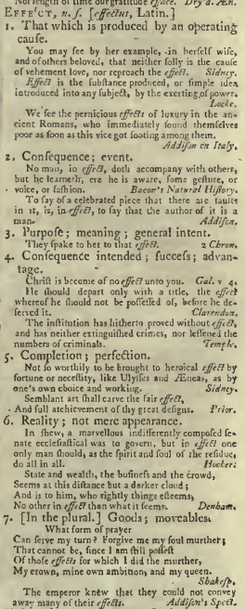
To Prove v. a. — 1785
1. To evince; to show by argument or testimony.
2. To try; to bring to the test.
3. To experience.
4. To endure; to try by suffering or encountering.
To Prove v. n. — 1785
1. To make trial.
2. To be found by experience.
3. To succeed.
4. To be found in the event.
Effect n. s. — 1785
1. That which is produced by an operating cause.
2. Consequence; event.
3. Purpose; meaning; general intent.
4. Consequence intended; success; advantage.
5. Completion; perfection.
6. Reality; not mere appearance.
7. [In the plural.] Goods; moveables.
Interesting enough, Congress can regulate how the States records are verified; as well as the determine the purpose and consequences of making certain records public.
However, in order for the States to guarantee public access to federal-level government records, an Article 5 Amendment must take place to enforce it. That, or the National Government for this nation-State is also subject to the same general laws —because it too, is a State. This is supposed to be one of those Checks & Balances between the various levels of government.
Section 2.
The Citizens of each State shall be entitled to all Privileges and Immunities of Citizens in the several States.
(K. Notes: The use of Privileges and Immunities relate to Citizens in the several States, also, by definition, include Rights


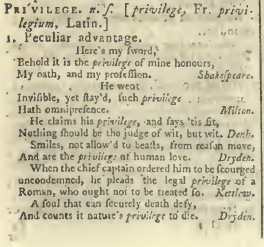

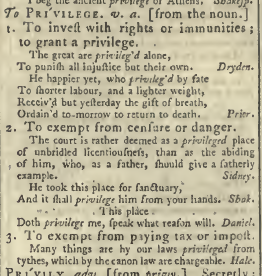
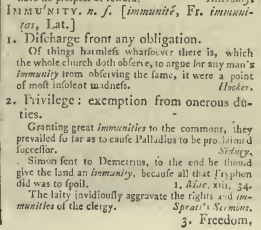

Rights n. s. — 1785
6. That which justly belongs to one.
7. Property; interest.
9. Immunity; privilege.
Privilege n. s. — 1785
1. Peculiar advantage.
2. Immunity; right not universal.
To Privilege n. s. — 1785
1. To invest with rights or immunities; to grant a privilege.
2. To exempt form censure or danger.
3. To exempt from paying tax or impost.
Immunity n. s. — 1785
1. Discharge from obligation.
2. Privilege; exemption from onerous duties.
3. Freedom.
(K. Notes: "The Citizens of each State shall be entitled to all Privileges and Immunities of Citizens in the several States." First of all: By definitions, as seen above, rights, privileges, and immunities are synonymous. So how do we know what rights (privileges and immunities) are common among the states?
We know the short-list of inalienable or unalienable rights listed in The Declaration. However, few people are aware of four other rights listed, as well as reference to all the other rights not listed.
Four of the other rights listed, and almost never talked about in public are these:
• The right to alter the present form of government.
• The right to abolish the present form of government.
• The right to throw off the present form of government.
• And the right to consent or withhold consent regarding the present form of government and regulating (granting, amending, and repealing) its powers; as well as regulating those in office (General Elections and Recall Elections.
This is the reference in The Declaration that touches all the other rights not listed: "all men are created equal, that they are endowed by their Creator with certain unalienable Rights, that among these are...". The list of unalienable Rights is un-numbered.
As for the rights in The Constitution that are common among the States; most people are familiar with at least a couple rights enumerated in the first ten amendments, referred to as The Bill of Rights; as well as three of the voting amendments for race, creed, color, sex, and age; and the rights to Keep & Bear arms.
However, one of the most important elements, aside from Article 5, the amendment Article: is Amendment #9. It states: The enumeration in the Constitution, of certain rights, shall not be construed to deny or disparage others retained by the people.
All Amendment 9 means is that is an action that does not unjustly violate another person or their property is not enumerated, listed in The Constitution; government at all levels and branches are prohibited from violating those rights, actions; —until it is amended into The Constitution, granting some limited power of government to infringe upon that right.
The unfortunate turn of events in the "education" system within these united States of America; it has too many people mistakenly believing that The Constitution actually grants rights.
The somewhat reverse of "The Citizens of each State shall be entitled to all Privileges and Immunities of Citizens in the several States." also holds true; in that any right, privilege, or immunity exercised by people in any state, is constitutionally available to the people in all the states. We know this, because of Amendment 9 and those rights not enumerated.
A Person charged in any State with Treason, Felony, or other Crime, who shall flee from Justice, and be found in another State, shall on Demand of the executive Authority of the State from which he fled, be delivered up, to be removed to the State having Jurisdiction of the Crime.
(K. Notes: This does include the most minor violations of the least of crimes. This is fact for two reasons: First it states "other Crimes". 'J'-Walking is one of those other crimes. It does not specify other HIGH-Crimes, as is used elsewhere in The Constitution. Second: It does not exclude any minor-type crimes.
(K. Notes: Supposedly, as some people claim, mistakenly; is that Amendment 13 prohibits this type of slavery or involuntary servitude. It does not!
Amendment 13 demands that a person be Duly Convicted before they can be held to service as slave or involuntary servitude. Unfortunately, very few people in the jails and prisons within these united States of America were duly convicted (no unconstitutional searches or seizures of property or people, either with or without warrants, no unconstitutional compelled witness against themselves, no unconstitutional judge rendered verdict (as all judge rendered verdicts in criminal prosecutions are unconstitutional)).
Section 3.
New States may be admitted by the Congress into this Union; but no new State shall be formed or erected within the Jurisdiction of any other State; nor any State be formed by the Junction of two or more States, or Parts of States, without the Consent of the Legislatures of the States concerned as well as of the Congress.
(K. Notes: Historically speaking, this paragraph was abused by Congress & President in one massive situation. It was during Lincoln's presidency and what is incorrectly taught as a civil war.
New States must ask Congress to join the union. Nothing here suggests that Free, Sovereign, and Independent States must seek permission to leave the union.
A Congress and a President mistakenly assumed that the union failed if they allowed some of the States to secede.
Surprisingly enough, the united States of America continued to exist, even after several of the states seceded from the union.
That war of the 1860's is what happens when politicians are not checked by the citizens who own the government.
The Congress shall have Power to dispose of and make all needful Rules and Regulations respecting the Territory or other Property belonging to the United States; and nothing in this Constitution shall be so construed as to Prejudice any Claims of the United States, or of any particular State.
(K. Notes: Supposedly, there are five territories that are permanently inhabited,(American Samoa, Guam, the Northern Mariana Islands, Puerto Rico, and the U.S. Virgin Islands). These would be the equivalent of the British Colonies on the American Continent.
We know that this paragraph is mostly violating The Declaration by exercising the tyrannical power of legislating over any body of people in all cases whatsoever.
If those five territories were uninhabited, Congress would be at liberty to do so. Once inhabited, Congress would not have such authority, at least not without the consent of the people so inhabiting.
Section 4.
The United States shall guarantee to every State in this Union a Republican Form of Government, and shall protect each of them against Invasion; and on Application of the Legislature, or of the Executive (when the Legislature cannot be convened), against domestic Violence.
(K. Notes: This is another of those least known about clauses in The Constitution; especially after the treasonous Congress adopted 'the pledge of allegiance' to government; THE REPUBLIC for which that flag stands.
Against invasion?
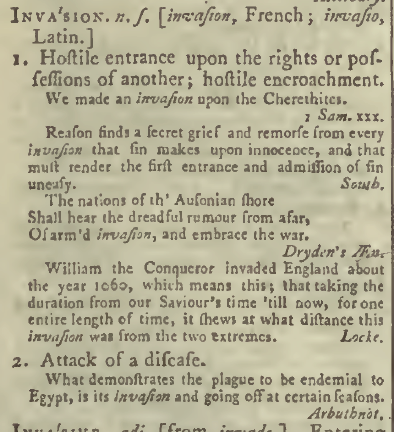
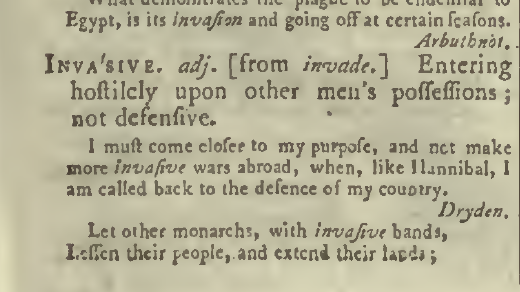
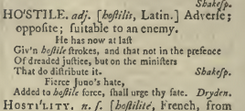
Invasion n. s. — 1785
1. Hostile entrance upon the rights or possessions of another; hostile encroachment.
Invasive adj. — 1785
Entering hostilely upon other men's possessions; not defensive.
Hostile adj. — 1785
Adverse; opposite; suitable to an enemy.
An invasion? Hostile? Adverse; opposite; suitable to an enemy?
When government passes, enforces, and punishes citizens for violating unconstitutional laws; The Declaration identifies those government actions as tyranny and Despotism. As such: they are the adverse to the rights and possessions of the citizens. They are opposite The Constitutional limits on government powers. Those actions are suitable to an enemy.
Such government actions are: The Hostile entrance upon the rights or possessions of another; hostile encroachment. An Invasion.
But what are the citizens to do when they have let such hostile invasions on their rights go for so long?
Aside from learning what rights, contractual rights we, as the citizens have over our government levels and branches we must each each other what those rights are and how to best exercise them
Then, we must exercise our collective rights together and enforce the terms of the contracts of The Declaration and The Constitution upon the respective parties. Upon the citizens with The Declaration. Upon government officers with The Constitution & The Declaration. As well as using Article 5 amendment process more frequently.
The Congress, whenever two thirds of both Houses shall deem it necessary, shall propose Amendments to this Constitution, or, on the Application of the Legislatures of two thirds of the several States, shall call a Convention for proposing Amendments, which, in either Case, shall be valid to all Intents and Purposes, as Part of this Constitution, when ratified by the Legislatures of three fourths of the several States, or by Conventions in three fourths thereof, as the one or the other Mode of Ratification may be proposed by the Congress; Provided that no Amendment which may be made prior to the Year One thousand eight hundred and eight shall in any Manner affect the first and fourth Clauses in the Ninth Section of the first Article; and that no State, without its Consent, shall be deprived of its equal Suffrage in the Senate.
(K. Notes: First, and foremost; this is the means by which government officers are supposed to keep This Constitution up to date with the changing times. As opposed to the way tyrants and despots have done in the past.
It is almost always easier for government officers to exercise unjust, usually ungranted powers than it is for them to take the time to get authorization from the governed people; as is required in accord with The Declaration.
The thing government offers have on their side, when taking unjust powers, is that they can instill fear in the people by using their armed forces (police military, and courts) to minimize resistance from the people. This path, almost always leads to bloody wars to get the tyrants out of office, as there is almost always more than one working together.
The Congress, whenever two thirds of both Houses shall deem it necessary, shall propose Amendments to this Constitution,
It requires two-thirds of both houses for Congress to simply propose amendments.
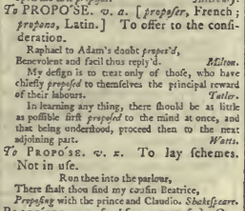
To Propose v. a. — 1785
To offer to the consideration.
When Congress gets the consent from two-thirds majority of both houses; only can Congress pass those proposed amendments on to the states for them to ratify.
or, on the Application of the Legislatures of two thirds of the several States, shall call a Convention for proposing Amendments,
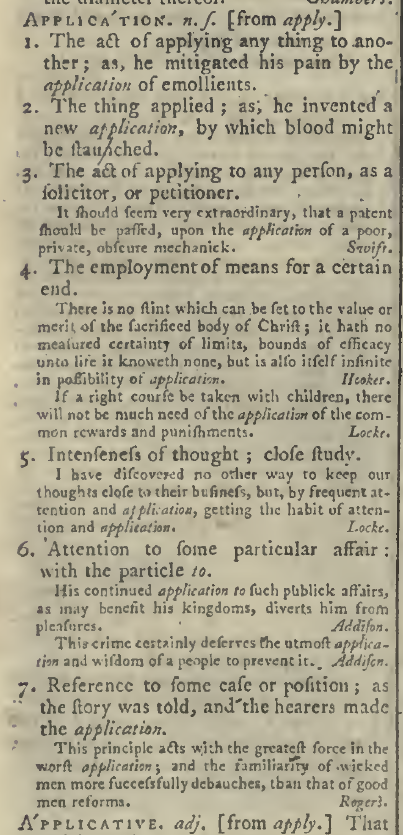
Application n. s. — 1785
3. The act of applying to any person, as a solicitor, or petitioner.
4. The employment of means for a certain end.
A mistaken thought is that the states must make application to Congress to propose certain amendments. This application is to be among the states as a means of properly controlling that nation's government level by granting, altering, or repealing certain government powers exercised at the nation's level. It would be foolishness to have the states apply to Congress, which could then refuse to propose such amendments to repeal a power they enjoy.
which, in either Case, shall be valid to all Intents and Purposes, as Part of this Constitution,
Whether or not two-thirds of both houses of Congress, or two-thirds of the states in the union make propose the amendments; they are considered legitimate.
when ratified by the Legislatures of three fourths of the several States, or by Conventions in three fourths thereof,
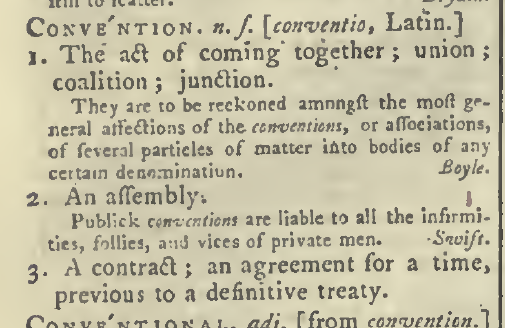
Convention n. s. — 1785
1. The act of coming together; union; coalition; junction.
2. An assembly.
3. A contract; an agreement for a time, previous to a definitive treaty.
A convention is nothing more than a meeting to agree to terms of a treaty that will only become permanent when sufficient members agree to the same terms. And yes; The Constitution is a treaty by and among all of the sates that sign onto it. A treaty is a contract, an agreement, and a law.
In order for those proposed amendments to become enforceable, at least three-fourths of all the states must ratify them; that, or at least 50% of all the registered voters in each of three-fourths of all the states must ratify the proposed amendments.
The 50% of all registered voters, in each of the states ratifying, is required as per The Declaration's consent of the governed. It can only be said that a state has ratified when over fifty percent of the total body of registered voters have consented to the proposal; otherwise, the consensus, meeting of the mind, accord, or agreement is to without the consent.
as the one or the other Mode of Ratification may be proposed by the Congress;
Here, as before, Congress may only propose what mode of ratification be taken. It is up to each individual state to determine for themselves which mode they will use to ratify. Some may allow their State Legislative body ratify or not; and the citizen-registered voters may decide to override the legislative denial. Some states may choose to have the majority of the total body of registered votes ratify.
Provided that no Amendment which may be made prior to the Year One thousand eight hundred and eight shall in any Manner affect the first and fourth Clauses in the Ninth Section of the first Article;
This exception or prohibition violates The Declaration and should never have been entered into The Constitution. It violates The Declaration's clause of all mankind are created equal; and by allowing slavery to continue another twenty-eight years signals the downfall of the nation generally; which has continued to the point our government activities resemble King George III, but on steroids.
and that no State, without its Consent, shall be deprived of its equal Suffrage in the Senate.
The House is the direct representation for the districts of population. The Senate is supposed for the general representation of the entire state. The word 'state' is generally used to refer to the government. So in this instance, as the State government is there to serve the people of that state, the Senate, is an indirect representative for the people of the same state. In this manner, the State Legislature could more easily recall a Senator than the citizens.
All Debts contracted and Engagements entered into, before the Adoption of this Constitution, shall be as valid against the United States under this Constitution, as under the Confederation.
(K. Notes: This is a get out of most debt free for the people and the ability to pass all unconstitutional debt on to those who voted for it, did not veto it, and those who did not repeal it. In government corporations, as that is what governments are; these corporate officers are limited to only those powers granted to them. That is why they are called Representatives. Anything the government officer does that violates the granted powers in The Constitution, those officers become personally liable for those costs and results.
This Constitution, and the Laws of the United States which shall be made in Pursuance thereof; and all Treaties made, or which shall be made, under the Authority of the United States, shall be the supreme Law of the Land; and the Judges in every State shall be bound thereby, any Thing in the Constitution or Laws of any State to the Contrary notwithstanding.
(K. Notes: Here are the four elements of The Supreme Law of the Land.
This Constitution,
At present, The Constitution of the United States of America, is the second of the four elements. Though listed first, it is subordinate to The unanimous Declaration, which is the nation's authority.
and the Laws of the United States which shall be made in Pursuance thereof;
Only the laws of Congress that this Constitution authorizes are part of the Supreme Law of the Land. Thus, the third element.
and all Treaties made, or which shall be made,
This is the fourth element; the Treaties. But even these treaties must be made under the nation's authority. The nation's authority is, The Declaration.
under the Authority of the United States,
The Constitution is the government's authority. The Declaration is the People's authority over government. Treaties are between nations; thus, The Declaration. The laws are between the government and the people; thus The Constitution, which is the law over government and is created and authorized by the people of the nation.
shall be the supreme Law of the Land;
Only those four elements are the Supreme Law of the land. Not Judicial opinions. Not Executive orders. Not unconstitutional Congressional laws. Not treaties that violate The Declaration.
and the Judges in every State shall be bound thereby,
City judges and county judges are as much judges in every State as are State-level judges. National level judges are not excluded, as we see in the last paragraph of this Article.
any Thing in the Constitution or Laws of any State to the Contrary notwithstanding.
Any element in the State Constitutions or laws that are contrary to The Supreme Law of the Land are without standing and are not to be enforced.
We must wonder why we demand that all legislative, executive, and judicial officers, including police and military; are sworn support and defend this Constitution if they are not also required to be able to judge when a law or an order from a superior ranking person violates The Constitution.
The most unfortunate aspect about government is that the workers within tend to use it solely as a paycheck and are then loyal to that paycheck and will do nothing to put it at risk. This is true of legislators, executives, judicial, police, military, and most all other government offices at all levels and all branches of government.
The Senators and Representatives before mentioned, and the Members of the several State Legislatures, and all executive and judicial Officers, both of the United States and of the several States, shall be bound by Oath or Affirmation, to support this Constitution; but no religious Test shall ever be required as a Qualification to any Office or public Trust under the United States.
(K. Notes: This is where it cover the legislators, as well as the executive and judicial officers of the nation and the states; with cities and counties that which makes each state.
The Ratification of the Conventions of nine States, shall be sufficient for the Establishment of this Constitution between the States so ratifying the Same.
(K. Notes: This is where an excellent knowledge of The Articles of Confederation, the previous constitution this one is replacing comes into play, with respect to the actual enforceable date of this constitution
With The Articles of Confederation, Article 13, Paragraph 1, It states, with respect to altering The Articles of Confederation: "nor shall any alteration at any time hereafter be made in any of them, unless such alteration be agreed to in a congress of the united states, and be afterwards confirmed by the legislatures of every state."

Alteration s. — 1756
1. The act of altering or changing.
2. The change made.
The Change Made. The change made in this instance is a change in Constitutions. The Articles of Confederation, is by definition, a constitution. Replacing it with The Constitution of the United States of America is The Change Made. With this, The Constitution of the United States of America could not have been lawfully enforceable until all the states in the union have ratified it. This did not happen until 1790. Not in 1787.
Previous to that, in The Articles, Article 4, Paragraph 2, it states: "No two or more states shall enter into any treaty, confederation, or alliance whatever between them, without the consent of the united states, in congress assembled, specifying accurately the purposes for which the same is to be entered into, and how long it shall continue."
With Article 4, All of the States must agree by way of "the consent of the united states, in congress assembled." This is the entire body of The Congress as apposed to the committee of nine. But any states entering into such authorized "treaty, confederation, or alliance whatever" does not nullify the terms of The Articles of Confederation, as those states are still bound by The Articles until all the states in the union have joined the new constitution.
Article 9, Paragraph 5 states: "The united States, in congress assembled, shall have authority to appoint a committee, to sit in the recess of congress, to be denominated, “A Committee of the States,” and to consist of one delegate from each State"...
The Committee of the States had far less authority than The Congress Assembled; essentially carrying out the management of things already approved by The Congress.
Then, Article 10 states: "The committee of the states, or any nine of them, shall be authorized to execute, in the recess of congress, such of the powers of congress as the united states, in congress assembled, by the consent of nine states, shall, from time to time, think expedient to vest them with; provided that no power be delegated to the said committee, for the exercise of which, by the articles of confederation, the voice of nine states, in the congress of the united states assembled, is requisite."
This allows the Committee of the States to almost do all things in the absence of Congress that are not specifically delegated to The Congress Assembled (the whole body assembled).
The Word, "the," being interlined between the seventh and eighth Lines of the first Page, The Word "Thirty" being partly written on an Erazure in the fifteenth Line of the first Page, The Words "is tried" being interlined between the thirty second and thirty third Lines of the first Page and the Word "the" being interlined between the forty third and forty fourth Lines of the second Page.
Attest William Jackson Secretary
done in Convention by the Unanimous Consent of the States present the Seventeenth Day of September in the Year of our Lord one thousand seven hundred and Eighty seven and of the Independance of the United States of America the Twelfth In witness whereof We have hereunto subscribed our Names,
THE Conventions of a number of the States, having at the time of their adopting the Constitution, expressed a desire, in order to prevent misconstruction or abuse of its powers, that further declaratory and restrictive clauses should be added: And as extending the ground of public confidence in the Government, will best ensure the beneficent ends of its institution.
RESOLVED by the Senate and House of Representatives of the United States of America, in Congress assembled, two thirds of both Houses concurring, that the following Articles be proposed to the Legislatures of the several States, as amendments to the Constitution of the United States, all, or any of which Articles, when ratified by three fourths of the said Legislatures, to be valid to all intents and purposes, as part of the said Constitution; viz.
ARTICLES in addition to, and Amendment of the Constitution of the United States of America, proposed by Congress, and ratified by the Legislatures of the several States, pursuant to the fifth Article of the original Constitution.
(K. Notes: Since The Constitution of the United States of America, an alteration, by 1756 definition; as show earlier, This Congress is acting outside of The Articles of Confederation authority, which remains in force until such time as all the states in the union ratify it. Article 13, Articles of Confederation. With that stated; once the 13th of 13 States ratified both; The Constitution and The bill of rights; they went into force. This happened in May 1790
Though the Congress under The Articles of Confederation could authorize states to draft a new constitution, and even grant authority for them to sign onto it; it could not lawfully or contractually be put into force until it satisfied The Articles, #13, which required all the states to ratify it.
Congress shall make no law respecting an establishment of religion, or prohibiting the free exercise thereof; or abridging the freedom of speech, or of the press; or the right of the people peaceably to assemble, and to petition the Government for a redress of grievances.
(K. Notes: Many people mistakenly assume that Amendment 1 applies to the states. The words, "Congress shall make no law" means that this amendment applies strictly to Congress. Fortunately, of all the twenty-six state constitutions I read, they all have these same prohibitions against the governments of the state.

Establishment n. s. — 1785
2. Confirmation of something already done; ratification.
(K. Notes: Congress can neither dictate what is a religion or what is not a religion. However, that is exactly what Congress does with the Automatic Exemption for Churches
It states in one paragraph, "Churches that meet the requirements of IRC Section 501(c)(3) are automatically considered tax exempt and are not required to apply for and obtain recognition of tax-exempt status from the IRS." This law acts in such manner as to confirm that an organization that claims to be a church, either is or is not, based on whether or not the organization meets certain government requirements.

Religion n. s. — 1785
1. Virtue, as founded upon reverence of God, and expectation of future rewards and punishments.
2. A system of divine faith and worship, as opposed to others.
(K. Notes: These definitions become somewhat meaningless, in that some religions have turned the pronoun god into a formal noun "God"
That said; who is to determine whether the god worshiped qualifies as a religion; if not the government?

To Prohibit v. a. — 1785
1. To forbid; to interdict by authority.
2. To debar; to hinder.



Free adj. — 1785
1. At liberty; not a vassal; not enslaved; not a prisoner; not dependent.
2. Uncompelled; unrestrained.
Exercise n. s. — 1785
4. Preparatory practice in order to skill: as, the exercise of soldiers.
5. Use; actual application of any thing.
6. Practice; outward performance.
7. Employment frequently repeated.
(K. Notes: Congress is forbidden to hinder the uncompelled practice that is outwardly performed religious practices.
A person might mistakenly assume that if a religion practices human sacrifice, that Congress can pass no laws that prohibit it. On the one hand, this is true; provided the the person to be sacrificed is able to competently reason why they accept the act of being put to death in a sacrificial manner: This is their right. On the other hand; if the person to sacrificed objects to the practices and is unwilling to participate, especially as the sacrifice offered; Congress can and is obligated to protect the rights of this second person who refuses to participate; and the people responsible for taking this second person's life can be tried for murder.




To Abridge v. a. — 1785
1. To make shorter in words, keeping still the same substance.
2. To contrast, to diminish, to cut short.
3. To deprive of; to cut off from. In which sense it is followed by the particle from, or of, preceeding the ting taken away.
Freedom n. s. — 1785
1. Liberty; exemption from servitude; independence.
2. Privileges; franchises; immunities.
3. Power of enjoying franchises.
4. Exemption from fate, necessity, or predetermination.
5. Unrestraint.
6. The state of being without any particular evil or inconvenience.
7. Ease of facility in doing or showing any thing.
Freespoken adj. — 1785
Accustomed to speak without reserve.

Speech n. s. — 1785
1. The power of articulate utterance; the power of expressing thoughts by vocal words.
2. Language; words considered as expressing thoughts.
3.Particular language, as distinct from others.
4. Any thing spoken.
5. Talk; mention.
6. Oration; harangue.
7. Declaration of thoughts
(K. Notes: Supposedly, the government uses Schenck v. United States (1919) "fire in a crowded building" to determine when the government can limit an individual's right to free speech.
Referring just to Congress for the time being, this Amendment clearly states that Congress shall make no law abridging (cut short or deprive of) the freedom of speech. It is just that simple.
Speech that encourages people to avoid the draft is as equally protected as is the speech that proclaims there is a fire in a crowded theater (be there fire or no). The actual SPEECH must be as equally protected as the speech of congress members in debating an issue; as congress members are not to be arrested for their debate.
Fire v. Draft? The Draft issue is a debate. The fire issue is also a debate as to whether there is a fire, believed to be a fire, or no.
If the person cannot prove that they had reason to believe that there was a fire; that person may be held liable for all damages caused by their false alarm (personal injury, damage to theater, loss of profits, etc.) In this manner, the right is still protected; but strongly discouraged because of the cost of damages.
As for the Draft; every citizen has a right and a duty to challenge the actions of government —especially concerning war; as it is those very people, whose lives, fortunes, and honor are at risk in that war.
These same concepts apply to all sort of other government prohibitive laws against the people's rights that Amendment 9 protects. Government unjustly prohibits the action, which is the right protected. Government does have authority to seek restitution from the actor for actual damages caused by their action. Speech is the action of vocalizing thought.


Press n. s. — 1785
2. The instrument by which books are printed.
3. Crowd; tumult; throng.
4. Violent tendency.
6. A commission to force men into military service.
(K. Notes: These definitions make room for a lot of different protected rights and prohibited government powers.
Definition #2 seems the only perspective government takes on the prohibition against Congress and the press. Congress shall make no law abridging the freedom of the press.
If we take "press" in context with "speech" we might automatically assume that Definition #2 is the only correct definition.
However, when we take "press" in connection with "peaceably to assemble"; we rule out Definition #3, which, without "peaceably to assemble" would permit all sort of violent public gatherings. And with that, we also rule out Definition #4.
Definition #6 takes on a curious twist with Congressional Draft that forces people into military service. This definition makes the draft an unconstitutional government action.
Both definitions #2 & #6 equally apply and do not conflict with other parts of this constitution. Under The Articles of Confederation, the Congress gave to each State a quota of men for them to provide for the military. If any state could not meet that quota, congress could request that other states make up the difference.
Forced military service violates the citizens' rights to not participate in wars that violate The Declaration's clause to treat other people as friends in peace and enemies in war. Which means if we are not decidedly attacked by a known enemy; any military action against that country violates The Declaration. Thus protecting the rights of people who refuse to register and those who dodge any mandatory draft.


Peaceably adv. — 1785
1. Without war; without tumult.
2. Without tumults or commotion.
3. Without disturbance.
To Assemble v. a. — 1785
To bring together into one place. It is used both of persons and things.
To Assemble v. n. — 1785
To meet together.
(K. Notes: This is intended to be a relatively calm meeting. Clearly, the larger the group, the louder the speaker must project their voice so that all gathered may easily hear.
This would require two additional elements: First the speakers are not to encourage the group to do violence, and is not to disrupt the rights and or quite of people in the area; Second, the groups is supposed to remain relatively calm and not fighting amongst each other or disrupting the meeting in progress.
In a well-informed society, these meetings are simply to discuss the government officers, government actions, ad to decide which need to be stopped and or removed; all in balance with The Declaration, which binds all citizens and then with The Constitution that binds the government officers.


To Petition v. a. — 1785
To solicit; to supplicate.
To Supplicate v. n. — 1785
To implore; to entreat; to petition submissively and humbly.
(K. Notes: Congress is prohibited from abridging the right of the people to petition the government for a redress of grievances.
It must be noted that the comma that separates "to assemble" from "to petition" separates the two clauses within the larger clause. The three major clause elements are separated by semi-colons, as seen below (establishment; .
Congress shall make no law
[respecting an establishment] of religion, or prohibiting the free exercise thereof;
or [abridging the freedom] of speech, or of the press;
or [both work here to the same end of prohibiting Congress from interfering in}[the right of the people] peaceably to assemble, and to petition the Government for a redress of grievances.
It also must be remembered and noted that when government refuses to correct their violations against The Constitution and against the peoples' rights; when peaceful measures and petitions have failed: The Declaration has preserved three rights for the governed people in this regard.
• The right to alter any form of government that is not working on the equal security of all the peoples' rights.
• The right to abolish any form of government that is not working on the equal security of all the peoples' rights.
• The right to throw off any form of government that is not working on the equal security of all the peoples' rights.
It was from 1492 through 1776 that the British Crown became too burdensome for the colonists to bear. That was just 284 years.
From 1776 through to 2024 is 248 years.
The pressure-cooker has been boiling for many years. The government gradually turns up the heat with even more violations against our rights. As with anything that is not allowed to vent off that unwanted pressure, it will soon explode. 1776-1783 is what happened to create what became these united States of America.
After this inevitable explosive reaction to every-increasing government tyranny and despotism; what will be left of the global empire created by our unjust government? Will it be rolled back to just The District of Columbia, with all the other states auctioned off the foreign countries, or lost in the war? All this is coming, but only the people can stop it before the point of explosive activity.

Redress n. s. — 1785
1. Reformation; amendment.
2. Relief; remedy.
3. One who gives relief.
(K. Notes: This is where many societies fail in their approach to government, business, media, religion, etc. They present themselves as rather small groups or as individuals. The organization or government may receive one million boycott petitions signed and mailed by individuals. The entity to be boycotted sees lots of individuals, no organization; so they tend to ignore them.
However, if that million signatures showed up at the head office of an oil company, newspaper, television, government officer's desk; and those one million petitioners made up a large portion of the citizen-customers in that respective area; this single, one-million signature petition will get some attention; but only if it is extremely focused.
By focused; it should be known that if society wants to clean up the oil industry (for example); they should not send the million-signature petition to ALL the oil companies (unless it singles out the one worst-offender. This way, it puts all those other companies on notice that they may be next, if they become the next-worse offender. The same works for the media, and government officers.
If the million signers all stop buying products from the singled-out offender, and spread their purchases among the top-least offensive competing companies; it will only be a matter of days before the singled out company feels and sees the massive drop in profits. If they refuse to correct, they may well go bankrupt and close. If they correct in accord with the petition demands; they will have moved up on the scale and then the "new" worst company is approached in like manner.
In the oil company example; when the petitioners go "shotgun" style and try to affect all oil companies by trying to not buy any oil products; people will go to work, will go to doctors, will go out to dinners, will go to sports and other recreational activities; thus defeating the purpose and ultimately failing. It is that shotgun approach that these big organizations and government depend upon.

To Prove n. s. — 1785
1. A state of uneasiness. Out of use.
2. The cause of uneasiness.
(K. Notes:
The redress of grievances is the seeking a stoppage against the government that is causing uneasiness against the citizens. As stated earlier; when government officers, have for a long time become accustomed to their unjust powers, it sometimes is difficult, if not bloody business to put a stop to their treason against The Constitution and against the Sovereign Authority, which is the governed people.
A well regulated Militia, being necessary to the security of a free State, the right of the people to keep and bear Arms, shall not be infringed.


Well adv. — 1785
3. Skillfully; properly; in a laudable manner.
4. Not amiss; not unsuccessfully; not erroneously.
5. Not insufficiently; not defectively.

To Regulate v. a. — 1785
1. To adjust by rule or method.
2. To direct.
(K. Notes: When combined; well-regulated; is to direct the militia in a manner that is properly, skillfully, sufficient to successfully support and defend The Constitution of the United States of America against enemies foreign and Domestic. Having served in the military, Congress has been amiss and defective in their direction of the military a d militia. Had there ever been an honorable Congress under The Constitution; their direction would lean heavy on how to recognize, identify, and hold accountable any and every government officer who violated The Constitution; inclusive of legislators, executive, and judicial officers, police and military as well, in all government levels.

Militia n. s. — 1785
The Trainbands; the standing force of a nation.

Trainbands n. s. — 1785
The militia; the part of a community trained to martial exercise.
(K. Notes: According to the definitions for militia and trainbands; they are close. The militia includes the standing military of a nation and the parts of a community who are trained in to martial exercise. Thus, the trainbands will include all law enforcement, especially those who are weaponized; as well as military and police veterans.
Though Congress has passed laws that tend to heavily restrict and even prohibit some such private training, this includes anyone who has also trained in warlike practices. So why would ANY Congress prohibit such training? They simply do not want the citizens to be able to defend themselves against what they have made (a more unjustly powerful government). This is where people need to watch the movie "Red Dawn" (hopefully there is only one). But it is about a foreign invasion on united States soil and anyone and everyone who had a weapon of any kind helped win that war. Sorta like the British Civil War with the American Colonies that sought independence in the mid 1700's.

Necessary v. a. — 1785
1. Needful; indispensably requisite.
(K. Notes: Having a population trained in the martial exercise will significantly reduce the annual budget for the military; as there is no need for a large military when most of the citizens are skillfully; properly; in a laudably trained; as this will keep the nation out of most danger as these citizens will be far better informed about how to recognize treasonous politicians and how to quickly and peaceably remove them from office.

Security n. s. — 1785
3. Protection; defense.
5. Safety; certainty.


Free v. a. — 1785
1. At liberty; not a vassal; not enslaved; not a prisoner; not dependent.
2. Uncompelled; unrestrained.
13. Invested with franchises; possessing any thing without vassalage; admitted to the privileges of any body.



State v. a. — 1785
5. Mode of government.
6. The community; the publick; the commonwealth.
8. Civil power, not ecclesiastical.
9. A republick; a government: not monarchical.
16. The principal persons in the government.
17. Joined with another word, it signifies publick.
(K. Notes: The security of a free state, refers most definitely to definition #6 & #16. We know this because of The Declaration; which states, that governments get their just powers from the consent of the governed, the people. This makes the governed people the principal persons in the government. The governed people are the Sovereign Power, the Sovereign Authority over government.
Since governments are created to be the servants of the citizens; the Free State, by definition and text of The Declaration, as well from The Preamble to The Constitution. Unfortunately, we allowed our politicians to flip that table on us so that we serve the security of the politicians.
Governments that go tyrant against the citizens is an all too common scenario —when the citizens begin getting comfortable with "minor" political violations against their rights.


Right n. s. — 1785
6. That which justly belongs to one.
7. Property; interest.
8. Power; prerogative.
9. Immunity; privilege.


People n. s. — 1785
1. A nation; those who compose a community. In this sense is read peoples.
2. The vulgar.
3. The community; not princes or nobles.
5. Men, or persons in general. In this sense, the word people is used indefinitely, like ou in French.


Vulgar adj. — 1785
1. Plebeian; suiting to the common people; practiced among the common people.
3. Means low; being of the common rate.
4. Publick; commonly bruited.
Vulgar n. s. — 1785
The common people.
(K. Notes: Initially, Amendment 2 refers to the militia, well regulated, that is; being necessary to the security of the Free Common People. Now, we see that this Right to keep and bear arms belongs also to the common people, who are the state to be allowed to defend themselves, even against their own government, when those government officers make such action necessary. Refer to British Colonies v. British Government Officers around the year 1776..






Keep n. s. — 1785
1. Custody; guard.
2. Guardianship; restraint.
To Keep v. a. — 1785
1. To retain; not to lose.
2. To have in custody.
3. To preserve; not to let go.
8. To hold for another.
9. To tend; to have care of.
17. To practice; to use habitually.
21. To have in the house.
24. To maintain; to hold.
25. To remain in; not to leave a place.
26. Not to reveal; not to betray.






To Bear v. a. — 1785
2. To carry a burden.
3. To convey or carry.
4. To carry as a mark of authority.
5. To carry as a mark of distinction.
6. To carry, as in show.
8. To support; to keep from falling.
10. To support with proportionate strength.
18. To give birth to; to be the native place to.
21. To maintain; to keep up.
22. To support any thing good or bad.
23. To exhibit.
32. To incite; to animate.

Arms n.s. — 1785
1. Weapons of offence, or armour of defence.
2. A state of hostility.
3. War in general.
4. Action; the act of taking arms.
(K. Notes: The to keep and to bear part shows two potential scenarios.
First; is that the individual is to keep and bear those arms to use when the common peoples' rights are attacked; from either foreign or domestic enemies; in order to keep themselves free.
The other; is that the individual is to keep and bear those arms for another party (supposing a well regulated militia or military; as support for the troops when defending the people against foreign or domestic enemies.
Both scenarios are proper; especially if a person, who for personal reasons refuses to kill others; they can have ready weapons for those who will fight and if needs be, kill others to maintain a common freedom for both the fighter and the non-fighter.
We often hear that The Constitution does not address and could not have foresaw the types of weapons and armament the future would bring in. However, when we look at the words used; in this instance arms and definition #1 Weapons of offence, or armour of defence.; all me must do is ask: Is the fully-automatic machine gun, rocket-launcher, nukes, and others offensive or defensive. Then, we realize that this answer comes only from knowing who shoots first.


Shall verb defect.. — 1785
1. must
5. must, commanded

Not adv. — 1785
1. The particle of negation, or refusal.
2. The first member of a negative sentence, followed by not or neither.
4. A word of prohibition, or deprecation.
5. It denotes cessation or extinction. No more.

Infringe v. a. — 1785
1. To violate; to break laws or contracts.
2. To destroy; to hinder.
(K. Notes: The word shall among the many 'love' example definitions; when used in law and such serious writing is must.
Not is negative or prohibition of the thing referenced.
Infringed is to violate, to break laws or contracts, or to hinder.
In the case of Amendment 2 (and others), this applies not only to Congress, but also to every government officer regardless of branch or government level. One might quite competently claim that this extends to all other citizens as well; in that they are not to prohibit their neighbor from stockpiling any type of arms.
However; with all that said: Should any individual use any arms to unjustly violate the rights of others; the unjust actor can be tried and sentenced for the crimes committed against other persons.
As parents and guardians of children are personally responsible for what the children get into around the house; if the parents and guardians have taken every reasonable measure to keep such arms away from the children, the children can then be tried for the crimes they commit with those arms. Parents and guardians cannot be held accountable for the child's actions while in the custody of others or when they are not presently with the parent or guardian. It is up to the parent or guardian to use whatever instruction and reward or punishment measures that best work with an individual child. This requires that the children be made familiar with each of the arms and the kind of permanent damage they can cause. It is not like the movies where the child sees an actor killed in one show and then alive in a later show or movie.
No Soldier shall, in time of peace be quartered in any house, without the consent of the Owner, nor in time of war, but in a manner to be prescribed by law.

Soldier n. s. — 1785
1. A fighting man; a warriour. Originally one who served for pay.
2. It is generally used of the common men, as distinct from the commanders.



Quarter n. s. — 1785
4. The place where soldiers are lodged or stationed.


House n. s. — 1785
1. A place wherein a man live; a place of human abode.
2. A place of abode.

Owner n. s. — 1785
One to whom any ting belongs; master; rightful possessor.
(K. Notes: No person of arms (no government personnel, as they are all backed by armed persons) can occupy any place of abode without the occupant's permission. By definition, a renter, leaser, or borrower; with the deeded owners consent; are the rightful possessors for the term of their contract.
The clause, "nor in time of war, but in a manner to be prescribed by law"; will have been generally authorized by the citizens with respect to powers granted to government. It would be foolish of a society to write a blank check to government to allow them to declare a "war on drugs" for example; and then declare they have power to occupy your house because it neighbors a known drug operation.
The right of the people to be secure in their persons, houses, papers, and effects, against unreasonable searches and seizures, shall not be violated, and no Warrants shall issue, but upon probable cause, supported by Oath or affirmation, and particularly describing the place to be searched, and the persons or things to be seized.


Right n. s. — 1785
5. Just claim.
6. That which justly belongs to one.
7. Property; interest.
8. Power; prerogative.
9. Immunity; privilege.


People n. s. — 1785
1. A nation; those who compose a community.
2. The vulgar.
3. The community; not the princes or nobles.
4. Persons of a particular class.
5. Men, or persons in general.


Vulgar adj. — 1785
1. Plebeian; suiting the common people; practiced among the common people.
4. Publick; commonly bruited.
Vulgar n. s. — 1785
The common people.

Plebeian n. s. — 1785
One of the lower people.
Plebeian adj. — 1785
1. Popular; consisting of mean persons.
2. Belonging to the lower ranks.
(K. Notes: At this stage, it must be noted that the general references to 'people" is that of the governed; not those in the government; as it is generally those in government most likely to violate this amendment.

Secure adj. — 1785
1. Free from fear; exempt from terrour; easy; assured.
5. Free from danger; safe.
(K. Notes: To be "secure" or free from what kinds of "fear", "terror"? Later, we see it is to be free from unreasonable searches and seizures covered by the list that follows. Most people will be very surprised to learn how much modern technology is covered herein. We already saw an example with Post Offices and Post Roads in Article 1; and we just saw Arms of Amendment 2.


Person n. s. — 1785
1. Individual or particular man or woman.
2. Man or woman considered as opposed to things, or distinct from them.
3. Individual; man or woman.
4. Human being, considered with respect to mere corporal existence.
5. Man or woman considered as present, acting or suffering.
6. A general loose term for a human being; one; a man.
7. One's self; not a representative.


House n. s. — 1785
1. A place where a man lives; a place of human abode.
2. Any place of abode.

Abode n. s. — 1785
1. Habitation, dwelling, place of residence.
2. Stay, continuance in a place.
3. To make abode To dwell, to reside, to inhabit.

Paper n. s. — 1785
1. Substance on which men write and print; made by macerating linen rag in water, and then grinding them to pulp and spreading them in thin sheets.
2. Piece of paper.
3. Single sheet printed, or written. It is used particularly of essays or journals, or any thing printed on a sheet.
4. It is used for deeds of security, or bills of reckoning.

Effect n. s. — 1785
1. [In the plural] Goods; moveables.

Goods n. s. — 1785
1. Moveables of a house.
2. Personal or moveable estate.
3. Wares; freight; merchandise.

Moveables n. s. — 1785
Goods; furniture: distinguished from real or immovable possessions, as lands or homes.
(K. Notes: The right of the people to be free from fear of unwarranted searches and seizures of persons, houses, papers, and effects.
Persons: Their body.
Houses: The place and places where they live, either short or long term.
Papers: Are, by one definition, anything you write on or in. A computer is as much a journal as is a diary. Identification is also part of your papers. The government must have a legitimate Constitutional reason for asking you to identify yourself. A couple great examples are: You look like the person in a wanted poster, a missing persons poster, you violated a constitutionally authorized law or government order; and failing to ID yourself in most of these instances could get you arrested until such time they know who you are, which could be settled in court.
When a police officer is enforcing clearly unconstitutional laws (such as; sleeping in public, camping on public lands, doing drugs or alcohol in public or private, among many other) you are not required constitutionally to show your papers or other form of ID. In fact, you , as a united States American, are duty bound by way of The Declaration and the pledge at the end of it, to resist and fight, mostly in an honorable court of law.
And Effects: Is your private plain, train, car, moveable? They are covered as your effects. Your phone, computer? Also Effects, and covered. The bale of hash or marijuana? Covered as effects, and also covered by Amendment 9, discussed later. The commerce of the drugs part can only be regulated by Congress if it travels commercially between states, in and out of this country, or from this country to the tribes.
If a police officer just usees tools to help see inside your house or car (getting up really close, using any type of light, or dogs, etc. to discover something the government has unconstitutionally banned; and they do so without a probable-cause WARRANT they have just violated your rights and cannot honorably prosecute you for those possessions. When unconstitutional laws are enforced, they also cannot honorably prosecute.




Against prep. — 1785
1. In opposition to any person.
2. Contrary; opposite, in general.
3. In contradiction to any opinion.
5. Contrary to rule of law.
7. To the hurt of another.
Unreasonable adj. — 1785
1. Exorbitant; claiming or insisting on more than is fit.
2. Not agreeable to reason.
3. Greater than is fit; immoderate
Unreasonableness v. n. — 1785
1. Exorbitance; excessive demand.
2. Inconsistency with reason.


Search n. s. — 1785
1. Inquiry by looking into every suspected place.
2. Examining.
3. Inquiry; act of seeking: with of, for, or after
4. Quest; pursuit.

Seizure n. s. — 1785
1. The act of seizing.
2. The thing seized.
3. The act of taking forcible possession.



Shall verb desect. — 1785
3. 'must' [solemn diction]
5. 'must'
Solemn v. n. — 1785
4. Striking with seriousness; sober; serious.
5. Grave; affectedly serious.

Not adv. — 1785
4. A word of prohibition, or deprecation.

To Violate v. a. — 1785
1. To injure; to hurt.
2. To infringe; to break any thing venerable.
3. TO injure by irreverence.
(K. Notes: This is a strong prohibition against searches that destroy property, especially when not necessary. This also is a strong prohibition against taking more than is necessary. This is a prohibition against violating the person's right to what is referred to as privacy. It demands that there first be a constitutional authority for looking or taking the items or persons sought. As seen in just a little bit; it makes a false witness subject to criminal prosecutions for any false statements that gets a warrant authorized.





No adv. — 1785
1. The word of refusal: contrary to yea or yes.
2. The word of denial, opposite of concession or affirmation.
No adj. — 1785
1. Not any; none.
Warrant v. n. — 1785
1. A writ conferring some right or authority.
2. A writ giving the officer of justice the power of caption.
Caption n. s. — 1785
The act of taking any person by judicial process.



Shall verb desect. — 1785
1. 'must' [solemn diction]
2. 'must'
Solemn v. n. — 1785
4. Striking with seriousness; sober; serious.
5. Grave; affectedly serious.




Issue n. s. — 1785
1. The passing out.
To Issue v. a. — 1785
2. To send out judicially or authoritatively. This is the more frequent sense. It is commonly followed by a particle, out or forth

Probable adj. — 1785
Likely; having more evidence than the contrary.


Cause n. s. — 1785
2. The reason; motive to any thing.
4. Side; party; ground or principle of action or opposition.
(K. Notes: Absolutely no warrants are to be passed out; unless the evidence that necessitates it is stronger than the evidence or the Constitution that prohibits the warrant. This is why government issues so few warrants: They lack constitutional authority.
Such unconstitutional searches and seizures include detaining a person simply because they are in possession of "government-banned" arms; the taking of those arms; or the seizing or arrest of the person. Amendment 2 protects all of these; unless the warrant, usually not issued or even sought by government officers specifies the constitutional reason (such as, the arms was used in a criminal act).
That constitutional reason must be declared before the search or seizure takes place. This prohibits police officers from looking in vehicle windows to see if they can find any government-prohibited items; especially if the officers must use any device to assist their vision.

Support n. s. — 1785
1. Act or power of sustaining.
2. Prop; sustaining power.

Oath v. a. — 1785
An affirmation, negation, or promise, corroborated by the attestation of the Divine Being.


Affirmation n. s. — 1785
1. The act of affirming or declaring: opposed to negation or denial.
2. The position affirmed.
3. Confirmation: as opposed to repeal.


Particularly adv. — 1785
1. Distinctly; singly; not universally.
2. In an extraordinary degree.

To Describe v. a. — 1785
2. To mark out any thing by the mention of its properties.



Place n. s. — 1785
1. Particular portion of space.


Search n. s. — 1785
1. Inquiry by looking into every suspected place.
2. Examining.
3. Inquiry; act of seeking: with of, for, or after
4. Quest; pursuit.


Person n. s. — 1785
1. Individual or particular man or woman.
2. Man or woman considered as opposed to things, or distinct from them.


Thing n. s. — 1785
1. Whatever is; not a person. A general word.

Seized v. a. — 1785
2. To take possession of by force.
4. To take forcible possession of by law.
5. To make possessed; to put in possession of.
(K. Notes: The unfortunate government practice is that "probable cause" is enough to do unwarranted searches and seizures of persons or things.
The (shall not be violated, and no Warrants shall issue, but upon probable cause,); states that probable cause is only sufficient to get the warrant, —not to automatically do a search.
That warrant must contain the name of the person or persons, who under oath or affirmation have specified exactly were the item or person is located and such description cannot be generalized (such as it is This town, or this block; or this street; or even in this house). It must specify the room of the house an item is located.
An unreasonable search begins once a person has been arrested for a specific constitutional reason. This prohibits government officers from searching (even strip-searching) a person or their possessions until a constitutional warrant can be obtained. Reason? One the person is in custody, the only reasonable action by government is to simply do a pat-down for any obvious weapons, provided weapons were the reason for their arrest.
Jails are prohibited from frequently searching people being detained before trial. Jails are prohibited from cutting shoe string, removing belts, etc., or even placing the person in jail color clothes. Reason? The individual has not yet been found guilty by an impartial jury in a speedy public trial; as Amendment 6 (later) demands.
If a door is locked, this amendment prohibits government from busting down doors or breaking windows. Call a locksmith from the police headquarters.
No person shall be held to answer for a capital, or otherwise infamous crime, unless on a presentment or indictment of a Grand Jury, except in cases arising in the land or naval forces, or in the Militia, when in actual service in time of War or public danger; nor shall any person be subject for the same offence to be twice put in jeopardy of life or limb; nor shall be compelled in any criminal case to be a witness against himself, nor be deprived of life, liberty, or property, without due process of law; nor shall private property be taken for public use, without just compensation.



Hold n. s. — 1785
1. The act of seizing; gripe; grasp; seizure.
4. Catch; power of seizing.
5. Prison; place of custody.
7. Custody.
Answer n. s. — 1785
1. That which is said, whether in speech or writing, in return to a question, or position.
2. An account to be given to the demand of justice.
3. In law, a confutation of a charge exhibited against a person.
(K. Notes: For all of those capital and infamous crimes, it requires a grand jury to authorized the government to take those persons into custody. Does this somehow automatically authorize government to take into custody any person who is accused of crimes less severe than the capital and infamous crimes? The answer to that, is a strong No!
If it requires such steps to detain the more serious offenders; imagine how much more difficult is must become to hold anyone accused of any crime less serious.
If the most serious of crimes requires such steps before laying hold on a person; all lesser criminal charges must provide the accused the greatest latitudes of freedom from custody, background checks, fingerprints, searches, etc. that are common in these united States of America for even the most minor of crimes, such as 'sleeping in public'; which is an action protected under Amendment 9, as seen later.






Capital adj. — 1785
2. Criminal in the highest degree, so as to touch life.
3. That which affects life.
Infamous adj. — 1785
Publickly branded with guilt; openly censured; of bad report.
Censure adj.. — 1785
Publickly branded with guilt; openly censured; of bad report.
To Censure adj.. — 1785
1. To blame; to brand publickly.
2. To condemn by judicial sentence.
Crime v. n. — 1785
An act contrary to right; an offence; a great fault; an act of wickedness.
(K. Notes: This amendment is dealing with criminal activity. It starts with Capital and other infamous crimes. It then gets more general than criminal activity as general offenses and "any" criminal case; as seen by definitions later in this amendment.











Presentment v. a. — 1785
1. The act of presenting.
2. Any thing presented or exhibited; representation.
3. In law, presentment is a mere denunciation of the jurors themselves or some other officer, as justice, constable, searcher, surveyors, and without any information, of an offence inquirable in the court to which it is presented.
Indict — 1708
To prefer a Bill against an Offender in due Course of Law.
[K. Note: Indictment was not in any of the dictionaries in possession that were within 80 years, so we revert back to a 1708 definition for "Indict".]
Grand v. a. — 1785
1. Great; illustrious; high in power or dignity.
2.
Jury v. n. — 1785
Jury, a company of men, as many as twenty-four, or twelve, sworn to deliver a truth upon such evidence as shall be delivered them touching the matter in question. [. . . ] The grand jury consists ordinarily of twenty-four grave and substantial gentlemen out of the whole shire by the sheriff, to consider of all bills of indictment preferred to the court; which they do either approve by writing upon them these words, billa vera, or disallow by writing ignoramus. Such as they do approve, if they touch life and death, are farther referred to another jury to be considered of, because the case is of importance; but others of lighter moment are, upon their allowance, without more work, fined by the bench, except the party traveise the indictment, or challenge it for insufficiency, or remove the cause to a higher court by certlorari; [ . . . ]
(K. Notes: Repeat is necessary. It takes a Grand Jury to indict (indite) the worst, most serious of crimes; in order to take into custody (hold) those accused and indited for trial; which then, must be in accord with Amendment 6, discussed in a little while.
We differentiate these capital and infamous crimes from those less severe. As stated earlier, and repeated and rephrased; those much less-serious charges of law violations must not be held for trial. Not even arrested or detained to do any background check, as that now violates the privacy protected under Amendment 4, previously.








Land n. s. — 1785
1. A country; a region; distinct from other countries.
2. Earth; distinguished from water.
3. It is often used in composition, as opposed to sea.
6. Nation; people; the inhabitants of the land.
Naval adj. — 1785
1. Consisting of ships.
2. Belonging to ships.
Force n. s. — 1785
1. Strength; vigour; might; active power.
4. Validness; power of law.
5. Armament; warlike preparation. Often forces in the plural.
Militia v. n. — 1785
The trainbands; the standing force of a nation.
Trainbands n. s. — 1785
The militia; the part of a community trained to martial exercise.
Actual adj. — 1785
1. That which comprises action.
2. Really in act; not merely potential.
3. In act; not purely in speculation.
Service n. s. — 1785
4. Any thing done by way of duty to a superior.
7. Obedience; submission.
8. Act on the performance of which possession depends.
(K. Notes: The only exceptions to the grand jury indictment for capital and infamous crimes is for those people in the military and the militia, but only when serving in an actual war. Not a potential war. Not a speculation of war.









Time n. s. — 1785
3. Interval.
5. Season; proper time.
11. Particular quality of some part of duration.
Of prep. — 1785
1. It is put before the substantive that follows another in construction; as, of these part were slain; that is, part of these.
4. Concerning; relating to.
War v. n. — 1785
1. War may be defined the exercise of violence under sovereign command against withstanders; force, authority, and resistance, being the essential parts thereof.
4. Hostility; state of opposition; act of opposition.



Public adj. — 1785
1. Belonging to a state or nation; not private.
4. Regarding not private interest, but the good of the community.
Public n. s. — 1785
1. The general body of mankind, or of a state or nation; the people.
Danger n. s. — 1785
Risque; hazard; peril.
(K. Notes: This clause does not exempt anyone in the military or militia from civil trial, if that person is not actively called into service (whether in war or perhaps natural disaster). Simply because the nation is at war, an individual not actually participating can be civilly prosecuted.
Many of the times through human history, government has called the militia and standing armies into service for violating Their Social Contracts and the people's rights.
Once the military and militia are farther removed from the peoples' control; such as from direct representation to indirect representation, the greater likelihood there is to be an abuse of the use of military force.






Subject adj. — 1785
1. Placed or situated under.
3. Exposeds; liable; obnoxious.
Same v. n. — 1785
1. Not different; not another; identical; being of the like kind, sort, or degree.
Offence v. n. — 1785
1. Crime; act of wickedness.
2. A transgression.
3. Injury


Twice adv. — 1785
1. Two times.
2. Doubly
Jeopardy n. s. — 1785
Hazard; danger; Peril.




Life n. s. — 1785
1. Union and co-operation of soul with body; vitality; animation, opposed to inanimate state.
3. Enjoyment, or possession of existence, as opposed to death.
4. Blood, the supposed vehicle of life.
6. Condition; manner of living with respect to happiness and misery.
Or conjuct. — 1785
1. A disjunctive particle, making distinction, and sometimes opposition.
Limb v. n. — 1785
1. A member; a jointed or articulated part of animals.
(K. Notes: For example: The unconstitutional law of, sleeping in public is being enforced against a person who knows and can prove it unconstitutional. The woke-up person refuses to show papers (ID), protected by Amendment 4, when asked by the officer, so the officer can write a ticket for the Amendment 9 protected act of sleeping. The officer goes to arrest the woke-up person for failure to identify and they resist the unconstitutional actions of government, to preserve the freedom of the nation, as all rights are common to every person and protected under Amendment 9. The officer and usually several other officers as backup finally arrest the person and no charge them with resisting arrest. And just to really escalate the situation; just before the cuffing and narrest; the woke-up person ends up killing an officer with an arms they have on them (gun, for example) also protected by Amendment 2; now the woke up person is charged with possession of a firearm in a prohibited area; and murder of a police officer.
All of the reactions by the woke-up person are singularly connected to the initial-Contact Reason for which the Officer initiated interaction with the woke-up person. The woke-up person knows, beyond doubt that they committed no crime. They merely violated one unconstitutional law; and the officer's reaction that escalated the situation that caused his death.
The Officers swear oath to support and defend The Constitution. Once they step outside The Constitutional protection, they become an ordinary citizen and may be treated as such.
The prosecutor, or worse yet, the defense lawyer, offers a plea deal (which violates Amendment 5's coercion clause) to the accused woke-up person that if they plea guilty to involuntary manslaughter, they will drop all the other charges. In this way; the government (including the defense lawyer) need only focus on whether the person killed the officer or not. Slam-Dunk. But the woke-up person refuses; fires their lawyer; and demands that the court follow The Constitution and proceed directly to the Amendment 6 speedy public trial by an impartial jury but the court balks and states that because of the court overload, trial may not be set for a couple of years. Then, because of the severity of the charges, the woke-up person must remain in jail until trial (without a Grand Jury Indictment), which is required by Amendment 5.
Case goes to trial and the judge shuts down the woke-up person every time they bring up The Constitution to show how the Initial Contact Law violates The Constitution. The Constitution, by the way, is supposed to be the most integral part of every criminal prosecution, it should never have to be entered as evidence, because it should already be part of the standing evidence in every criminal prosecution.
Too late for the long story short; but according to The Constitution; the woke-up person is innocent of ALL criminal charges, as they all stem from the first unconstitutional action by the dead police officer. If the government tries to separate the lesser activity (refusal to ID and Resisting) from the greater activity (causing death to constitution-violating officer) in different trials and in different courts; and then, some relative of the constitution-violating officer wants to sue the woke-up person for damages; every different trial is another additional jeopardy for the same original offense that was escalated by an incompetent, untrained police officer. Because innocence in the first of a chain of connected events retains that innocence throughout that single chain; no matter how severe the end result against a government officer.

To Compel v. a. — 1785
1. To force some act; to oblige; to constrain; to necessitate; to urge irresistibly.
2. To take by force or violence; to ravish from; to seize. This signification is uncommon and harsh.



Criminal adj. — 1785
1. Faulty; contrary to right; contrary to duty; contrary to law.
2. Guilty; tainted with crime; not innocent.
3. Not civil: as, a criminal prosecution; the criminal law.
Criminal n. s. — 1785
1. A man accused.
2. A man guilty of a crime.
Case n. s. — 1785
1. Condition with regard to outward circumstances.
2. State if things.
5. The state of facts juridically considered: as, the lawyers cited many cases in their pleas.
7. Contingence; possible event.
8. Question relating to particular persons or tings.
9. Representation of any fact or question.

Witness n. s. — 1785
1. Testimony; attestation.
2. One who gives testimony.


Himself pron. — 1785
1. In the nominative the same as he, only more emphatical, and more expressive of individual personality.
(K. Notes: When many people think of government compelling a person to be a witness against themselves, the thoughts of torture come fast to mind. However, To Compel someone to do something, as they say, you catch ore flies with honey than vinegar; Compelling a detained person to be witness against themselves, all is needed is to create a necessity for them to confess; or to create an irresistible offer, of which the accused person is not likely to resist.
Both necessitating and irresistibily often take on this form. The innocent person is held in jail, a day or two; with probability of losing their job or contracts if they are not immediately released to tend to them. All the person has to do is to confess to what is usually a much smaller criminal act and they can be released for time served. The other method for the innocent person accused of a crime is similar. They are threatened with a much more severe sentence if they take the case to trial, than if they confess before trial. The penalty for a pre-trial confession is usually significantly less than the post-trial sentence. This makes the plea deal somewhat irresistible. As opposed to maybe doing ten or twenty years in prison by way of post-trial sentence vs. the known five year sentence of a pre-trial confession becomes irresistible.
The only people benefiting from the plea-bargain are criminals. The guilty person who actually committed the crime benefits from the REWARD of a much lighter sentence. The guilty defense lawyer benefits because they can claim they got their client a much reduced sentence, when there should not have been any sentence at all. The guilty prosecutor, guilty judge, guilty legislators, and guilty executive officers (guilty police too) all get to claim that they are "tough on crime" and usually get to keep their jobs or get re-elected. In the mean time, the innocent person sits in prison under the mistaken assumption, usually presented by prosecution and defense lawyers and judges after-the-fact that they cannot appeal a confession.
All compelled confessions can be appealed. They are forced either with torture or reward. Both are compelling activity.

To Deprive v. a. — 1785
1. To bereave one of a thing: to take it away from him: with of,
2. To hinder; to debar from.







Life n. s. — 1785
1. Union and co-operation of soul with body; vitality; animation, opposed to inanimate state.
3. Enjoyment, or possession of existence, as opposed to death.
4. Blood, the supposed vehicle of life.
6. Condition; manner of living with respect to happiness and misery.
Liberty n. s. — 1785
1. Freedon, as opposed to slavery.
2. Exemption from tyranny or inordinate government.
4. Privilee; exemption; immunity.
Inordinate adj. — 1785
Irregular; disorderly; deviating from right.
Property n. s. — 1785
3. Right of possession.
4. Possession held in one's right.
5. The thing possessed.





Due adj. — 1785
1. Owed; that which any one has a right to demand in consequence of a compact, or for any other reason.
Due n. s. — 1785
1. That which belongs to one; that which may be justly claimed.
2. Right; just title.
3. Whatever custom or law required to be done.
Process n. s. — 1785
1. Tendency; progressive course.
2. Regular and gradual progress.
4. Medhodical management of any thing.
Law n. s. — 1785
1. A rule of action.
2. A decree, edict, statute, or custom, publickly established as a rule of justice.
3. A decree authorizing annexing rewards or punishment to certain actions.
4. Judicial process.
(K. Notes: Every law has a chain of command. All the way from the authority to create the law to the person against whom the law is enforced.
For these united States of America, that Rule of Law begins with the generation who ratified The Declaration, in 1776. The Declaration is the written authority of the People over their government. To create and alter or abolish or throw off any government form that no longer serves the desired purpose.
That contract, The Declaration, limits the governed people as to what powers they may of right grant to the government they create.
The written form of government exists in The Constitution. This is the LAW over government. The citizens are ultimately responsible for enforcing this law against any and all offending government personnel.
The legislative Branch is only supposed to create types of laws that The Constitution authorizes. The Executive Branch is supposed to only enforce those laws that are made in pursuance to The Constitution, as per Article 6. Then, the Judicial Branch is supposed to try all persons who violated a constitutional law; but only after the law itself is put on trial to make certain that it is Constitutional. Thus, trying the law and then the facts.
If the laws is found to be unconstitutional, the accused person must be set free without a trials as they committed no crime against a constitutionally enforceable law.
From here, the people are supposed to remove the politicians form office who passed or did not repeal the unconstitutional laws, as that is their duty as well as pass constitutionally authorized laws. Then punish law enforcement and judges and lawyers who play havoc with citizen's lives, taking them through jails, courts, and body searches and such, pretending that they are honest and honorable people.
When the citizens fall asleep and no longer keep their government officers under tight controls, tyranny and despotism soon rise.



Private adj. — 1785
1. Not open; secret.
4. Particular; not relating to the publick.
5. In Private. Secretly; not publickly; not openly.
Property n. n. — 1785
1. Peculiar quality.
2. Quality; disposition.
3. Right of possession.
4. Possession held in one's own right.
5. The thing possessed.

Taken v. a. — 1785
The participle pass. of take.



Public adj. — 1785
1. Belonging to the state or nation; not private.
4. Regarding not private interest, but the good of the community.
Public n. s. — 1785
1. The general body of mankind, or of a state or nation; the people.
Use v. n. — 1785
1. The act of employing any thing to any purpose.
3. Need of; occasion on which a thing can be employed.



Just adj. — 1785
2. Honest; without crime in dealing with others.
4. Exsact; proper; accurate.
Just adv. — 1785
1. Exactly, nicely, accurately.
Compensation n. s. — 1785
Recompence, something equivalent; amends.
(K. Notes: This last clause is supposed to stop government from taking private possessions, including land and buildings, for commercial or otherwise private gain. Giving to a "publicly traded company, is not public use.
More than that; the government must provide the full market value of the property to be taken; that is, if this is even a power that the people may of right grant to government. And it is not an honorable power for government.
The reason this, commonly referred to power of Eminent Domain is unjust; because, as individuals, none of us may of right take the property from another person simply because we think we have a better use of it.
Generally speaking there are so very few publick uses of private property where the government cannot find other more agreeable owners to acquire their property as an alternative.
When a government cannot find an alternative to taking private property without the owner's consent; that society is no better than a band of armed and dangerous robber-thugs.
In all criminal prosecutions, the accused shall enjoy the right to a speedy and public trial, by an impartial jury of the State and district wherein the crime shall have been committed, which district shall have been previously ascertained by law, and to be informed of the nature and cause of the accusation; to be confronted with the witnesses against him; to have compulsory process for obtaining witnesses in his favor, and to have the Assistance of Counsel for his defence.





All adj. — 1785
1. Being the whole number; every one.
2. Being the whole quantity; every part.
All adv. — 1785
1. Quite; completely.
2. Altogether; wholly; without any other consideration.
All n.s. — 1785
1. The whole; opposed to part, or nothing.
2. Every thing.
Criminal adj. — 1785
1. Faulty; contrary to right; contrary to duty; contrary to law.
2. Guilty; tainted with crime; not innocent.
3. Not civil: as, a criminal prosecution; the criminal law.
Criminal n. s. — 1785
1. A man accused.
2. A man guilty of a crime.
Prosecutions n. s. — 1785
1. Persuit; endeavour to carry on.
2. Suit against a man in a criminal cause.




To Accuse v. a. — 1785
1. To charge with a crime.
Shall verb desect. — 1785
1. 'must'
5. "commanded', 'must'
To Enjoy v. a. — 1785
1. To feel or perceive with pleasure; to have a pleasing sense of; to be delighted with.
To Enjoy v. n. — 1785
To live in happiness.









Right n. s. — 1785
1. Justice; not injury.
3. Freedom from guilt; goodness.
5. Just claim.
6. That which justly belongs to one.
9. Immunity; privilege.
Speedy adj. — 1785
Quick; swift; nimble; quick of dispatch.
Quick adj. — 1785
3. Speedy; free from delay.
And conjuction. — 1785
1. The particle by which sentences or terms are joined, which it is mot easy to explain by any synonymous word.
Publick adj. — 1785
2. Open; notorious; generally known.
5. Open for general entertainment.
Publick n. s. — 1785
2. Open view; general notice.
Trial n. s. — 1785
1. Test; examination.
4. Judicial examination.
7. State of being tried.


Impartial adj. — 1785
Equitable; free from regard to party; indifferent; disinterested; equal in distribution of justice; just. It is used as well of actions and persons: an impartial judge; an impartial sentence.
Jury n. s. — 1785
Jury, a company of men, as twenty-four, or twelve, sworn to truth upon such evidence as shall be delivered them touching the matter in question. [...]
(K. Notes: The part that present-day court officers in these united States of America refuse to acknowledge is that This Amendment does not make room for excluding any type of crime (actions contrary to law). Most judges unconstitutionally declare that all minor crimes must be tried by judge, not jury. This is a Rebellion and Insurrection against the Lawful Authority established by The Constitution, over government. Article 3, Se3ction 3 defines such actions as Treason.
In this Amendment it commands that the accused must enjoy a speedy and public trial by an impartial jury; unless the accused person volunteers a confession (no plea-bargains allowed, as they violate Amendment 5); then the trial must be by jury. This Amendment works to at least partially solve the grievance against tyranny that claims Tyrants deny the people of the benefits of trial by jury in many cases.
The clause, "of the State and district wherein the crime shall have been committed, which district shall have been previously ascertained by law"; is probably where the -jury of peers- originates. Nothing in this clause requires jurors to be registered voters, residents, or even citizens; just impartial; and the trial take place in the political jurisdiction where the crime took place.








To Inform v. a. — 1785
2. To instruct; to supply with knowledge; to acquaint.
3. To offer accusation to a magistrate.
Nature n. s. — 1785
4. Dispostion of mind; temper.
7. The constitution and appearance of things.
9. The state or operation of the material world.
And conjunction. — 1785
1. The particle by which sentences or terms are joined, which it is not easy to explain by synonimous word.
2.
Cause n. s. — 1785
2. The reason; motive of any thing.
Accusation n. s. — 1785
2. The charge brought against any one by the accuser.
(K. Notes: Many a police officer is confused by the clause, " to be informed of the nature and cause of the accusation". They often refuse to tell the person what they are being charged with. The response, when asked, the officer is likely to the accused that they can take that up with the judge.
Here, it clearly is the right of the accused to be told not only what the charges are against them, but to also be told what brought about the accusation in the first place; thus, the nature and cause.



To Confront v. a. — 1785
1. To stand against another in full view; to face.
2. To stand face to face, in opposition to another.
3. To oppose one evidence to another in open court.
4. To compare one thing with another.
Witness n. s. — 1785
1. Testimony; attestation.
2. One who gives testimony.
Against prep. — 1785
1. In opposition to any person.
2. Contrary; opposite, in general.
3. In contradiction to any opinion.
5. Contrary to rule of law.
(K. Notes: Even when a child is the victim; the accuser must be allowed the opportunity to challenge the testimony and cross examine the child as a witness. There is no constitutional exception to this, "to confront" clause.






Compulsory adj. — 1785
Having the power of necessitating or compelling.
Process n. s. — 1785
1. Tendency; progressive course.
2. Regular and gradual process.
To Obtain v. a. — 1785
1. To gain; to acquire; to procure.
2. To impetrate; to gain by concession or excited kindness of another.
To Impetrate v. a. — 1785
To obtain by intreaty.
Intreaty as Entreaty n. s. — 1785
Petition; prayer; solicitation; supplication; request.
Witness n. s. — 1785
1. Testimony; attestation.
2. One who gives testimony.
(K. Notes: In this instance, the accused has every right to get witnesses to testify on his behalf as the government has to get witnesses to testify against him.
This includes, court summons to appear; arrest warrants if they refuse; etc.
The interesting use of the word compelling in the Compulsory definition. If the government uses the plea-bargain chip of not prosecuting (which is unconstitutional) the courts must also allow the defense to exempt their witnesses from prosecution if they testify for the defense (which would also be unconstitutional). But according to this, if the one side uses it, the other has it available for them to also use, constitutionally of course.




Assistance n. s. — 1785
Help; furtherance.
Counsel n. s. — 1785
1. Advice; direction.
2. Consultation; interchange of opinions.
3. Deliberation; examination of consequences.
5. Secrecy; the secrets entrusted in consulting.
7. Those that plead a cause; the counsellors. This seems only and abbreviature usual in conversations.
Defence n. s. — 1785
1. Guard; protection; security.
2. Vindication; justification; apology.
4. Resistance.
5. [In law.] The defendant's reply after declaration produced.
(K. Notes: Nothing about the right to have the Assistance of Counsel for his defence suggests that the government pay a lawyer for this purpose. If the judge and the prosecutor are in deed honest at what they do, they will tell the defendant exactly what evidence they have, including witnesses. As well as the potential penalty if found guilty, whether by judge or jury. Except that no judge is ever permitted to render verdict in any criminal prosecution.
The judge and or court clerk must inform the accused with respect to what forms the court requires to file. This is not advice, this is information that is required by this Amendment, so that the accused is fully aware of the charges.
In Suits at common law, where the value in controversy shall exceed twenty dollars, the right of trial by jury shall be preserved, and no fact tried by a jury, shall be otherwise re-examined in any Court of the United States, than according to the rules of the common law.
COMMON LAW []
Common Law contains those customs and usages which have, by long prescription, obtained in this nation the force of laws. It is distinguished from statute law, which owes its authority to acts of parliament.
To PRESERVE [v. a.]
1. To save; to defend from destruction or any evil; to keep.
(K. Notes: The people of 1776 were all too familiar with inflation. Remember the 3% Tea Tax Party? Since Amendment 7 does not allow for calculating in inflation; the exceed twenty dollars the current threshold by which either party may demand trial by jury.
Common Law, in contrast from codified law; would be rights violations where some value is claimed against another. If any party to these action request a jury trial, so long as the value is over twenty dollars, a jury trial must be had. As opposed to Amendment six, which demands a jury trial in every criminal prosecution; without exception. This would not be twenty dollars in 1776 valuation, as that would account for inflation.
Excessive bail shall not be required, nor excessive fines imposed, nor cruel and unusual punishments inflicted.
CRUEL [adj.]
1. Pleased with hurting others; inhuman; hard–hearted; void of pity; wanting compassion; savage; barbarous; unrelenting.
2. [Of things.] Bloody; mischievous; destructive; causing pain.
UNUSUAL [adj.]
Not common; not frequent; rare.
(K. Notes: What is an "excessive fine" or "excessive bail"? The billionaire and the beggar are likely to respond with vast differences. Later, Amendment 13, solves this problem with the use of slavery and involuntary servitude, replacing fines. Bail becomes irrelevant, in that if a person intents to evade justice, they are likely to pay whatever bail is requested, and not return. Amendment 5 covers the need for bail with the Grand Jury indictment to hold the person for trial in the capital and infamous crimes.
What this amendment prohibits is punishment unrelated to the criminal action and tends only toward the intent of hurting the accused or convicted person with unnecessary pain. This is also solved by Amendment 13, which replaces the punishment with slavery and involuntary servitude labor. Clearly the slavery for those more serious crimes, where involuntary servitude for the lighter crimes. Slavery suggesting labor inflicted long term, even for the rest of the convicted person's life; where involuntary servitude suggests labor for the short term of a few months or days.
Since the billionaire and the beggar typically possess vastly different amounts of ready cash for bail and fines, the monetary punishment becomes unjust. However, both the beggar and the billionaire possess 24 hours every day. With this, the established number of hours of labor equally as possible affect both the billionaire and the beggar. Each tends to value their time, though they may occupy that time differently.
Addressing here, what types of slavery and involuntary servitude are suitable, answers the cruel and unusual punishment. This will exclude the whipping, beating, medical experiments, and like abuses; of which, may permanently alter the person mentally and or physically. Hard labor may also do so, but is not one of the expected ill effects of that labor, as accidents happen. With labor accidents, they tend mostly resulting from the laborer mishaps.
The enumeration in the Constitution, of certain rights, shall not be construed to deny or disparage others retained by the people.
ENUMERATION [n. s.]
The act of numbering or counting over; number told out.
To CONSTRUE [v. a.]
1. To range words in their natural order; to disentangle transposition.
2. To interpret; to explain; to shew the meaning.
To DENY [v. a.]
1. To contradict; opposed to affirm.
2. To contradict an accusation; not to confess.
3. To refuse; not to grant.
4. To abnegate; to disown.
5. To renounce; to disregard; to treat as foreign or not belonging to one.
To DISPARAGE [v. a.]
4. To treat with contempt; to mock; to flout; to reproach.
5. To bring reproach upon; to be the cause of disgrace.
To RETAIN [v. a.]
1. To keep; not to lose.
2. To keep; not to lay aside.
3. To keep; not to dismiss.
4. To keep in pay; to hire.
(K. Notes: This amendment simply clarifies that the governed people have kept all rights, not listed, in The Constitution. It also prohibits government (all levels and all branches) from manipulating words to force an authority that is not granted, so that the government might oppose, refuse, the exercise of certain rights by treating them with contempt, to pass laws to bring shame upon those who choose to exercise those rights.
There is a really quick, fool-proof test to determine what rights the people have retained.
Knowing that all a right is, is an action; we know we retain right to that action if government has passed a law to deny or disparage the people from justly doing that thing.
Two rights gaining unconstitutional infringement deal with sleeping in public and camping on public grounds.
The just exercise of either of those two rights does not cause harm to others or their property. The unjust exercise of those rights might have the person exercising the right to sleep, is taking up seating space for three or more people; which would only violate other's rights if a place is busy and crowded at that time; otherwise, no. The person camping would unjustly violate their right if they trash their area with litter, kill the grass, graffiti or vandal the area.
With respect to the unjust exercise of any right, The Declaration authorizes government to hold people accountable for their unjust actions that harm others or their property, Such harm is considered criminal.
When government passes blanket laws that prohibit the entire society, simply because a few people unjustly exercise a right; the government has become tyrant and despot; treasonous, in that they violate The Constitution they swore oath to support.
The powers not delegated to the United States by the Constitution, nor prohibited by it to the States, are reserved to the States respectively, or to the people.
(K. Notes: Without taking The Declaration into account with Amendment 10, it is incorrectly assumed that if The Constitution does not specifically prohibit to the states, any given power, that the states may of right exercise that power. Granted. That does appear to be the content.
However, in light of The Declaration and how the governed people are supposed to control their respective government levels and branches with the consent of the governed clause; before the states (counties, or cities) may rightly exercise any political power, that governing body must attain the consent of the majority of the total body of registered voters, first.
If the people of a given state have not granted the power to their government, they retain that power in its entirety.
In this context, especially in light of Amendment 9 earlier; the governed people have retained all rights, not enumerated within The Constitution. This means that no government body may of right violate a person who exercises an unlisted right. However, if The Constitution grants to government the limited power to infringe upon a right, the smaller political jurisdictions may equally or with less severity infringe upon that right. If The Constitution grants to government a power, the smaller political jurisdictions may equally or with less force exercise that power.
The Constitution establishes the limits on the power and limits the intrusion. This far, and no farther.
After the first enumeration required by the first article of the Constitution, there shall be one Representative for every thirty thousand, until the number shall amount to one hundred, after which the proportion shall be so regulated by Congress, that there shall be not less than one hundred Representatives, nor less than one Representative for every forty thousand persons, until the number of Representatives shall amount to two hundred; after which the proportion shall be so regulated by Congress, that there shall not be less than two hundred Representatives, nor more than one Representative for every fifty thousand persons.
(K. Notes: Planning for future growth. Perhaps Congress' numerical representation by state might be determined with each county of a state having one member in The House of Congress; then every state would have one representative in The Senate of Congress.
No law, varying the compensation for the services of the Senators and Representatives, shall take effect, until an election of Representatives shall have intervened.
(K. Notes: This proposed amendment is evidence of the terrible harm that comes when there is no deadline for ratifying proposed constitutional amendments. It had been rejected by the 1790 generation. It was not until 1992, nearly fifty years after government usurped power over the education system and schools, with 'The Pledge of Allegiance' to government (Article 4, Section 4) that Congress was able to get enough states to ratify it into The Constitution.
Passed by Congress March 4, 1794. Ratified February 7, 1795.
Note: Article III, section 2, of the Constitution was modified by amendment 11.
The Judicial power of the United States shall not be construed to extend to any suit in law or equity, commenced or prosecuted against one of the United States by Citizens of another State, or by Citizens or Subjects of any Foreign State.
(K. Notes: If the judicial power of The United States does not extend to cases prosecuted against a state, by the citizens of other states, or by subjects of any foreign state; how then are those persons to expect justice when a State-level government violates their rights? In recent times, The United States supreme Court refused to here a case where a state was brought under question regarding the validity of the presidential election laws by a citizen of another state. The court ruled that the citizen had no standing.
In such a national election, every citizen has just standing to challenge the election laws and election integrity of any other state, county, or town. This also would hold true of any member of Congress, as laws Congress passes directly affect the people of the entire nation.
As for any level or branch of government office or officer being prosecuted for constitutional violations; once again, every citizen possesses contractually lawful standing, in that when government in one state violates their citizen's rights, it unjustly attacks the rights of citizens of the entire nation. This is seen when other states copycat laws into their own political jurisdictions, with the assumption it proper to do so.
Passed by Congress December 9, 1803. Ratified June 15, 1804.
Note: A portion of Article II, section 1 of the Constitution was superseded by the 12th amendment.
The Electors shall meet in their respective states and vote by ballot for President and Vice-President, one of whom, at least, shall not be an inhabitant of the same state with themselves; they shall name in their ballots the person voted for as President, and in distinct ballots the person voted for as Vice-President, and they shall make distinct lists of all persons voted for as President, and of all persons voted for as Vice-President, and of the number of votes for each, which lists they shall sign and certify, and transmit sealed to the seat of the government of the United States, directed to the President of the Senate; -- the President of the Senate shall, in the presence of the Senate and House of Representatives, open all the certificates and the votes shall then be counted; -- The person having the greatest number of votes for President, shall be the President, if such number be a majority of the whole number of Electors appointed; and if no person have such majority, then from the persons having the highest numbers not exceeding three on the list of those voted for as President, the House of Representatives shall choose immediately, by ballot, the President. But in choosing the President, the votes shall be taken by states, the representation from each state having one vote; a quorum for this purpose shall consist of a member or members from two-thirds of the states, and a majority of all the states shall be necessary to a choice. [And if the House of Representatives shall not choose a President whenever the right of choice shall devolve upon them, before the fourth day of March next following, then the Vice-President shall act as President, as in case of the death or other constitutional disability of the President. --]* The person having the greatest number of votes as Vice-President, shall be the Vice-President, if such number be a majority of the whole number of Electors appointed, and if no person have a majority, then from the two highest numbers on the list, the Senate shall choose the Vice-President; a quorum for the purpose shall consist of two-thirds of the whole number of Senators, and a majority of the whole number shall be necessary to a choice. But no person constitutionally ineligible to the office of President shall be eligible to that of Vice-President of the United States.
*Superseded by section 3 of the 20th amendment.
(K. Notes: The offices of President and Vice President are the only nationally elected offices. The Standards for ballot access should be uniform throughout the united States of America. Then, the electoral votes should remain entirely with the respective congressional district. The electoral vote being cast for either the candidate who receives the majority of the total number of registered voters consent, or not a cast for any candidate, if none of them received that majority of the total body. This makes it necessary that candidates educate and inform the body or registered voters as to how their platform planks work to fulfill The Constitution's authorized powers.
Passed by Congress January 31, 1865. Ratified December 6, 1865.
Note: A portion of Article IV, section 2, of the Constitution was superseded by the 13th amendment.
Section 1.
Neither slavery nor involuntary servitude, except as a punishment for crime whereof the party shall have been duly convicted, shall exist within the United States, or any place subject to their jurisdiction.
Section 2.
Congress shall have power to enforce this article by appropriate legislation.
DULY [adv.]
1. Properly; fitly; in the due manner.
2. Regularly; exactly.
(K. Notes: Amendment 13 also clarifies that the use of slavery and involuntary servitude are neither the cruel nor the unusual punishment for criminal activity, that Amendment 8 prohibits, so long as the accused person was duly convicted. In short, the government cannot have violated The Constitution in any way, in order to get a conviction.
Passed by Congress June 13, 1866. Ratified July 9, 1868.
Note: Article I, section 2, of the Constitution was modified by section 2 of the 14th amendment.
Section 1.
All persons born or naturalized in the United States, and subject to the jurisdiction thereof, are citizens of the United States and of the State wherein they reside. No State shall make or enforce any law which shall abridge the privileges or immunities of citizens of the United States; nor shall any State deprive any person of life, liberty, or property, without due process of law; nor deny to any person within its jurisdiction the equal protection of the laws.
Section 2.
Representatives shall be apportioned among the several States according to their respective numbers, counting the whole number of persons in each State, excluding Indians not taxed. But when the right to vote at any election for the choice of electors for President and Vice-President of the United States, Representatives in Congress, the Executive and Judicial officers of a State, or the members of the Legislature thereof, is denied to any of the male inhabitants of such State, being twenty-one years of age,* and citizens of the United States, or in any way abridged, except for participation in rebellion, or other crime, the basis of representation therein shall be reduced in the proportion which the number of such male citizens shall bear to the whole number of male citizens twenty-one years of age in such State.
Section 3.
No person shall be a Senator or Representative in Congress, or elector of President and Vice-President, or hold any office, civil or military, under the United States, or under any State, who, having previously taken an oath, as a member of Congress, or as an officer of the United States, or as a member of any State legislature, or as an executive or judicial officer of any State, to support the Constitution of the United States, shall have engaged in insurrection or rebellion against the same, or given aid or comfort to the enemies thereof. But Congress may by a vote of two-thirds of each House, remove such disability.
Section 4.
The validity of the public debt of the United States, authorized by law, including debts incurred for payment of pensions and bounties for services in suppressing insurrection or rebellion, shall not be questioned. But neither the United States nor any State shall assume or pay any debt or obligation incurred in aid of insurrection or rebellion against the United States, or any claim for the loss or emancipation of any slave; but all such debts, obligations and claims shall be held illegal and void.
Section 5.
The Congress shall have the power to enforce, by appropriate legislation, the provisions of this article.
*Changed by section 1 of the 26th amendment.
(K. Notes: Section 1 addresses birth-citizenship and naturalization. In Emer de Vattle's book The Law of Nations, a popularly accepted perspective of government, as of 1756. The child, no matter the country where born, retains the citizenship of the parents.
The phrase that gets most ignored here, as in Amendment 13 with slavery and involuntary servitude covering 'duly convicted' persons; here, that phrase is 'and subject to the jurisdiction thereof'.
Foreigners, though not subject to the powers of a foreign country; they are obligated to obey the laws of that foreign country or suffer the punishment, the same as might be inflicted on a citizen.
The key difference can be judged as to the 'subject to' clause is whether the individual may rightly participate in the local elections of the country where they are not a citizen.
Governments derive their just powers from the unified body of the governed people, the citizens. The government, then, governs the actions of individuals. Therefore, the individual citizen is subject to the jurisdiction. It would be ill conceived to allow foreign persons to enter a country, knowing that they could not be punished for any crimes they commit in that country.
SUBJECT [adj.]
1. Placed or situated under.
2. Living under the dominion of another.
3. Exposed; liable; obnoxious.
SUBJECT [n. s.]
1. One who lives under the dominion of another.
(K. Notes: Section 2 still contains violations against The Declaration, thus, also, unconstitutional elements. Though this section was supposedly changed by Amendment 19, which alters the male reference, not to include females; And Amendment 26, which reduces the age from 21 to that of 18.
This clause, 'or other crime', referring to those whose voting rights can be abridged, does not specify the severity of the crime that prohibits a person from voting. If government officers desired to push limits on this clause, they could prohibit every person from voting who has been convicted of even the most minor crimes. As it is, with nearly some twenty-five million citizens under age eighteen, still prohibited from voting, though fully eligible as citizens and citizen-taxpayers.
(K. Notes: Section 3 has gained political traction as of late, being used as a political weapon, so as to keep opponents off the ballot. Worse yet, used by politicians without the necessary jury trials to be able to constitutionally enforce it.
Basically, this prohibits any person who at any time has taken oath to support The Constitution of the United States of America; having engaged in insurrection or rebellion against 'the same', or given aid and comfort to the enemies thereof; from holding any government office or other offices of trust.
The interesting point about this section is that two-thirds of Congress may remove this disability. Why curious? Because when Congress passes laws that violate The Constitution, they are in a state of rebellion and insurrection against The Constitution and the nation; thus, domestic enemies as tyrants and despots. When the executive and judicial back up the legislators who pass unconstitutional laws; those executive and judicial officers give aid and comfort to the enemy who passed the unconstitutional laws.
What is an insurrection, or rebellion? What does it mean to give aid or cofmort?
INSURRECTION [n. s.]
A seditious rising; a rebellious commotion.
REBELLION [n. s.]
Insurrection against lawful authority.
AID [n. s.]
1. Help; support.
2. The person that gives help or support; a helper; auxiliary.
3. In law. A subsidy. Aid is also particularly used, in matter of pleasing, for a petition made in court, for the calling in of help from another, that hath an interest in the cause in question; and is likewise both to give strength to the party that prays in aid of him, and also to avoid a prejudice accruing towards his own right, except it be prevented: as, when a tenant for term of life, courtesy, &'c. being impleaded touching his estate, he may pray in aid of him in the reversion; that is, entreat the court, that he may be called in by writ, to allege what he thinks good for the maintenance both of his right and his own.
COMFORT [n. s.]
1. Support; assistance; countenance.
2. Consolation; support under calamity or danger.
3. That which gives consolation or support in calamity.
(K. Notes: Section 3 with the 1785 definitions for 'insurrection' and 'rebellion' are defined as much the same, with rebellion clarifying the actions to be against lawful authority.
With The Constitution being the lawful authority over government. Passing unconstitutional laws, enforcing unconstitutional laws, as well as trying and punishing people for violating unconstitutional laws is, by definition, an insurrection and a rebellion against The Constitution.
Aid, that of giving support or help; which is what the executive branch does when it enforces the unconstitutional laws. Aid is what the courts do by prosecuting and punishing people who violate unconstitutional laws. A subsidy is what the legislators do when they provide funding to the executive and judicial branches, knowing that they violate their oath to The Constitution.
(K. Notes: Section 4 seems that "The United States of America", the government, is claiming that The Confederate States of America had somehow in a rebellion or insurrection against The Constitution, when they seceded.
They were not.
However, if this Amendment were in place as part of The Articles of Confederation; those nine states that unified under This Constitution while still part of the united States of America; they would have been in violation against, rebelling and insurrecting against The Articles of Confederation.
Passed by Congress February 26, 1869. Ratified February 3, 1870.
Section 1.
The right of citizens of the United States to vote shall not be denied or abridged by the United States or by any State on account of race, color, or previous condition of servitude--
Section 2.
The Congress shall have the power to enforce this article by appropriate legislation.
(K. Notes: People often ask about why I refer to the educational industrial complex as indoctrination camps. This amendment is one of several examples. Schools teach that this is where The Constitution grants the right to vote to "people of color" (race, color, or previous condition of servitude).
Such common thought evidences the fact that school students are not required to read or comprehend the content in their textbooks. They are merely require to repeat what some teacher, parent, preacher, professor, or government officer claims is the truth.
In this amendment, as with the sex and age eighteen voting rights amendments, The Constitution does not grant any rights to vote. These Amendments are written so as to stop the government from violating the exercise of the named class of citizens right to vote.
Passed by Congress July 2, 1909. Ratified February 3, 1913.
Note: Article I, section 9, of the Constitution was modified by amendment 16.
The Congress shall have power to lay and collect taxes on incomes, from whatever source derived, without apportionment among the several States, and without regard to any census or enumeration.
(K. Notes: For Amendment 16, we take on two separate elements within it. Are wages taxable as income? Does Congress use either a census or an enumeration with the Income Tax Code?
Income Tax verses Wage Tax: Old Dictionary Time:
What are wages and what is income?
When did Congress pass the proposed Amendment 16; in order for the States to consider its ratification?
Though the states ratified Amendment 16 in 1913; its content was being discussed in congress during 1909, the year it passed in Congress. For this, we compare 1828, 1898, 1916, 1960 and 2024 definitions.
What is: Income
Are wages and income synonymous?
First, all the definitions.)

Income
1. That gain which proceeds from labor, business or property of any kind; the produce of a farm; the rent of houses; the proceeds of professional business; the profits of commerce or of occupation; the interest of money or stock in funds. Income is often used synonymously with revenue, but income is more generally applied to the gain of private persons, and revenue to that of a sovereign or of a state. We speak of the annual income of a gentleman, and the annual revenue of the state.
(K. Notes: Notice: The gain which proceeds from labor... the profits of commerce or of occupation... the interest of money... the gain of private persons. Notice what is not here; yet. No mention of wages or salary, both connected to labor.)
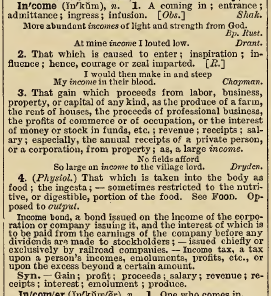
Income
3. The gain which proceeds from labor, business, property, or capital of any kind, as the produce of a farm, the rent of houses, the proceeds of a professional business, the profits of commerce or of occupation, or the interest of money or stocks in funds, etc.; revenue; receipts; salary; especially, the annual receipts of a private person or a corporation, from property; as a large income.
(K. Notes: Notice: The gain which proceeds from labor... the profits of commerce or of occupation... the interest of money... Notice the inclusion of salary; but not yet, the inclusion of wages. Salary is paid to upper management. Wages to the unskilled laborer.)

Income
3. That gain which proceeds from labor, business, or property; revenue; receipts; wages or salary.
3 b. —Syn. Profit, proceeds, interest, emolument, produce.
Income Tax
A tax on a person's income, emoluments, profits, etc., or on the excess over a certain amount.
(K. Notes: Notice under Income: The gain which proceeds from labor...
Notice the inclusion of "wages or salary".
Critical!: Notice the two-part definition for income tax. Part 1: gains and profits. Part 2: excess over a certain amount. Though Part 1 also qualifies as Part 2; Part 2 does not necessarily qualify as Part 1.
IRS: Topic no. 401, Wages and salaries; states: "All wages, salaries and tips you received for performing services as an employee of an employer must be included in your gross income."
Consider that Congress, with the application of the income tax code, includes wages as income. Such declaration by Congress interferes with private contracts regarding the true value of labor as the compensation for labor. A compensation, as shown above in the definitions, is not a gain to the employee; by definition, it is not income.)

Income
2. The money or other gain periodically received by an individual, corporation, etc., for labor or services, or from property, investments, operations, etc.: abbreviated inc.
Income Tax
A tax on income or on that part of income which exceeds a certain amount.

Income
Money received, especially on a regular basis, for work or through investments.
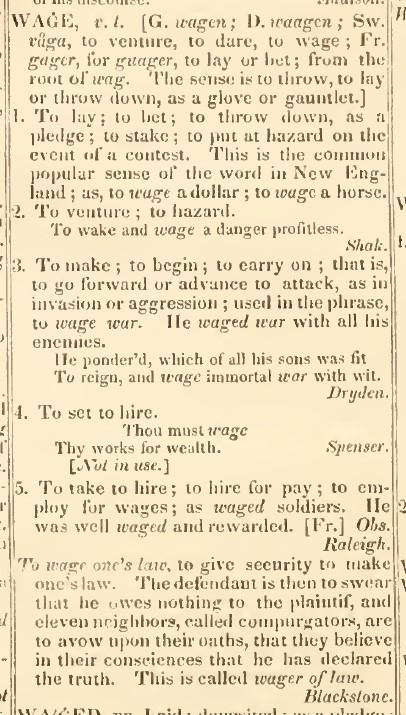
Wage
5. To take to hire; to hire for pay; to employ for wages; as waged soldiers.
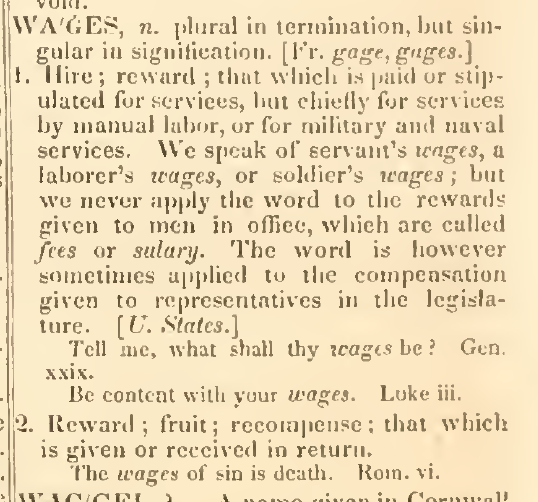
Wages
1. Hire; reward; that for which is paid or stipulated for services, but chiefly for services by manual labor, or for military and naval services. We speak of a servant's wages, a laborer's wages, or a soldier's wages; but we never apply the word to the rewards given to men in office, which are called fee or salary. The word is however sometimes applied to the compensation given to representatives in the legislature.
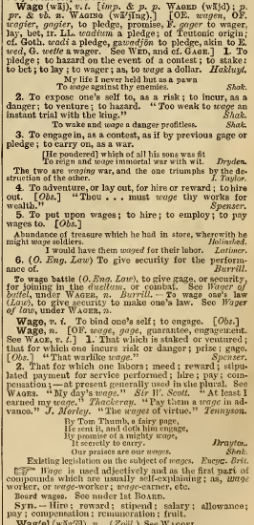
Wage
2. That for which one labors; mead; reward; stipulated payment; —at present, used in the plural. See Wages.
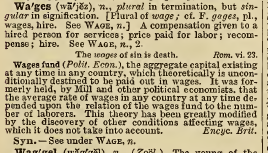
Wages
A compensation given to a hired person for services; price paid for labor; recompense; hire. See Wage, n. #2

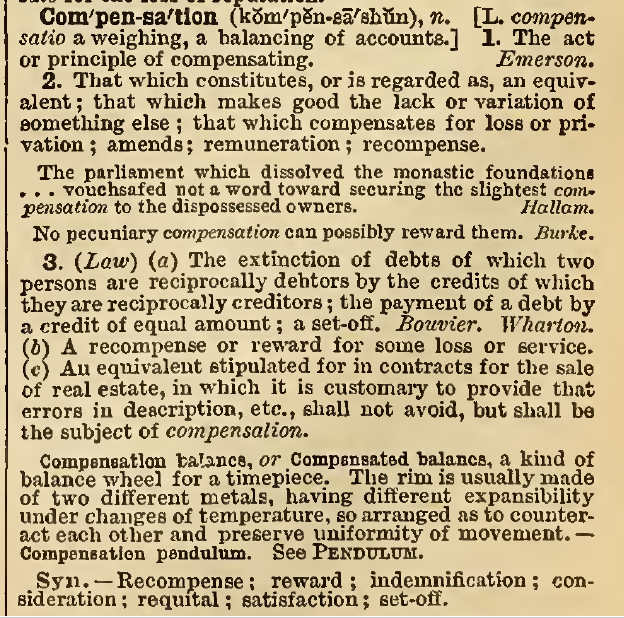
Compensate
To make amends; to supply an equivalent; —followed by for; as, nothing can compensate for the loss of reputation.
Compensation
2. That which constitutes, or is regarded as, an equivalent; that which makes good the lack or variation of something else; that which compensates for loss or privation; amends; remuneration; recompense.
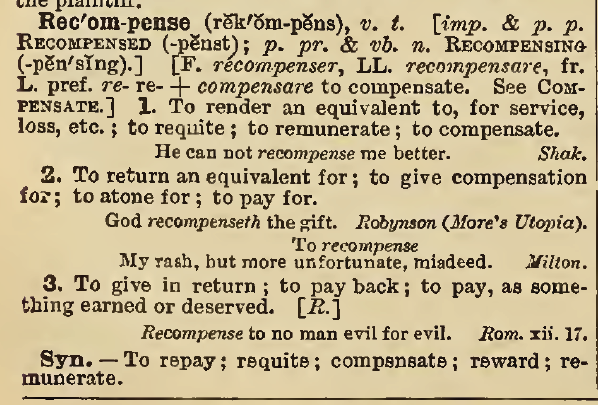
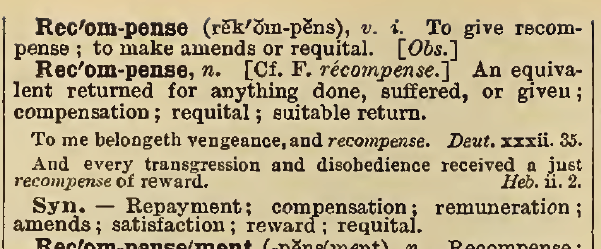
Recompense
2. v.t. To return an equivalent for; to give compensation for; to atone for; to pay for.
3. v.t. To give in return; to pay back; to pay, as something earned or deserved.
n. An equivalent returned for anything done, suffered, or given; compensation; requital; suitable return.
(K. Notes: Note: Wages, so far, is nothing more than the employer repaying a debt to the employee for the labor they provided to the employer. Rarely does the employer make an equivalent return in cash for the services performed by the employee. Employees are rarely compensated the full value of the labor they perform. As such, the employee works to a financial loss, in comparison to the value of service provided.
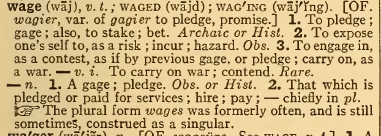
Wage
2-n. That for which is pledged or paid for services; hire; pay; chiefly in the pl..
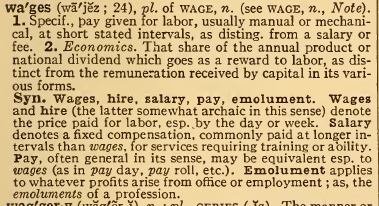
Wages
1. Specif., pay given for labor, usually manual or mechanical, at short stated intervals, as disting. from salary or fee.

Wages
A fixed regular payment, typically paid on a daily or weekly basis, made by an employer to an employee, especially to a manual unskilled worker.
(K. Notes: Up until 1898, wages has been as it states in the 1898 definition, a compensation paid for labor. It was never considered a gain to the person to whom it was paid.)
(K. Notes: Amendment 16 grants to Congress, the power to tax Incomes, from whatever source derived.
A power not granted to Congress is the power to define what is income. Congress possesses no authority to define what is income. Only to tax that which is. Therefore; Congress is not authorized the power to include —Wages; and tax it as though it were income.
With respect to labor, income is "the gain which proceeds from labor" (1898 definition). When the employer receives more value than the value the employer pays to the employee; the employer has gained from there employee's labor. The employer, then, owes income tax on that gain from their employees' labor.
With respect to labor, wages is "the compensation for labor"; (1898 definition). Wages, therefore, are not income, because they are not a gain to the employee. The Constitution of the United States of America does not grant a direct tax or any other tax on wages. Wage tax, is therefore, unjust and unconstitutional.
Power expressly prohibited to Congress when taxing income; is that Congress is prohibited from using a census and from using an enumeration.
These prohibitions open up some really interesting probabilities for funding government.
When the government uses an unconstitutional way of adjusting or redefining words used in The Constitution; This directly violates the Article 5 Amendment process. In violating The Constitution, Congress commits treason, as detailed in Article 3, Section 3.
Yes. The Constitution of the United States of America is a "living" document, in that it is supposed to be kept current with an ever-changing society. That is the purpose for Article 5. That amendment process does not include the use of more modern dictionaries to redefine constitutional content to make it appear as though congressional actions comply with constitutional restraints. If an error of omission was made in the Constitution, at the time it was ratified; simply propose another amendment to clear up the matter.)
(K. Notes: The Constitutional Word-search.
Most people are so accustomed to doing a census, every 10 years, that they never question its constitutional validity. After all, the word census does appear in The Constitution twice; (Article 1, Section 9, Clause 4; and Amendment 16); so it must be "constitutional".... Right?
The general reasoning? The government has been doing a census for so long; it must be authorized, ... Right?
(K. Notes: With a word search in The Constitution of the United States of America, and for dramatic effect and better comprehension, the starting point for the census word search is from the end of The Constitution, working toward the front. Hint: The two above listed locations are the only places we find the word census in The Constitution.
The very last mention of the word census appears in Amendment 16.
Now, we must deal with two words, census and enumeration. Here, both of them are expressly prohibited.
Continuing the search for 'census' towards the beginning of The Constitution, it next appears at: Article 1, Section 9, Clause 4, which states:)
"No Capitation, or other direct, Tax shall be laid, unless in Proportion to the Census or enumeration herein before directed to be taken."
(K. Notes: The two words, census and enumeration also appear together, but neither are granted here either. However, this mention provides a clue as to whether or not a census and enumeration are the same thing, as apples and apples are the same type of fruit. Or: Are they as different as apples and pumpkins, but similar in that they both are fruits? See
Guinness World Records: Largest Fruit
The clue from Article 1, Section 9, Clause 4 resides in these words, "herein before directed to be taken".
Somewhere prior to Article 1, Section 9, either the census or the enumeration; was authorized.
Continuing the search towards the beginning of The Constitution, the word census no longer shows up. However, the word enumeration appears twice in Article 1, Section 2, Paragraph 3, which states:)
"Representatives and direct Taxes shall be apportioned among the several States which may be included within this Union, according to their respective Numbers, which shall be determined by adding to the whole Number of free Persons, including those bound to Service for a Term of Years, and excluding Indians not taxed, three fifths of all other Persons. The actual Enumeration shall be made within three Years after the first Meeting of the Congress of the United States, and within every subsequent Term of ten Years. . . , in such Manner as they shall by Law direct; and until such enumeration shall be made. . ." (the italicized portion above is said to have been altered by a later amendment).
(K. Notes: No place in The Constitution does it grant to Congress the power to conduct a census, —only an enumeration. Its also expressly defines the scope and purpose for that enumeration. Its purpose is for determining how many Representatives each State may have in The House of Representatives of Congress. The scope of the enumeration, which is the power granted to Congress, is to count the numbers of the people in each state, according to the terms dictated; and that is all.)
(K. Notes: How the Census Survived. The best practice to define words in older public documents is to use a dictionary published prior to the document signing. Since the word census does not appear in the 1785 dictionary, for the 1790 Constitution of the United States of America; older, not newer, definitions must be used. The reason for older dictionaries, as opposed to newer ones becomes obvious.
For this instance; it is necessary to run a series of definitions, in a timeline from "Censor", in 1708 through 1898 to "Census". This exercise demonstrates word evolution in action; and how those changing definitions can negatively impact the citizen's life.)

Censor
a Magistrate, whose Office it was to take an exact view of the People of Rome, to value the Estate of every Citizen, and to reform manners.

Censor
1. An officer of Rome, who had the power of correcting manners.
2. One who is given to censure.
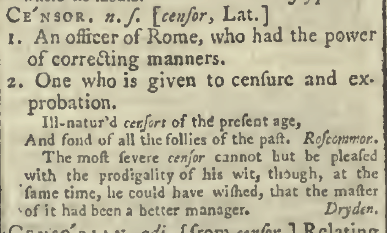
Censor
1. An officer of Rome, who had the power of correcting manners.
2. One who is given to censure and exprobation.
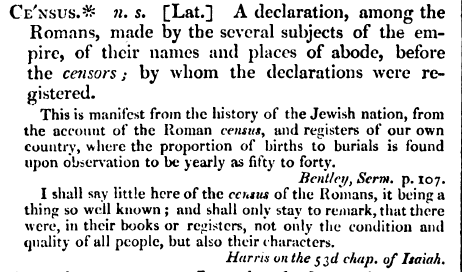
Census
A declaration, among the Romans, made by the several subjects of the empire, of their names and places of abode, before the censors; by whom the declaration were registered.
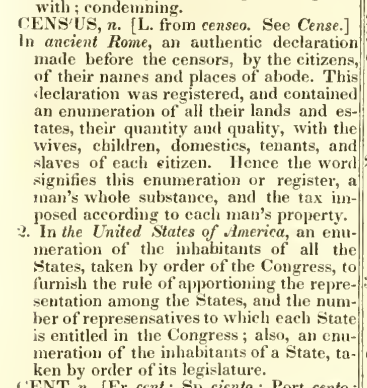
Census
1. In ancient Rome, an authentic declaration made before the censors, by the citizens, of their names and places of abode. This declaration was registered, and contained an enumeration of all their lands and estates, their quantity and quality, with the wives, children, domestics, tenants, and slaves of each citizen. Hence the word signifies this enumeration or register, a man's whole substance, and the tax imposed according to each man's property.
2. In the United States of America, an enumeration of the inhabitants of all the States, taken by order of the Congress, to furnish the rule of apportioning the representation among the States, and the number of representatives to which each State is entitled in the Congress; also, an enumeration of the inhabitants of a State, taken by order of its legislature.
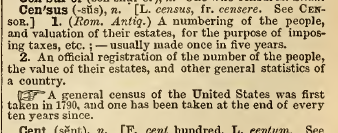
Census
1. A numbering of the people, and the valuation of their estates, for the purpose of imposing taxes, etc.; --usually made once in five years.
2. An official registration of the number of the people, the value of their estates, and other general statistics of a country.
☞ A general census of the United States was first taken in 1790, and one has been taken at the end of every ten years since.
(K. Notes: The above six definitions from 1708 through 1898 demonstrate the evolution of word definitions. Without knowing the context of the evolution; the evolution easily escapes detection.
In 1708 it accurately describes the modern census: "an exact view of the People of Rome, to value the Estate of every Citizen".
The 1756 and 1785 dictionaries drop the content of the view of the people and value of their estate to simply become "manners police".
In 1818, Johnson's 'census' definition matches The Constitution's description for 'enumeration'.
In 1828, Webster combines 'enumeration' as part of the 'census' definition. Then, he changes the constitutional description for 'enumeration' to include the value of estates. At this point; Webster makes the enumeration and the census synonymous; thus destroying the limited scope and constitutional definition and purpose for the enumeration.
Finally, in 1898, Webster made the complete transition from 'enumeration' to 'census'.
From here; this is where many people unnecessarily confuse the issue and go off-course. The thought is that Noah Webster, as an influential character the during The Declaration and Constitution; he is the best person from whom to get Constitutional definitions. So, people use the 1828 and the 1898 dictionaries, with definitions as seen above to declare that the census and the enumeration are the same thing (apples and apples).
Both, the 1828 and the 1898 definitions are from thirty to one-hundred years after The Constitution was ratified, in 1790. This is a form of amending The Constitution's content and meaning, without following the Article 5 amendment process.
It took just over 100 years from The Constitution's ratification; to Webster's 1898 definition for the enumeration to become, census.
(K. Notes: Reasons to challenge —The Experts.
All experts, must be challenged to verify their claims; especially when the government writes "authoritative" instruments used to interpret the meanings of the law intended to regulate the government's power.
A critical question hinges on whether the grant to do an enumeration authorizes Congress to alter the types of information collected, or just the manner by which the stated information may be collected; or perhaps both.
For this, we go back to the 1785 dictionary set to define the word manner; and also form, as form is used as part of the definition for manner.)
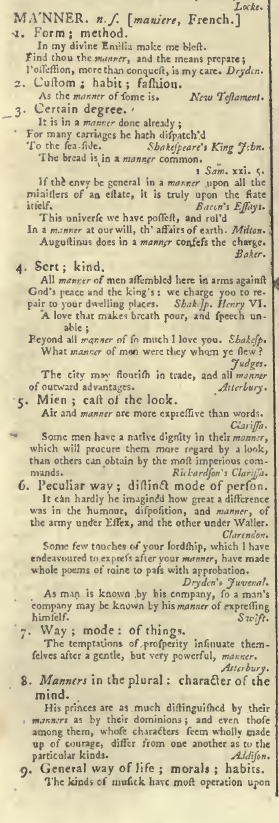
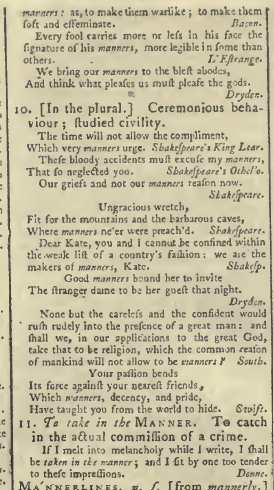
Manner
1. Form; method.
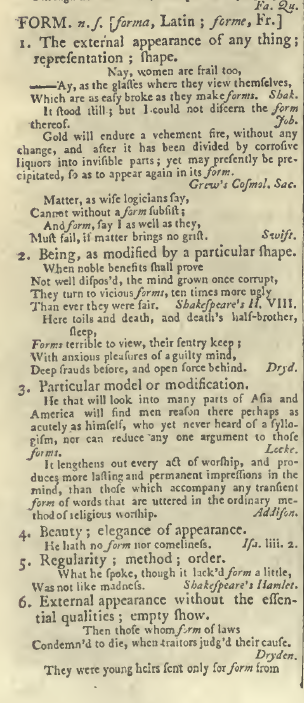

Form
1. The external appearance of any thing; representation; shape.
5. Regularity; method; order.
8. Stated method; established practice; ritual and prescribed mode.
(K. Notes: Neither manner nor form suggest the power to change or increase the volume of information to be gathered; not even changing the purpose for gathering that information.
Congress may, by rights of granted power, only dictate the process (the manner) by which the limited information is to be collected. Does Congress want to just mail the forms to every known residence? Does Congress want to have a physical person knock on every residential door and count heads? Does Congress want to have every citizen, head of household fill out an internet form? All of these are manners by which Congress can rightly collect the limited data covering how many people reside in each respective state. —At most, the information of the enumeration might be; the names, addresses, congressional district, and state, as well as the date collected: That is all!–
Repeat:
The Census is Not Constitutional
This demonstrates how newer definitions can completely alter the content, after-the-fact; after a contract is signed, after a constitution is ratified, or after a law has passed. Dictionaries can alter the way people view their world and government powers. Dictionary definitions are not supposed to change the meaning of words used, after they are used. The definitions are supposed to help a person, after, the fact, better comprehend the original purpose and intent of specific words and phrases used.
The Annual Census & The Decennial Census
The initial heading states that the Census is Unconstitutional. The word-search simply proved this fact. The Constitution's use of 'enumeration', with its description and established purpose, sets it apart from that of a 'census'.
A portion of the confusion must be attributed to Article 1, Section 9, Clause 4, when it states: "No Capitation, or other direct, Tax shall be laid, unless in Proportion to the Census or enumeration herein before directed to be taken." It does authorize either a census, or an enumeration; but not both: for direct taxation purposes.
The Decennial Census, every ten years, people recognize. What about the annual census?
Knowing how to identify a census, makes finding where Congress conducts its annual census, much easier. That census is found in the Income Tax filing. The information requested in the tax forms; is by all definition, a census.
What most people fail to realize is that with the IRS forms every year; Congress is conducting an annual census! They collect population statistics; estate valuations; employment history; change of address; births and deaths, (dependents) & ages; etc. —The Literal Census.
The IRS Tax Forms violate Amendment 4 and the individual's privacy, when it requires them to include information the government is not constitutionally authorized to collect. Under threat of arrest, this compels the person to bear witness against themselves, which violates Amendment 5, requiring people to report as income, that which, by correct definition is not income.
This shows, too, how newer definitions change the intent for powers granted to government.)
Passed by Congress May 13, 1912. Ratified April 8, 1913.
Note: Article I, section 3, of the Constitution was modified by the 17th amendment.
The Senate of the United States shall be composed of two Senators from each State, elected by the people thereof, for six years; and each Senator shall have one vote. The electors in each State shall have the qualifications requisite for electors of the most numerous branch of the State legislatures.
When vacancies happen in the representation of any State in the Senate, the executive authority of such State shall issue writs of election to fill such vacancies: Provided, That the legislature of any State may empower the executive thereof to make temporary appointments until the people fill the vacancies by election as the legislature may direct.
This amendment shall not be so construed as to affect the election or term of any Senator chosen before it becomes valid as part of the Constitution.
(K. Notes: There are pros and cons with respect to whether some government officers are appointed by other government officer or elected by the people directly.
If the government officers doing the appointing are constitutionally sound, there is no problem. If the citizens are constitutionally sound, as well as literate in The Declaration, there is no problem. However, when either one or both are civically illiterate when it comes to The Declaration and The Constitution, government deteriorates quickly into a tyranny and despotism.
Passed by Congress December 18, 1917. Ratified January 16, 1919. Repealed by amendment 21.
Section 1.
After one year from the ratification of this article the manufacture, sale, or transportation of intoxicating liquors within, the importation thereof into, or the exportation thereof from the United States and all territory subject to the jurisdiction thereof for beverage purposes is hereby prohibited.
Section 2.
The Congress and the several States shall have concurrent power to enforce this article by appropriate legislation.
Section 3.
This article shall be inoperative unless it shall have been ratified as an amendment to the Constitution by the legislatures of the several States, as provided in the Constitution, within seven years from the date of the submission hereof to the States by the Congress.
(K. Notes: Section 1 violates AMendment 9 of The Constitution in several ways.
It incorrectly assumes Congress possesses the power to regulate what beverages anyone may drink.
It incorrectly assumes that Congress possesses the power to regulate what a person manufactures for their own use; also violating Article 1 Section 8 on promoting the useful arts and sciences.
It incorrectly assumes that Congress possesses the power to regulate what what personal property a person may transport from one state to another; also violating Article 1 Section 8 and the commerce clause; as personal property is not commerce.
Passed by Congress June 4, 1919. Ratified August 18, 1920.
The right of citizens of the United States to vote shall not be denied or abridged by the United States or by any State on account of sex.
Congress shall have power to enforce this article by appropriate legislation.
(K. Notes: This amendment about voting rights; including the previous one and people of color, and the later one with respect to age 18; invites an excellent Civics Question: Have women always possessed the right to vote in the united States of America?
Society has been conditioned by way of the educational industrial complex that the respective Amendments actually grant the right to vote for each class of citizen.
The amendments simply acknowledge that each class already possesses the right to vote, with, "The right of citizens of the United States to vote shall not be denied or abridged..."
Then, as it concludes that clause, it prohibits the States from violating that class of citizen, when it states, "shall not be denied or abridged by the United States or by any State on account of sex."
Passed by Congress March 2, 1932. Ratified January 23, 1933.
Note: Article I, section 4, of the Constitution was modified by section 2 of this amendment. In addition, a portion of the 12th amendment was superseded by section 3.
Section 1.
The terms of the President and the Vice President shall end at noon on the 20th day of January, and the terms of Senators and Representatives at noon on the 3d day of January, of the years in which such terms would have ended if this article had not been ratified; and the terms of their successors shall then begin.
Section 2.
The Congress shall assemble at least once in every year, and such meeting shall begin at noon on the 3d day of January, unless they shall by law appoint a different day.
Section 3.
If, at the time fixed for the beginning of the term of the President, the President elect shall have died, the Vice President elect shall become President. If a President shall not have been chosen before the time fixed for the beginning of his term, or if the President elect shall have failed to qualify, then the Vice President elect shall act as President until a President shall have qualified; and the Congress may by law provide for the case wherein neither a President elect nor a Vice President elect shall have qualified, declaring who shall then act as President, or the manner in which one who is to act shall be selected, and such person shall act accordingly until a President or Vice President shall have qualified.
Section 4.
The Congress may by law provide for the case of the death of any of the persons from whom the House of Representatives may choose a President whenever the right of choice shall have devolved upon them, and for the case of the death of any of the persons from whom the Senate may choose a Vice President whenever the right of choice shall have devolved upon them.
Section 5.
Sections 1 and 2 shall take effect on the 15th day of October following the ratification of this article.
Section 6.
This article shall be inoperative unless it shall have been ratified as an amendment to the Constitution by the legislatures of three-fourths of the several States within seven years from the date of its submission.
(K. Notes: This, about the qualifications, is most curious: "[...] if the President elect shall have failed to qualify, then the Vice President elect shall act as President until a President shall have qualified; and the Congress may by law provide for the case wherein neither a President elect nor a Vice President elect shall have qualified, declaring who shall then act as President".
Curious, in that once a person registers as a candidate for the office of President, The Federal Election Commission (FEC), which tracks Presidential Candidate campaign spending; should also be responsible for checking the constitutional requirements for that office (birth certificate, with respect to natural-born citizenship, by way of both parent's citizenship; age, to verify that by the swearing in, the candidate will be old enough, constitutionally. Then the FEC will verify residence records, which should be able to be done with tax filings, driver ID, and other similar documentation.
With Amendment 14, Section 3 having gained spotlight attention in recent years; the FEC will send a complete list of presidential candidates to every Secretary of State to verify if they know of any instances guilty verdicts concerning each and every candidate registered with the FEC; as far as insurrection, rebellion, or treason against the Constitution.
Suspicion of such acts is not enough to disqualify any candidate from ballot access; as all three charges qualify as criminal accusations. As criminal accusations, Amendment 6 demands a speedy public trial by an impartial jury, among other requirements.
Violating rights, especially without a jury trial, is an act of tyranny and despotism; as well as an act of treason.
Passed by Congress February 20, 1933. Ratified December 5, 1933.
Section 1.
The eighteenth article of amendment to the Constitution of the United States is hereby repealed.
Section 2.
The transportation or importation into any State, Territory, or possession of the United States for delivery or use therein of intoxicating liquors, in violation of the laws thereof, is hereby prohibited.
Section 3.
This article shall be inoperative unless it shall have been ratified as an amendment to the Constitution by conventions in the several States, as provided in the Constitution, within seven years from the date of the submission hereof to the States by the Congress.
(K. Notes: The rights to make, use, and or sell are protected under Amendment 9; as detailed in Amendment 18. However, Congress, in accord with Article 1, may regulate the commerce among the states; between the united States of America and foreign countries; as well as between the united States of America and the Indian nations. —But Not within any state, or foreign nation, and not within the Indian nations.
Passed by Congress March 21, 1947. Ratified February 27, 1951.
Section 1.
No person shall be elected to the office of the President more than twice, and no person who has held the office of President, or acted as President, for more than two years of a term to which some other person was elected President shall be elected to the office of the President more than once. But this Article shall not apply to any person holding the office of President when this Article was proposed by the Congress, and shall not prevent any person who may be holding the office of President, or acting as President, during the term within which this Article becomes operative from holding the office of President or acting as President during the remainder of such term.
Section 2.
This article shall be inoperative unless it shall have been ratified as an amendment to the Constitution by the legislatures of three-fourths of the several States within seven years from the date of its submission to the States by the Congress.
(K. Notes: When Congress was writing this Amendment, they forgot to restrict the Legislative and Judicial terms.
This is where the States should have re-instated the term limits as detailed in The Articles of Confederation. In summary, there were no back-to-back terms. This prevented (for the most part) having politicians devote their entire time in office, running for re-election.
Passed by Congress June 16, 1960. Ratified March 29, 1961.
Section 1.
The District constituting the seat of Government of the United States shall appoint in such manner as the Congress may direct:
A number of electors of President and Vice President equal to the whole number of Senators and Representatives in Congress to which the District would be entitled if it were a State, but in no event more than the least populous State; they shall be in addition to those appointed by the States, but they shall be considered, for the purposes of the election of President and Vice President, to be electors appointed by a State; and they shall meet in the District and perform such duties as provided by the twelfth article of amendment.
Section 2.
The Congress shall have power to enforce this article by appropriate legislation.
(K. Notes: As mentioned in the main body of Articles, where it describes the seat of government, and by definitions; the seat of government is where those constitutionally authorized government offices are situated. The remainder, where residents and businesses are situated in that same district; those residents and businesses remain subject to the state wherein they are located. In this manner, they retain all their rights in this aspect of possessing voting representation in government (city, county, state, and congressional voting members).
Passed by Congress August 27, 1962. Ratified January 23, 1964.
Section 1.
The right of citizens of the United States to vote in any primary or other election for President or Vice President, for electors for President or Vice President, or for Senator or Representative in Congress, shall not be denied or abridged by the United States or any State by reason of failure to pay any poll tax or other tax.
Section 2.
The Congress shall have power to enforce this article by appropriate legislation.
POLL [n. s.]
1. The head.
2. A catalogue or list of persons; a register of heads.
3. A fifth called generally a chub.
To POLL [v. a.]
5. To plunder; to strip; to pill.
6. To take a list or register of persons.
7. To enter one's name in a list or register.
8. To insert into a number as a voter.
(K. Notes: A poll tax is an individual tax; in this instance a tax when registering as a voter.
This amendment prohibits government from stopping any registered voter from voting; if they have failed or refused to pay any from of taxation.
Seems government officers would tire of trying to find new and different ways to violate the people's right to vote. In many states, if you do not make yourself available for jury duty after so many callings; they remove your name from the registry of voters. Also, if you are a citizen taxpayer younger than eighteen years of age, many states prohibit them from voting, even though fully eligible.
Passed by Congress July 6, 1965. Ratified February 10, 1967.
Note: Article II, section 1, of the Constitution was affected by the 25th amendment.
Section 1.
In case of the removal of the President from office or of his death or resignation, the Vice President shall become President.
Section 2.
Whenever there is a vacancy in the office of the Vice President, the President shall nominate a Vice President who shall take office upon confirmation by a majority vote of both Houses of Congress.
Section 3.
Whenever the President transmits to the President pro tempore of the Senate and the Speaker of the House of Representatives his written declaration that he is unable to discharge the powers and duties of his office, and until he transmits to them a written declaration to the contrary, such powers and duties shall be discharged by the Vice President as Acting President.
Section 4.
Whenever the Vice President and a majority of either the principal officers of the executive departments or of such other body as Congress may by law provide, transmit to the President pro tempore of the Senate and the Speaker of the House of Representatives their written declaration that the President is unable to discharge the powers and duties of his office, the Vice President shall immediately assume the powers and duties of the office as Acting President.
Thereafter, when the President transmits to the President pro tempore of the Senate and the Speaker of the House of Representatives his written declaration that no inability exists, he shall resume the powers and duties of his office unless the Vice President and a majority of either the principal officers of the executive department or of such other body as Congress may by law provide, transmit within four days to the President pro tempore of the Senate and the Speaker of the House of Representatives their written declaration that the President is unable to discharge the powers and duties of his office. Thereupon Congress shall decide the issue, assembling within forty-eight hours for that purpose if not in session. If the Congress, within twenty-one days after receipt of the latter written declaration, or, if Congress is not in session, within twenty-one days after Congress is required to assemble, determines by two-thirds vote of both Houses that the President is unable to discharge the powers and duties of his office, the Vice President shall continue to discharge the same as Acting President; otherwise, the President shall resume the powers and duties of his office.
(K. Notes: With the recent political games played in government; this amendment can become a dangerous tool of politicians to overthrow the Constitutional Form of Government, by eventually seating their own leader in office and declare some form of Martial Law.
Passed by Congress March 23, 1971. Ratified July 1, 1971.
Note: Amendment 14, section 2, of the Constitution was modified by section 1 of the 26th amendment.
Section 1.
The right of citizens of the United States, who are eighteen years of age or older, to vote shall not be denied or abridged by the United States or by any State on account of age.
Section 2.
The Congress shall have power to enforce this article by appropriate legislation.
(K. Notes: As earlier stated in the other two voting amendments for people of color and for women; this amendment here, also does not grant any voting rights. It stops the government from continuing to violate this class of citizen's right to vote.
Government still violates younger citizen-taxpayers their right to vote, which is protected by Amendment 9. But how can Amendment 9 protect something that has not been exercised in this society? This goes all the way back to The Declaration, which identifies every citizen, as the governed as being eligible to vote, to consent. The Declaration also includes citizen taxpayers by way of the grievance, clause, about taxing without the consent of the governed.
When the laws affect the lives of any citizen, that class of citizens automatically become eligible to exercise their right. Government laws that require young children to attend school, touches their lives under threat of punishment. Many of these laws did not exist at the nation's founding, thus the children were not governed by government but by their parents, and not eligible to vote.
Originally proposed Sept. 25, 1789. Ratified May 7, 1992.
No law, varying the compensation for the services of the Senators and Representatives, shall take effect, until an election of Representatives shall have intervened.
(K. Notes: When we remember that governments are nothing more, nothing other than a form of corporation; Amendment 27 has authorized those government officers to grant to themselves their own wages and benefits packages. A death sentence for any corporation, especially when the corporate officers refuse to abide by The Corporate By-Laws; The Constitution in this instance.
The clause "shall take effect, until an election of Representatives shall have intervened" has become irrelevant, considering the fact that by the time this amendment was passed, many Congress Members have been sworn in several consecutive terms.
End The Constitution of the United States of America Content
We, the governed people, are intended to work together to properly control government's powers to equally protect each other's rights; in accord with our nation's pledge from 1776.
If you like your government —just the way it is, do nothing.
Otherwise, share any content within. Get others talking about —Getting & Keeping Clean Honest Government.
End Page Content
To move all ads to bottom of screen, shrink the window width
Help make it happen!
Help spread the word!